



























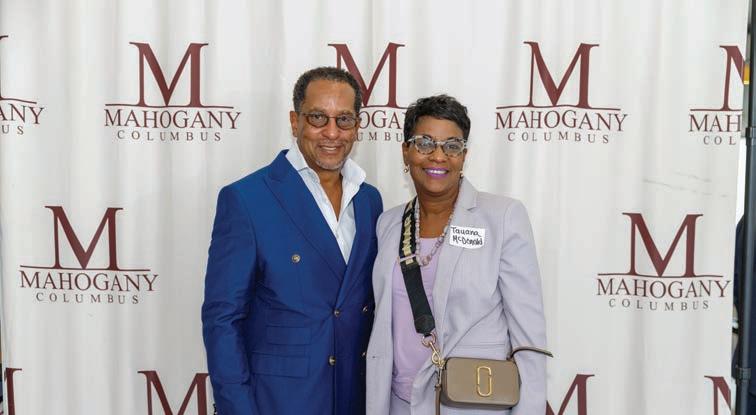
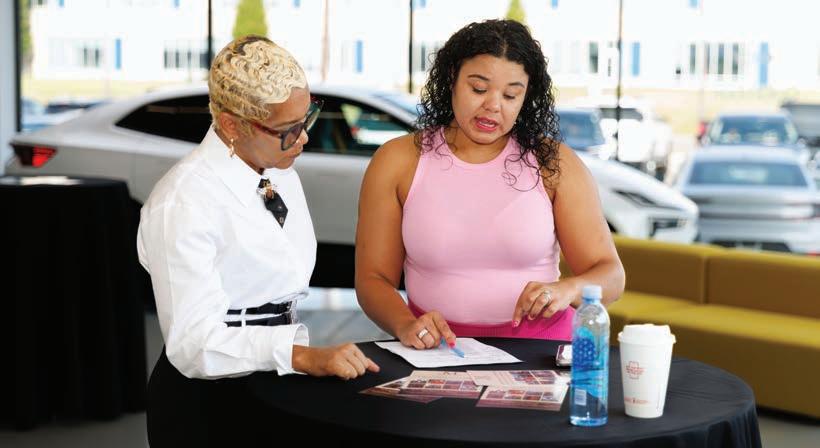
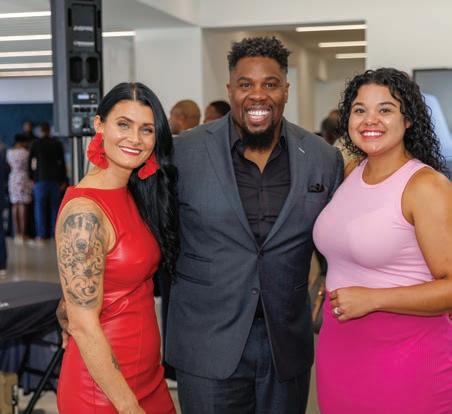
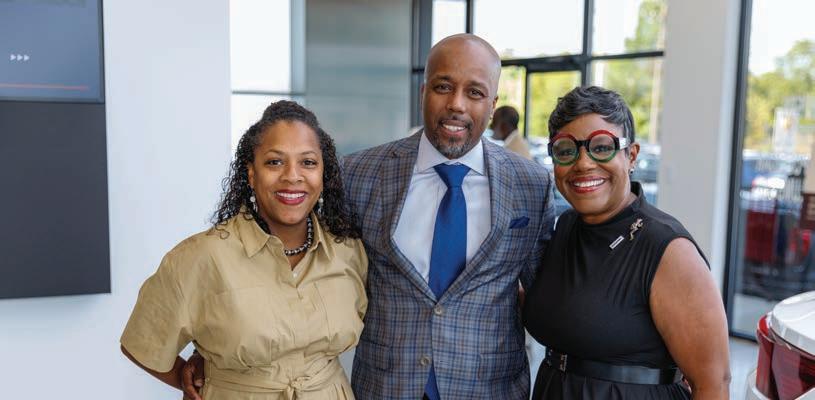

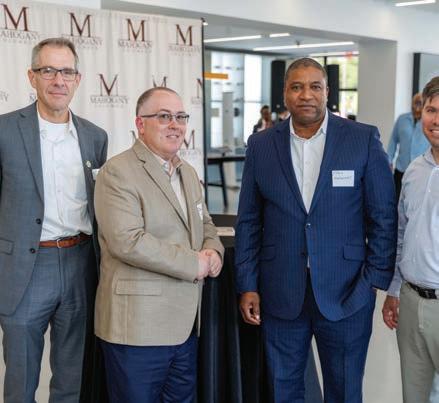

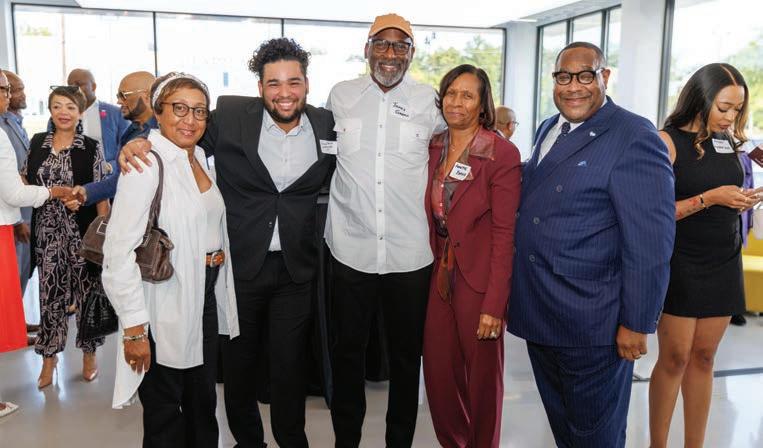

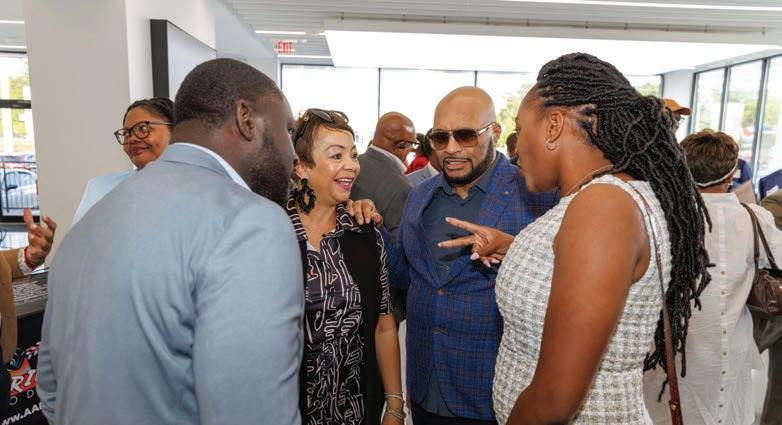
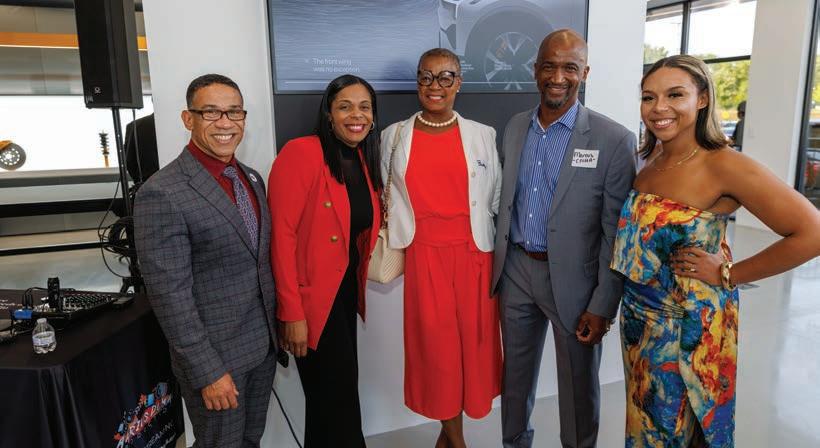
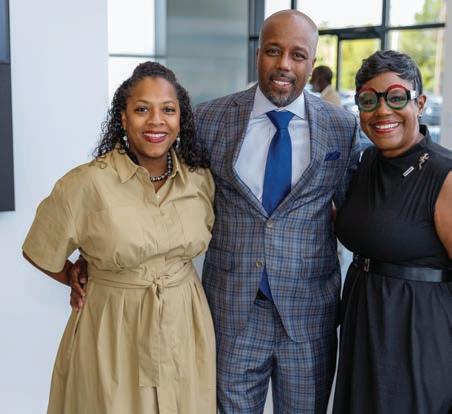
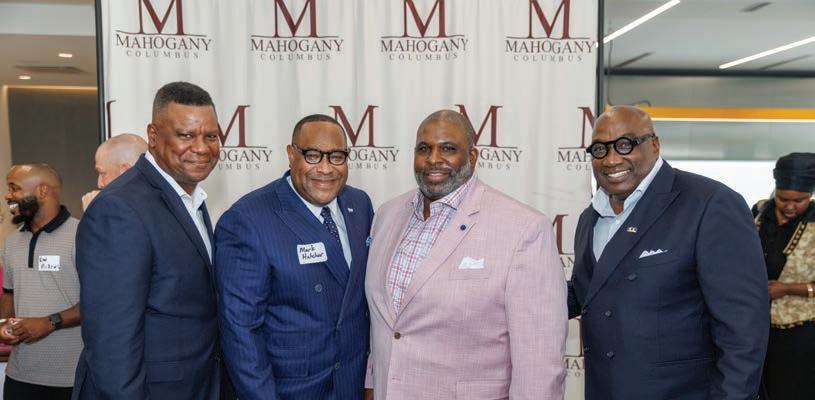
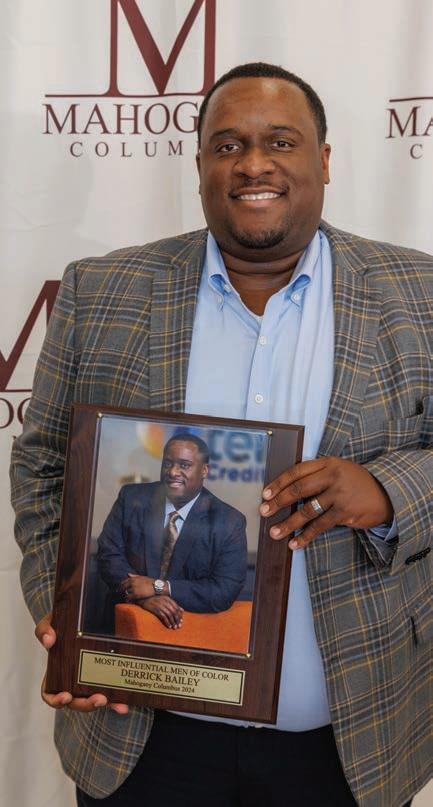


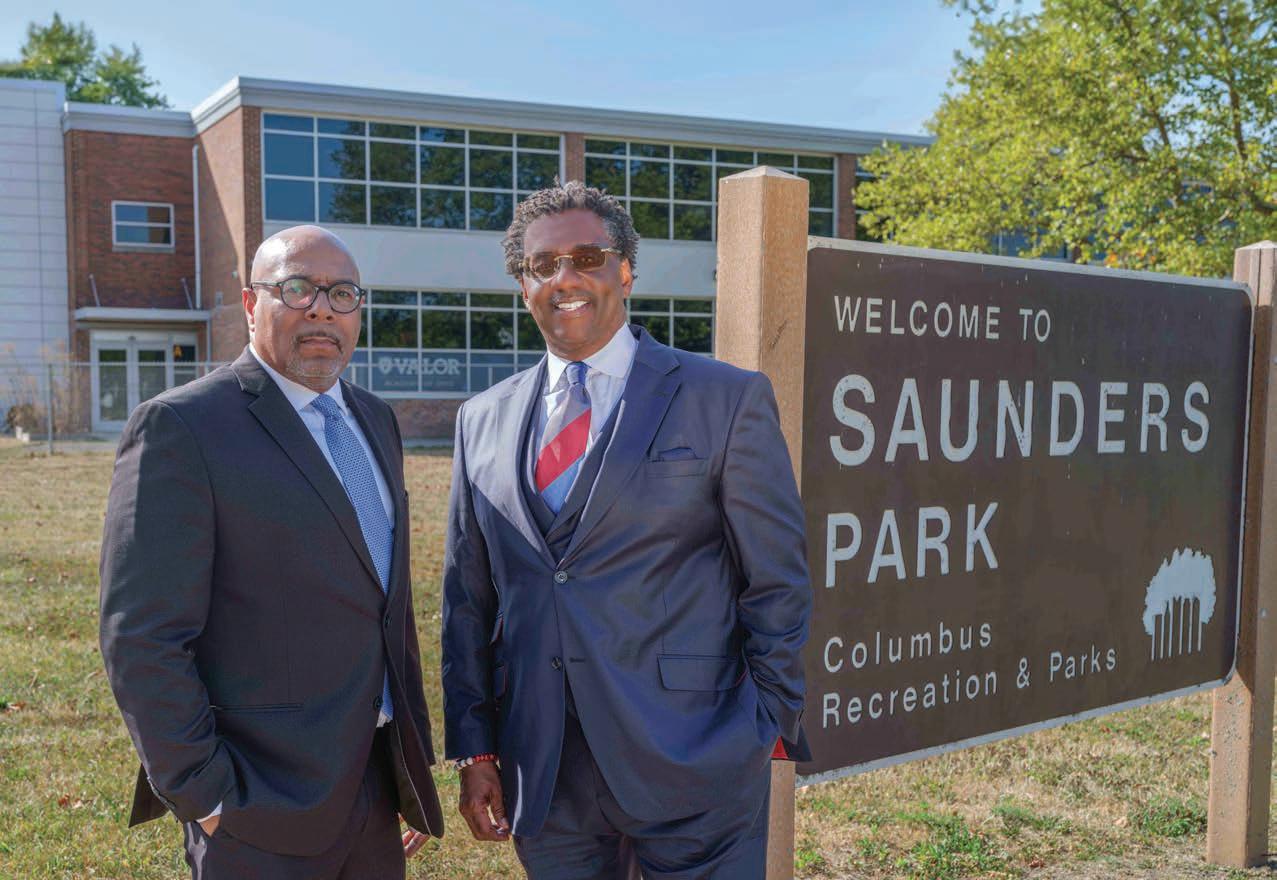
Lifelong friends and community leaders, pastor Jeffrey Dennis and Edward Dudley Sr., united by their Maryland Park roots and a shared mission to uplift and serve. pg 38
The Legacy of Friendship and Service
Denise M. Robinson Chief Executive Officer Alvis, Inc. 38.
The Ohio State University’s Extraordinary Educators
Central Ohio’s Extraordinary Nonprofit Executives
Stephanie Hightower Chief Executive Officer The Columbus Urban League
Ohio’s Teacher of the Year
Celebrating These Outstanding Educators


By W. Kay Wilson
Columbus is blossoming, reported by the Bank of America’s Institute study, to be one of the fastest growing in the U.S., bursting with the dreams and aspirations of its residents. Yet, as we celebrate this growth, we are leaning on people and organizations that are experiencing their own vulnerabilities. There’s an expectation that nonprofits should deliver extraordinary results while operating on shoestring budgets, which undermines the incredible efforts of dedicated individuals—educators and nonprofit leaders— who tirelessly work for change.
Behind every critical social issue lies a story of commitment and resilience. The dedication of educators significantly impacts student achievement; a good teacher can elevate test scores, boost graduation rates, and set students on a path to greater earnings. Yet, both educators and nonprofit leaders are struggling. Five years after COVID emptied classrooms and nearly crippled nonprofits, it’s clear that normal itself has fundamentally changed. Misconceptions about overhead costs further complicate matters, as these are often viewed as mere expenses rather than essential investments in human capital. We need to shift this narrative. Community stakeholders should prioritize questions about impact over overhead. A well-compensated, skilled workforce is not a burden; it is the engine driving meaningful, sustainable change. Notably, surveys show that Black teachers in particular report higher morale and a stronger sense of purpose, positively influencing outcomes for all students.
This issue of Mahogany Columbus focuses on Nonprofit leaders and Phenomenal Educators who are doing hard work today for a better tomorrow. Collaboration between educators and nonprofit leaders is essential in addressing Columbus’ challenges. Together, they can harness their strengths to tackle complex social issues. Educators provide invaluable insights into community needs, while nonprofits have the infrastructure to implement effective solutions. By identifying shared goals—like improving literacy, addressing mental health, or promoting environmental stewardship—these groups can develop programs that resonate with the community.
When educators and nonprofits unite their voices, they can advocate for policy changes that amplify their impact. Their collective power can drive significant improvements in community welfare.
As we navigate these intricate social landscapes, visionary corporate partnerships become crucial. Businesses must embrace bold investments in the social sector, understanding that success is measured not just by immediate results but by long-term impact.













Marketing, Printing & Graphic Design

Vist www.jprintshop.com
By Cynthia W. Turner, Ph.D., CPA Associate Dean of Access, Engagement and Outreach
EY Faculty Fellow, Accounting & MIS
The Ohio State University Fisher College of Business
In higher education, many institutions are preparing for what is known as the “demographic cliff” or “enrollment cliff,” a projected decline in the number of traditional college-age students in the United States. The Western Interstate Commission for Higher Education (WICHE) predicts that the peak of around 3.9 million high school graduates will occur in the next two years. Following this, the college-age population is expected to decrease by as much as 15% over the next five to ten years due to declining birth rates that began during the 2007-2008 recession. This shrinking cohort is also expected to be more diverse, with a larger proportion of firstgeneration students. Additionally, other challenges loom for higher education, such as the long-term effects of remote learning during the pandemic, waning public confidence in the value of a college degree, and increased competition from alternative educational pathways.
While this situation is undoubtedly concerning for colleges and universities nationwide, it also presents an opportunity for institutions to rethink how they engage with employers, nonprofits, and communities through innovative collaborations. These partnerships can give institutions a competitive edge in attracting and retaining students while also emphasizing the value of a college degree in an ever-evolving workforce.
For example, university-industry partnerships have become increasingly significant in recent years. In some cases, industry representatives serve on advisory boards, offering real-time insights into the technological skills students need for their future careers and ensuring that curricula stay aligned with industry advancements. Many universities have also focused on upskilling employees of their industry partners, addressing workforce skill gaps by creating tailored programs that equip workers with advanced knowledge and skills to thrive in their roles.

Similarly, university-nonprofit partnerships are beginning to flourish, fueled by Gen Z and Gen Alpha’s strong commitment to inclusion, diversity, and community. A notable example is service-learning, an experiential learning approach where students engage in service projects that address real, community-identified needs while gaining course-related knowledge.
University-K-12 partnerships, such as dual enrollment programs, early college experiences, professional development for teachers, and collaborative research projects are also gaining momentum. These partnerships are especially important for supporting and ensuring access for underrepresented, low-income, and firstgeneration students, who were disproportionately affected by the challenges of remote learning during the pandemic.
Yes, higher education is at a crossroads, but this also provides the great opportunity to build a collaborative ecosystem between higher education, industry, and communities—one where all stakeholders benefit and, most importantly, our students succeed.

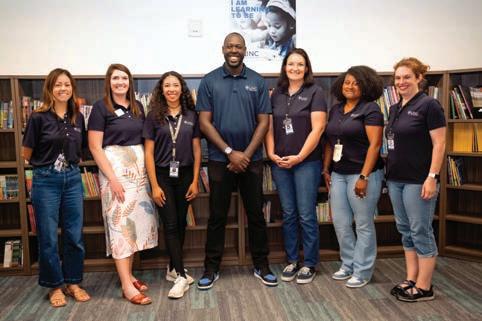




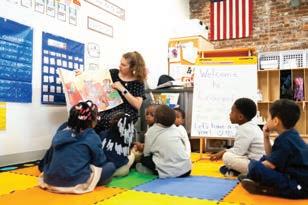
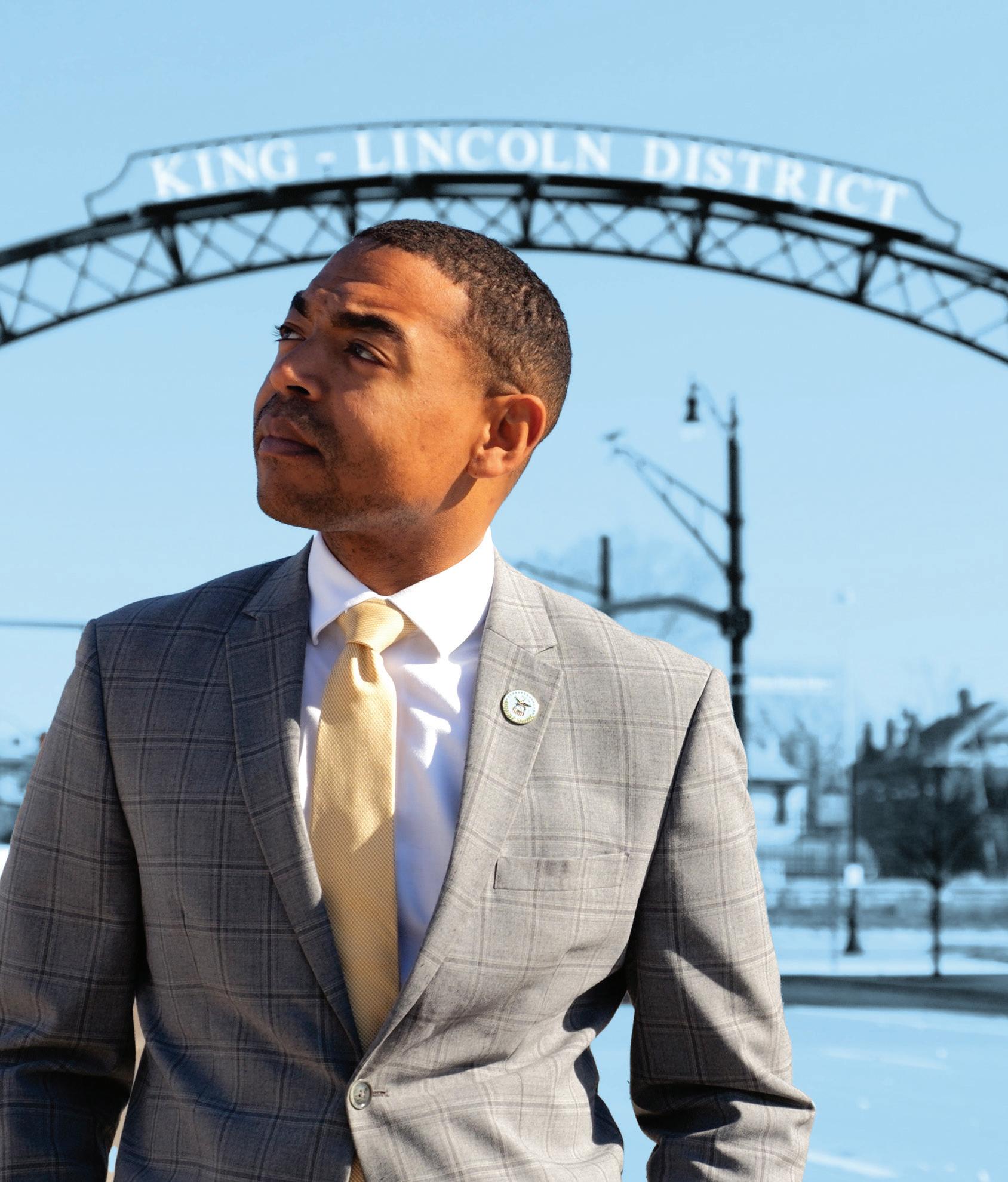




By: Zari Carmona-Tongor

Latino Heritage Month is a vibrant, month-long celebration honoring Hispanic and Latino history and culture. This annual observance runs from September 15 to October 15 and features a variety of activities and events across the city. Since Cuban American Councilwoman Lourdes Barroso de Padilla took office, the Celebration has expanded its reach, invigorating every corner of Columbus. Over the past three years, the festivities have grown increasingly spectacular and inclusive.
This year, the Celebration kicked off with a dazzling Illumination Ceremony at Columbus City Hall, where the building was adorned with vibrant colors symbolizing Latino culture. This was complemented by a Padrino Reception, honoring individuals in the Latino community who have dedicated their efforts to uplifting Central Ohio’s Latino population. The four esteemed padrinos for this year’s festivities are notable business owners and entrepreneurs: Zari CarmonaTongor, owner and CEO of JPS Print and Executive Director of Dominicans in Columbus; Fernando Alcauter, owner of Toro Meat Market; Guadalupe Velasquez,
Managing Director of Welcoming City and President of Vibrant Ohio; and Gustavo Salazar, Founder and Owner of La Plaza Tapatilla.
Throughout the month, the Celebration features a dynamic Parade and Festival in downtown Columbus, a vibrant display of the rich cultural tapestry of the Latino community. These events, along with forums for small businesses and workers that focus on city certifications and workers’ rights, an art show, and an awards ceremony, serve as a testament to the achievements and contributions of the Latino community.
Central Ohio is home to approximately 9,800 immigrant entrepreneurs, representing 12% of the region’s business owners. These enterprises collectively generate nearly $290 billion in annual income. Furthermore, in 2019, immigrants in the Columbus metro area contributed over $712.4 million in state and local taxes.
Looking ahead, projections indicate that Columbus’s immigrant population could increase by 1 million by 2050, according to the recent Immigrant Makes Columbus study. It is crucial to prepare now to accommodate and support this
growth. Celebrating our diversity and fostering inclusion is not just a choice but a responsibility. Cities that actively support their immigrant communities tend to experience higher rates of business creation, innovation, and workforce participation, reinforcing the need for our collective support.

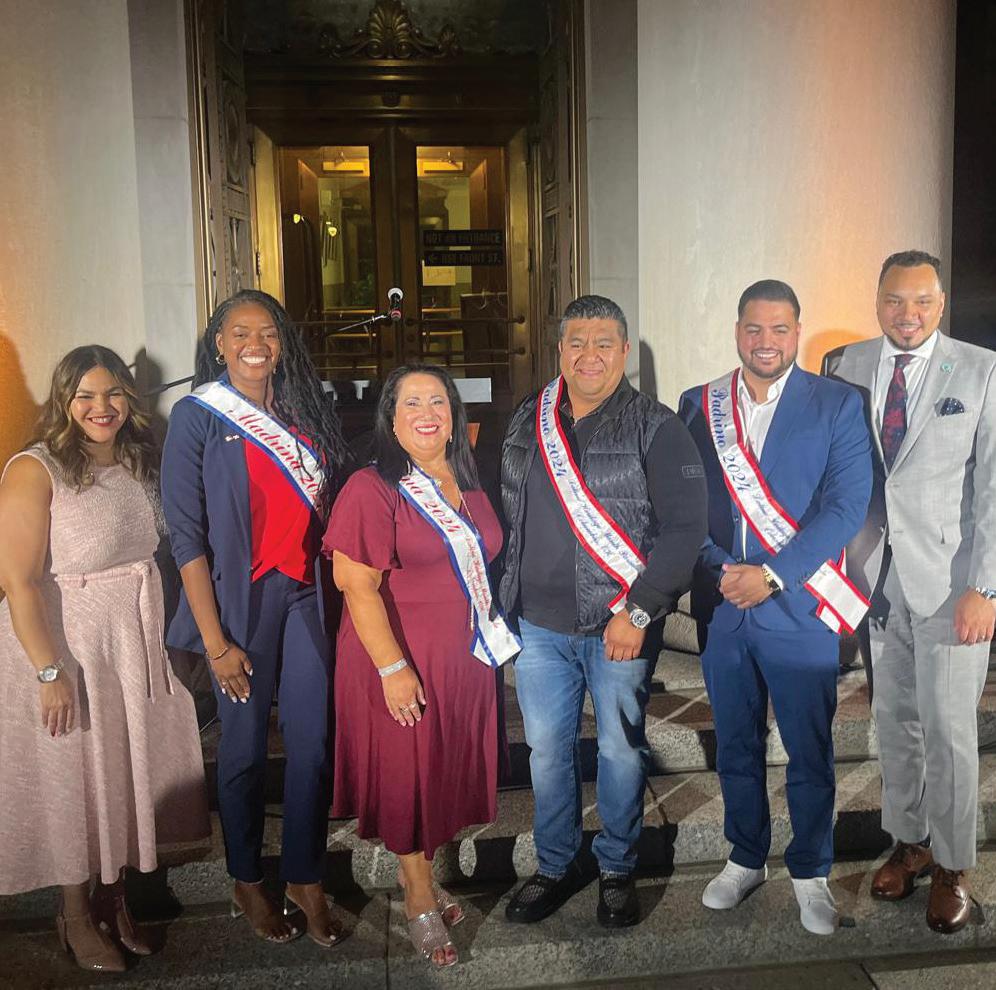

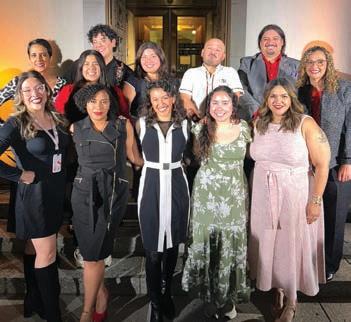


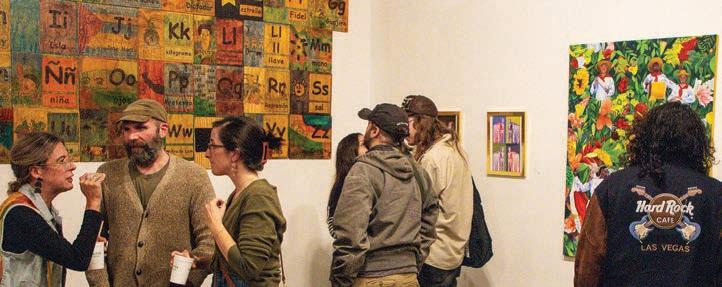
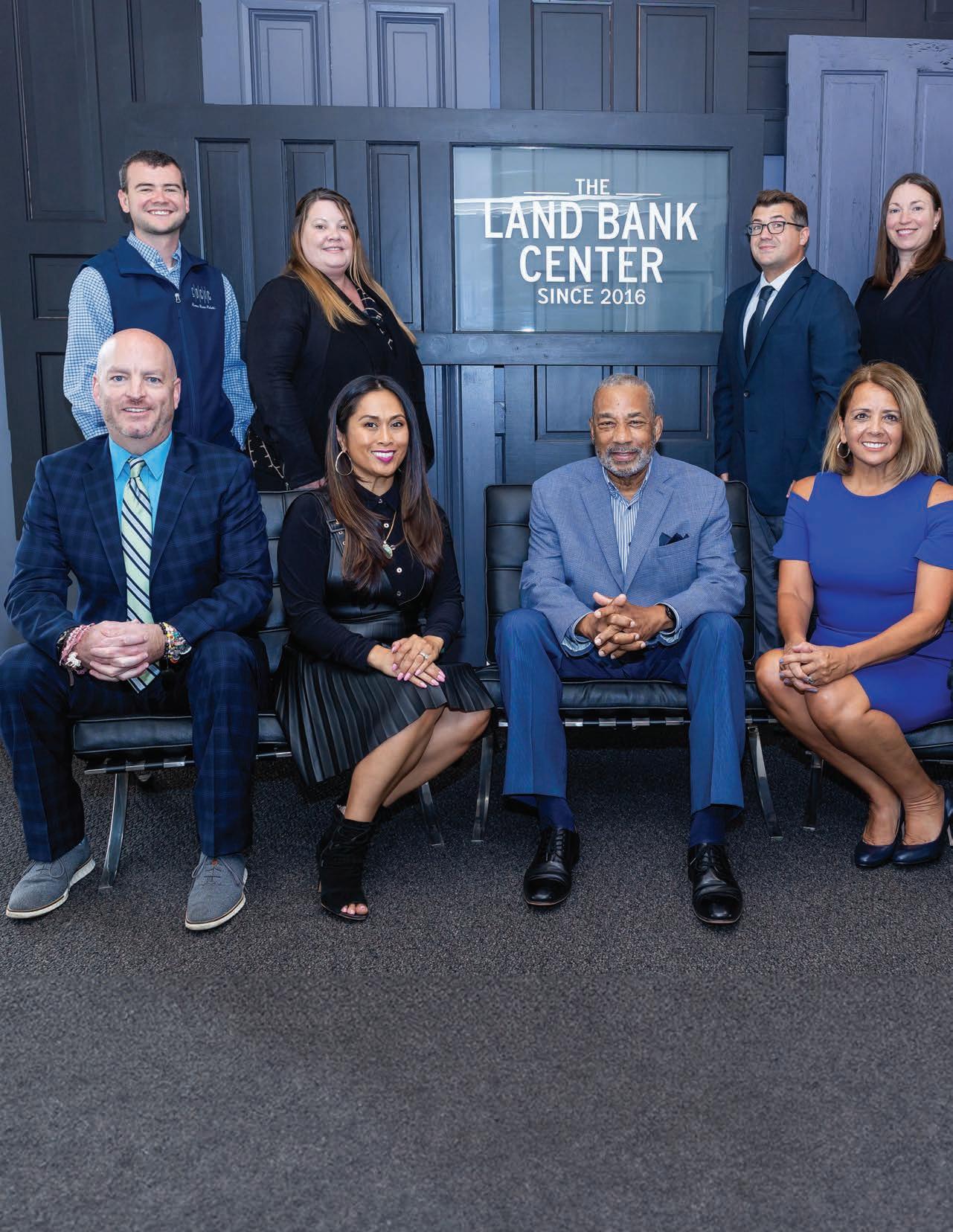

The Central Ohio Community Improvement Corporation, better known as COCIC, was formed in 2012 to address the rising rate of vacant and abandoned properties in Franklin County. Over time, the organization’s mission has evolved from a concentrated effort on blight removal to strategic land acquisition, property redevelopment and targeted capital investments.
As a leader in community redevelopment, COCIC has become a catalyst for transforming unproductive property into new homes, businesses, greenspaces and gathering places. Their efforts can be seen throughout the county.
In the organization’s first 10 years as a county land bank, 65% of Franklin County’s townships and municipalities have directly benefited from COCIC’s support. Further, 45% of these interventions occurred in formerly redlined areas, providing much-needed countermeasures that allow residents to experience safer neighborhoods, improved housing quality, and rising property values.
Countywide, COCIC’s work has preserved or increased property values by at least $320 million; and, for every $1 COCIC has spent on demolition, nearby home values increase by $4.30.
In addition to the impact COCIC is having in Franklin County, the organization and its subsidiary, the Central Ohio Community Land Trust, have gained national attention. Notably, the foresight of the County Commissioners to set up the Land Trust as a subsidiary has allowed for a more seamless transfer of assets and fewer hurdles to development.
Since its inception, the Land Trust has built more than 125 homes in Franklin County, with a goal of reaching commitments for 500 homes by 2026. At a time when nearly every community seems to be facing an affordable housing shortage, these homes are a lifeline to those living at or below the local average median income.
In addition to local blight removal and development opportunities, COCIC also manages millions of dollars in grant funding designed to improve communities in Franklin County. Recently, COCIC submitted projects on behalf of Franklin County for the Ohio Governor’s Brownfield Remediation Grant and the Ohio Building Demolition and Site Revitalization Program.
COCIC helped secure nearly $50 million for Franklin County to demolish vacant, blighted or unsafe properties. These projects touched a number of communities in Central Ohio and will create new opportunities for local development.
In 2025, COCIC plans to move into its new headquarters in the newly redeveloped Edna building in the King-Lincoln Bronzeville district. The Edna was added to the National Register of Historic Places in 2017 and is best known for its significance to the social and cultural influence of African Americans in Columbus.
Looking forward, COCIC will continue to be nimble, evolving to the needs of the communities it serves while remaining steadfast in its commitment to transforming neighborhoods in Franklin County.
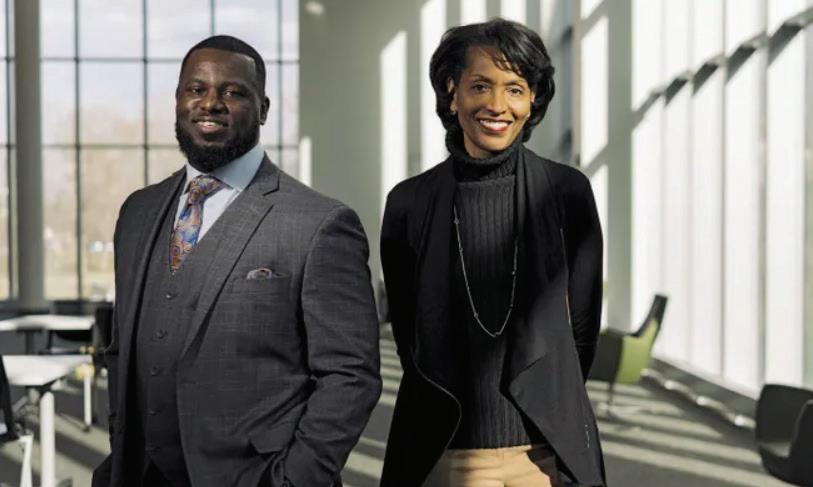
In a world where leadership often remains elusive for many people of color, the African American Leadership Academy (AALA) serves as a beacon of hope and empowerment for African American professionals in Central Ohio. Established in 2005 by influential local leaders—including Larry and Donna James, Yvette McGee Brown, and Donn Vickers—AALA was created to cultivate a new generation of African American leaders who excel in their careers while making meaningful contributions to their communities.
At its core, AALA seeks to redefine success by expanding its definition beyond personal achievements to include community engagement and public service. Each year, the Academy selects 20 Fellows (expanded to 40 in 2022)— highly motivated individuals eager to embrace growth and development. Management expert Warren Bennis states, “Before you can become a leader, you first have to become yourself.”
This philosophy underpins AALA’s mission, emphasizing that personal development is crucial for effective leadership.
AALA primarily serves three groups: highprofile African American leaders often called upon for commissions and boards, talented yet often overlooked professionals aged 30 to 45, and the broader community, which thrives when its leadership reflects its diversity.
The Academy’s structured program is a comprehensive ten-month journey focused on personal and professional development. Through a strength-based curriculum that emphasizes self-efficacy and leadership agility, participants engage in transformative experiences. This curriculum equips Fellows with critical leadership skills while encouraging them to explore their identities, values, and aspirations.
Each cohort benefits from mentorship provided by esteemed faculty—African American leaders
who share their personal stories and insights alongside research-based best practices. This mentorship bridges the gap between theory and practice, fostering a supportive environment where Fellows learn from one another and enhance collaboration and community.
The impact of AALA is profound and far-reaching. With nearly 400 alumni, the Academy has created a network of empowered leaders making significant contributions across various sectors, including business, education, government, and non-profits. Notable community leaders such as Bo Chilton (IMPACT Community Action), Columbus Councilmembers Shayla Favor and Nick Bankston, Elon Simms (Chief of Staff to Mayor Ginther), and Erica Clark Jones (CEO of the ADAMH Board of Franklin County) have all benefited from their development through AALA. These leaders excel in their professions and actively engage in initiatives addressing pressing community issues, thereby enhancing the quality of life in Central Ohio.
As AALA approaches its 20th anniversary in 2025, the need for its work is more urgent than ever. For African American professionals seeking leadership development, the Academy presents a unique opportunity to invest in personal growth and community enhancement. AALA is fortunate to carry out its mission with support from caring organizations in Central Ohio, including Nationwide, Cardinal Health, AEP, Crane Group, and the United Way of Central Ohio. A full list of sponsors is available at www. aalacademy.org.

By Alisha Martin
I’m thrilled to be celebrating ten years in education. This journey has been an incredible blessing, filling me with a deep sense of fulfillment as I’ve had the privilege of being part of a vibrant learning community alongside my brilliant, talented, and inquisitive students. There is so much joy in this profession, and countless times I’ve found myself learning just as much from my students as they do from me. Their curiosity, enthusiasm, and resilience have been a true testament to grit and perseverance—qualities I’ve drawn on during the times I’ve needed them most.
That said, this has also been one of the most challenging periods for educators in recent history. There’s no denying the many positives that come with this field, but the hard truth is that education doesn’t always receive the support it deserves. We all know how crucial our schools are to society, and being a student is a universal experience. Nearly everyone has a story about a favorite teacher or a memorable classroom moment. Yet, despite widespread agreement that teachers deserve more respect, appreciation, and better pay, meaningful change still feels out of reach.
Now more than ever, we need to invest in our educators—these beacons of hope for the future. The teaching profession isn’t as sought after as it once was, leading to a nationwide teacher shortage, a crisis that underpins many of the challenges our schools face. Quality educators are so much more than just teachers. They’re mentors, coaches, conflict mediators, content experts, and frontline defenders in the fight for the future of America’s youth.
In this issue, I want to honor all the educators who work tirelessly for the betterment of their students. They understand that they aren’t just teaching content, they’re raising a generation. Educators are the consistent presence in their students’ lives, guiding them for forty plus hours a week. They are the bridge to the possibilities of what their students can and will become.
Our schools are a reflection of what, and who, we value as a nation. If we fail to invest in education, it’s our children who pay the price. We all understand the


power of great teachers, because each of us can point to moments where they shaped our lives. At the same time, we know the damaging effects of underfunded schools and unqualified educators. That’s not the future our children deserve.
If every educator embodied the excellence we celebrate in this issue and if society made a concerted effort to advocate for our education system, the achievement gaps that plague our communities would no longer exist. I’ve witnessed black students surpass the state average outperforming their peers despite the challenges they face. It’s in their DNA to excel. We are inventors, physicians, mathematicians, scientists, athletes, cultural pioneers, and we built the most powerful nation in the world. Our children deserve an education that reflects who they are and who they’re destined to become.
“Now more than ever, we need to invest in our educators— these beacons of hope for the future.”

“Capital University has been a proud member of the Central Ohio community since 1850. Our students, alumni, and employees are committed to enriching Columbus by making a difference wherever they go. I invite you to visit our campus. Attend a concert. Cheer on your favorite team. Explore our art gallery. Talk with our professors and students. Experience firsthand how Capital University’s commitment to higher education transforms lives and the world.”
David L. Kaufman President, Capital University




In an inspiring collaboration earlier this year, Pursuit, a modern suit store based in the Short North of Columbus, Ohio, partnered with Maryhaven, ranked as Central Ohio’s number 1 non-profit addiction recovery and mental health provider, to offer a unique and empowering experience for the men in Maryhaven’s long-term residency program. This partnership went beyond fashion—it was about dignity, confidence, and transformation.
Maryhaven offers several programs to support individuals and families the overcome substance use disorder and mental health challenges. The program, known as “The Residence”, offers an opportunity for male clients to stay at Maryhaven for an additional 4-6 months in a structured safe environment as they navigate re-entry into the lives they have worked so hard to build. For many of these men receiving a tailored suit was a first-time experience. The symbolism of the suit—a garment often associated with new beginnings, professionalism, and self-respect— was profound. These men, who have faced
immense personal and societal challenges, were given the opportunity to experience something that many don’t give a second thought to: the fitting of a custom-tailored suit.
The experience began with the men visiting Pursuit, where they were greeted by Pursuit’s friendly and knowledgeable staff. Each person received personalized attention, getting measured and fitted for a suit that would reflect not only their specific build but also their individuality. Pursuit’s atmosphere, known for its modern yet approachable vibe, made the process both fun and celebratory.
For some, it was the first time they had ever worn a suit, let alone one tailored to their exact measurements. The opportunity to have a custom-fitted suit became symbolic of the transformations they were undergoing in their personal lives through their recovery journey at Maryhaven. Pursuit’s dedication to making this a memorable experience, coupled with their commitment to inclusivity, ensured that each man

walked away feeling valued.
After the fittings, Pursuit went straight to work putting evaluating and constructing the suits. It wasn’t long before Pursuit reached out to the Team at Maryhaven, letting them know the suits were ready. It would have been a simple task to pick up the suits and have them delivered to the men waiting at The Residence. However, the team at Maryhaven had a different idea. Pursuit rolled put the red carpet and brought all the suits to the men at Maryhaven. Each man got to try on the completed suit they were fitted for just weeks earlier and they had the opportunity to step into a new version of themselves. The joy and pride on their faces were undeniable. The suits didn’t just fit their bodies—they elevated their spirits. For the men of Maryhaven, this gesture represented a steppingstone toward recovery, an acknowledgment of their hard work in recovery, and a reminder that they are deserving of respect and dignity.
This partnership exemplified the kind of community building that both Pursuit and Maryhaven champion. By blending fashion with compassion, Pursuit showed how local businesses can play a vital role in supporting individuals in recovery. For Maryhaven, the partnership highlighted the organization’s holistic approach to recovery, one that understands the importance of self-esteem and personal attention as key factors in long-term success.
The collaboration between Pursuit and Maryhaven serves as a reminder that recovery is about more than overcoming addiction—it’s about rebuilding a sense of self. With their new looks, the men left Pursuit with more than just clothing; they left with renewed confidence, a sense of belonging, and the belief that they are

capable of new beginnings.
As the men from Maryhaven continue their journey of recovery, they do so with confidence and style, knowing they have the support of both Maryhaven and the broader Columbus community.
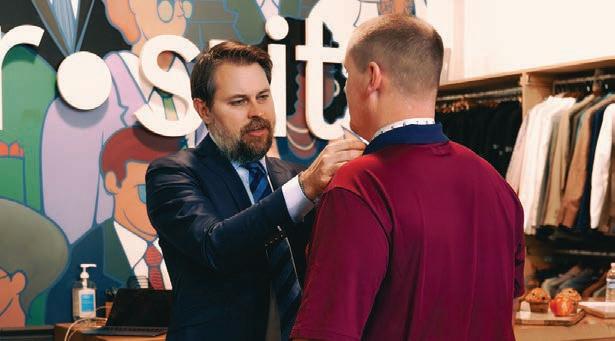
$45,000 IN SCHOLARSHIPS FOR BLACK BUCKEYES
40 YEARS IN EXISTENCE
NETWORKING
MENTORSHIP
SCHOLARSHIP
COMMUNITY FOR US.

Since its founding in 1982, The Ohio State University (OSU) Black Alumni Society has been a vibrant, powerful force of dedicated Buckeye alumni committed to strengthening networks, supporting student development, and advocating for Black alumni, faculty, staff, and friends of Ohio State.
We celebrate the legacy of Black excellence at Ohio State while fostering life-long connections among our members. Through scholarships, mentorship, and networking opportunities, we pave the way for Black Buckeyes to achieve their full potential.



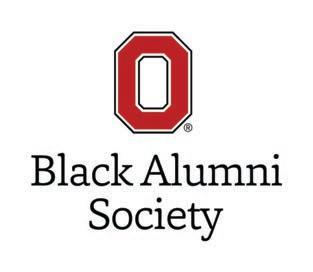

By Aba Azeem & Kierra Posey
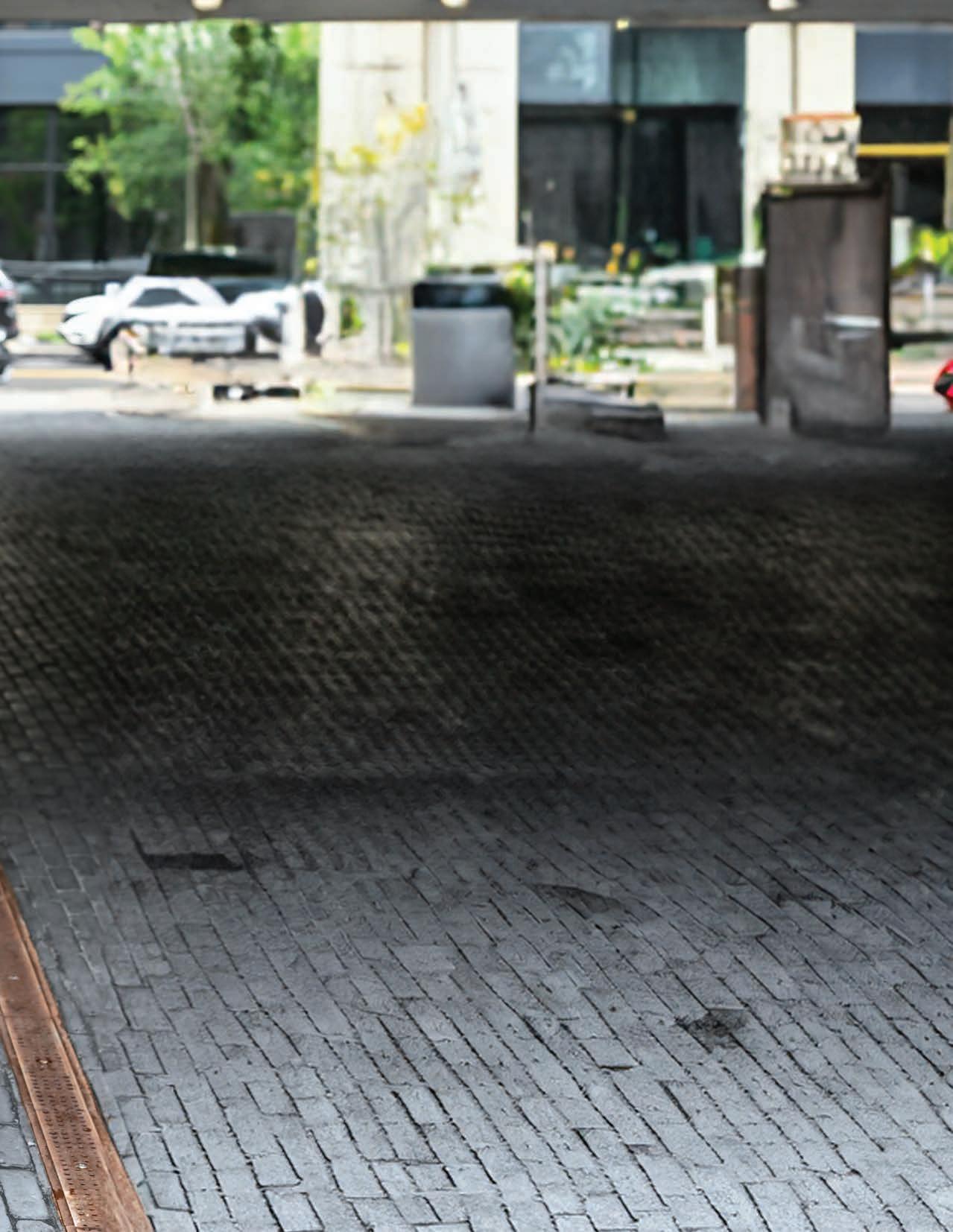
In today’s rapidly evolving landscape, artificial intelligence (AI) is not just a tool but a transformative force reshaping the education and nonprofit sectors. While the private sector has embraced AI at unprecedented rates—with 85% of global knowledge workers utilizing AI technologies— nonprofits and educational institutions more often lag. This gap presents both challenges and opportunities for leaders in these fields, making it essential to implement AI with equity in mind to ensure all communities have access to its benefits.
The Value of AI in Nonprofits and Education
AI offers significant advantages that can enhance operational efficiency and educational outcomes. For instance, AI can automate routine tasks, allowing educators and nonprofit leaders to focus on strategic initiatives. AI tools can analyze student performance data in educational settings, enabling personalized learning experiences tailored to individual needs. For nonprofits, AI can enhance program delivery and improve engagement with beneficiaries by providing insights into community needs.
However, the benefits are often untapped. A study by Google.org found that 77% of nonprofit organizations believe they would benefit from increased AI usage, yet many face significant barriers, including a lack of familiarity with the technology. Without embracing AI, organizations risk missing out on opportunities to enhance their impact.
Despite its potential, AI adoption is not without challenges. Concerns around data privacy, misinformation, and the risk of bias in AI models are prevalent. Many organizations lack formal policies governing AI usage, which can lead to ethical and operational pitfalls. Additionally, the fear of risking academic integrity in educational settings and the hesitation to adopt tools without fully understanding them can stifle innovation.
1. Foster AI Literacy: Organizations should invest in training programs to build AI literacy among staff. Understanding how to leverage AI effectively can demystify its use and empower leaders to make informed decisions.
2. Establish Clear Guidelines: Create policies that outline responsible AI usage, addressing concerns related to data privacy and ethical standards. Include guidelines on potential misuse, ensuring
AI tools enhance the learning process rather than undermine it. Emphasize the importance of human oversight to mitigate bias in AI applications, safeguarding integrity and equity.
3. Enhance Learning and Service Delivery: Redesign assessments, projects, and programs to integrate AI effectively. In educational settings, this can foster critical thinking and creativity among students, while in nonprofits, it can improve service delivery and engagement with beneficiaries. Leveraging AI allows leaders to create impactful experiences that prepare their audiences for a future where AI is integral to their lives.
4. Enhance Human Interaction: Use AI to automate routine tasks, enabling educators and nonprofit leaders to engage more deeply with their students and communities. AI should be a supplementary tool that enhances meaningful interactions, ensuring personal connections remain a priority.
5. Encourage Collaboration: Promote partnerships facilitating knowledge sharing and best practices between the private sector and nonprofits. Engaging with private companies can provide access to resources that enhance AI adoption.
The private sector has a critical role in bridging the AI gap. Private organizations can empower nonprofits and educational institutions to harness these technologies effectively by offering low-cost or free training on AI tools. Collaborating with the private sector allows nonprofits to deliver personalized support to their beneficiaries, ultimately enhancing their impact.
In a world increasingly shaped by AI, educational and nonprofit leaders need to embrace these technologies as vital components of their strategic initiatives. At Mahogany Search Partners, we actively support organizations leveraging AI to enhance their capabilities. Reach out to us to discover how we can help you harness the power of AI for your mission.
Aba Azeem & Kierra Posey
Managing Partners, Mahogany Search Partners hire@mahoganysearchpartners.com (614) 407-3550
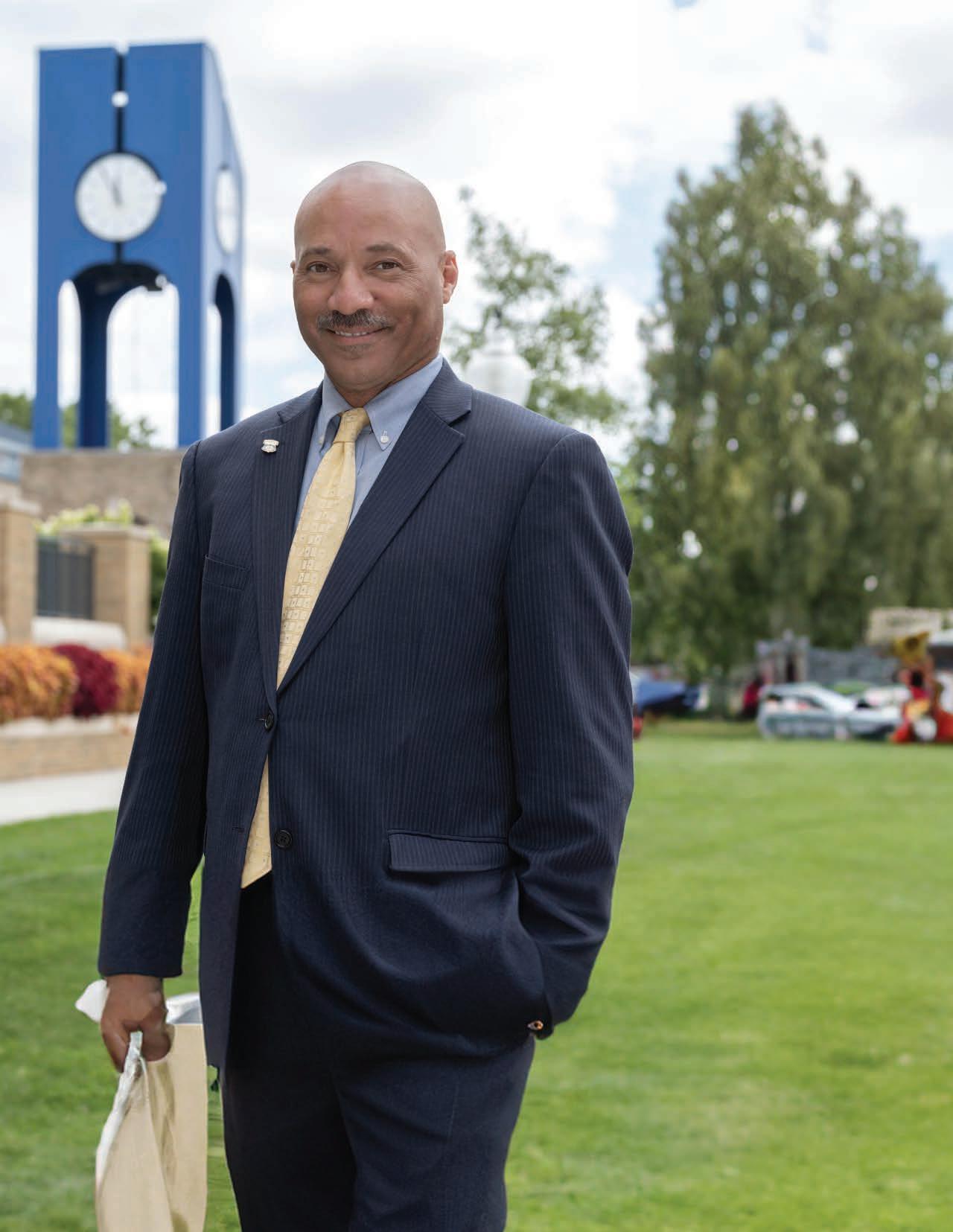
By Dr. Christopher Washington
As a University Provost for nearly 20 years with social media access, I’ve witnessed the personal and career successes of thousands of graduates over that period. So, it troubles me to see rising skepticism surrounding the value of postsecondary education. Mahogany readers likely know that this skepticism is fueled at times by rising tuition costs at some institutions, resultant student debt, and many means to learn skills today leaving you to question whether a college degree is still worth the investment. Yet, as societal roles evolve, requiring deeper knowledge and specialized skills, the many benefits of higher education have never been clearer. In an increasingly technological and globally interconnected world, I believe the need for and benefits of high quality and accessible higher education is more critical than ever.
The Bureau of Labor Statistics (BLS) conducts annual studies that show that higher levels of education lead to greater income and employment opportunities. According to its annual report, individuals with a bachelor’s degree earn, on average, significantly more than those with only a high school diploma. In 2023, the BLS reported that median weekly earnings for individuals with a bachelor’s degree were 64% higher than for those with a high school diploma. Unemployment rates also follow a similar pattern, with the jobless rate for college graduates consistently lower than for those with less education. This has led me to conclude that, on average, the more you learn the more you earn.
Higher education not only offers a path to better-paying jobs but also to more stable employment. In times of economic downturn, those with post-secondary credentials tend to fare better, as they often occupy roles requiring specialized expertise that cannot easily be replaced. As AI evolves, so does specialized expertise. Universities are places where changes in the nature of work can lead to adaptations of curriculum, with updated professional preparation serving as one of the best safeguards against unemployment and wage stagnation.
Beyond earnings and job security, a college degree opens doors to a broader range of career options. In their study, “The College Payoff” Research conducted by the Georgetown University Center on Education and Workforce indicates that individuals with higher levels of education are afforded more choices when it comes to career paths, higher paying industries, and roles that come with advanced degrees. This flexibility allows educated workers to pivot within their careers or move into entirely new fields as opportunities arise. For example, individuals with advanced degrees often have the freedom to pursue leadership roles, move
into specialized positions, or even create their own opportunities through entrepreneurship relating to their expertise. The career flexibility and advancement that come with education provide a level of job satisfaction and personal fulfillment that is often harder to achieve without formal training or a college degree.
While the financial advantages of education are welldocumented, there are also numerous psychological, economic, social, and health benefits associated with advanced learning. The Gallup-Purdue Index Report tracks the well-being and workplace engagement of college graduates. It consistently finds that individuals with higher levels of education report higher levels of well-being, life satisfaction, and emotional health, with notable differences in job satisfaction and stress levels compared to those without post-secondary education. The World Health Organization in their “closing the Gap in a Generation: Health Equity through Action on the Social Determinants of Health,” and their Health Inequities and Causes” reports points to education as a critical factor for improving mental well-being, reducing chronic stress, and increasing life satisfaction. Those with higher levels of education tend to live longer and healthier lives, work in jobs with better working conditions, and are more likely to engage in healthpromoting behaviors such as regular exercise and preventative healthcare.
The value of education extends far beyond the degree holder. These benefits are said to ripple out beyond the individual to their families and communities, creating a generational impact that can shape society for the better. An educational legacy in ones family can break cycles of poverty and improve socioeconomic mobility. Furthermore, educated parents often model lifelong learning, critical thinking, and problem-solving skills— traits that are essential for future success. Investing in education is an investment in the future, one that pays dividends not only for individuals but for generations to come.
For those of us who have already experienced the benefits of post-secondary education, our challenge is to advocate for others to have the same opportunities. In a time when the value of education is being questioned, it is crucial to remind society, family and friends of its enduring benefits. As Nelson Mandela once said, “Education is the most powerful weapon which you can use to change the world.” And as Benjamin Franklin once said, “An investment in knowledge pays the best interest.” Whether through increased earning potential, enhanced career options, improved well-being, or the positive ripple effects on future generations and society, higher education pays—and it pays off in more ways than we expect.

“My career is my job. My calling and purpose in life is to build bridges with people so they connect with the gospel of Jesus Christ,” said Oakwood Management President & CEO Keith Jones. His faith serves as the cornerstone of his life and work. For him, building bridges often begins with addressing one of society’s most pressing needs: housing. Jones’ calling is met in the ministry he and his wife, Stephanie, started in Columbus a few years ago with The Purpose Center Church. Jones’ career has been in real estate, joining Oakwood three years ago.
“I got into real estate out of the military working my way through grad school. Real estate got in my blood – watching families lease apartments and seeing families that would struggle to pay rent,” he said. Growing up in the ‘70s in Panama City, FL, Jones’ family rented one house away from a public housing complex.
“We never lived in the projects, but we were next
door,” Jones said. “Talk around our kitchen table was, ‘We won’t be here forever. We’re going to move out.’ Freshman year in high school, that happened. The environment I grew up in was near the projects.” Two months into his tenure at Oakwood, he took a call from Amy Klaben, Co-founder, President & CEO of Families Flourish. Klaben, who led affordable housing nonprofit developer Homeport for 16.5 years, was creating a new model for helping low-wage families stabilize their housing and their finances. It’s called Families Flourish.
“When Amy was telling me about Families Flourish, it resonated with me because growing up these were the conversations my family and I had. The lower part of that middle group in society – it’s very, very hard and they always get left behind. That’s the group that my family was in,” Jones said.
Families Flourish is a three-year program that works alongside families to help them set and achieve their financial, housing, career and wellness goals. The

program provides each family a life coach, requires monthly programming to broaden those conversations, and kicks in partial rent support to give low-wage families access to higherresourced neighborhoods where jobs are plentiful, and schools are betterperforming.
“When you show someone what they can do, it changes their lives,” Jones said, answering why he joined the board of Families Flourish and now serves as board secretary. In an Oakwood property in Hilliard, Cheralyn Elkins and her daughter are navigating their first fall in middle school. Hilliard is the second Oakwood property the duo has lived in, moving from a property on the ReynoldsburgGahanna line. “It’s the first time I was able to move for my own reasons,” Elkins said. “Where I chose the neighborhood based on my daughter’s and my needs Elkins is a graduate of the Families Flourish program. She applied in 2018 when the program was a pilot in partnership with OSU’s City & Regional Planning School. The Central Ohio neighborhood in which she’d grown up had become violent. She and her daughter witnessed two shootings at their corner. That’s when Cheralyn knew she needed a different solution.
“Closed mouths don’t get fed, so I just started telling everyone I know, ‘I need to get my daughter out of this environment.’ Someone pointed me to Families Flourish,” she said. Elkins was part of a 10-family cohort that collectively raised their incomes on average 58%/$17,000 and their credit scores by 100+ points. Elkins is proud of how her parenting skills improved, and all the cousins, friends and others she’s been able to teach what she learned in the program. As one of a dozen partnering landlords, Jones said he’s proud to have Oakwood play a role for families like the Elkins.
“The Families Flourish model to me just simply works,” Jones said. “It was packaged in such a way that - this is what I’ve been trying to say to people about how housing needs to be done. “The idea of affordable housing is good, we just haven’t been good at implementing it in this country,” Jones said.
To learn more about Families Flourish, visit familiesflourish.org.




Adrian Jones, the proud owner of Kennedy’s Kakes, has crafted more than just a bakery; her story of resilience as a minority business is baked in to Columbus’ fabric. Located inside The Westin Hotel downtown, Kennedy’s Kakes has become a beloved destination for those seeking exquisite wedding cakes, custom-designed special occasion cakes, and delightful daily offerings.
Founded in 2010, Kennedy’s Kakes was named after Adrian’s daughter, Kennedy, who, despite her move to California, continues to contribute virtually. The bakery is a true family affair, with Adrian’s husband, Hiram, playing a crucial role in daily operations. From whipping up gallons of buttercream to rolling “love bites”—an assortment of delectable cake truffles—Hiram’s support is integral to the bakery’s success. Together, the family has navigated a journey from a home-based operation to a commercial kitchen, and now, a year into their new downtown space, they’re celebrating their first anniversary at The Westin.
Kennedy’s Kakes offers more than just beautiful cakes; it serves as a cozy café
cakes; it serves as a cozy café

Founded in 2010, State Senator Herschel Craig greets Kennedy’s Kake’s Owner Adrian Jones who states we’re more than just a bakery.
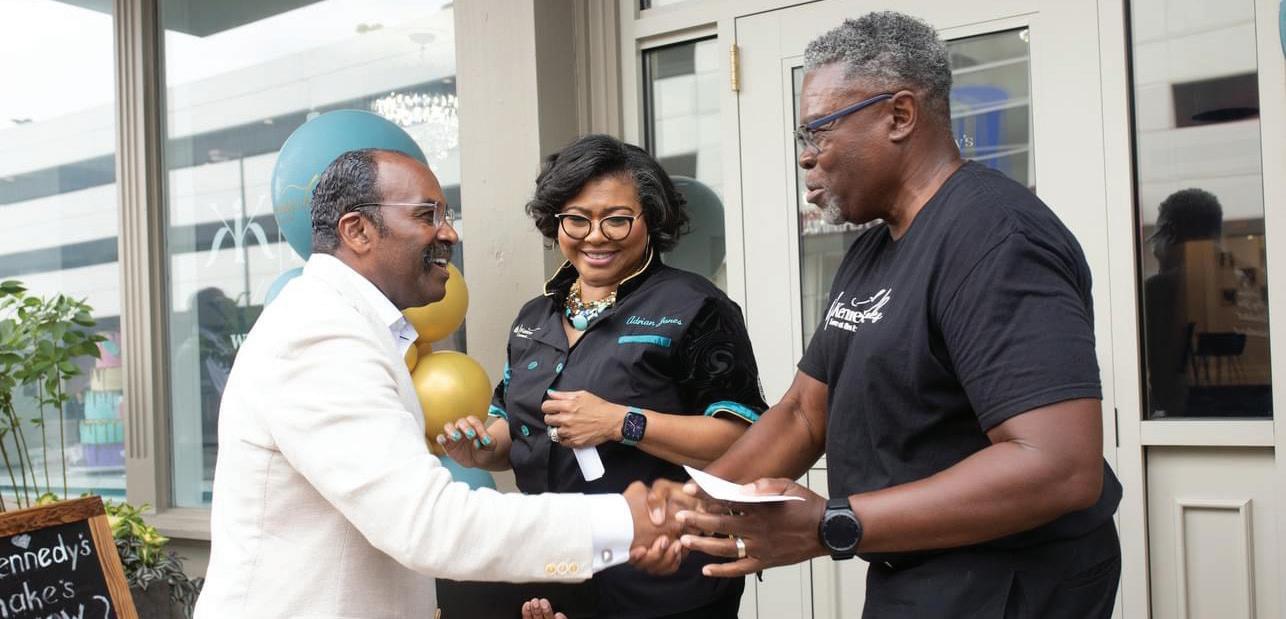
where visitors can enjoy coffee, muffins, mini-Persian love cakes, and a variety of breakfast sandwiches. The boutique’s elegant ambiance creates a perfect setting for intimate gatherings like baby and bridal showers, networking events, and campaign meetings. Adrian’s commitment to creating a sophisticated yet inviting space reflects her passion for both baking and community engagement.
For those concerned about parking, Kennedy’s Kakes offers convenient options. You can park right in front of the boutique or use the Commons parking garage across the street. The welcoming atmosphere extends to their operating hours: Tuesday and Wednesday from 7 am to 3 pm, and Thursday through Saturday from 7 am to 6 pm.
Kennedy’s Kakes is more than just a place to get a cake; it’s a hub for delicious treats, a warm atmosphere, and a venue for special moments. Adrian Jones’s vision and dedication have turned Kennedy’s Kakes into a vibrant part of downtown Columbus, where every visit is a sweet experience, and every cake tells a story of love and community.









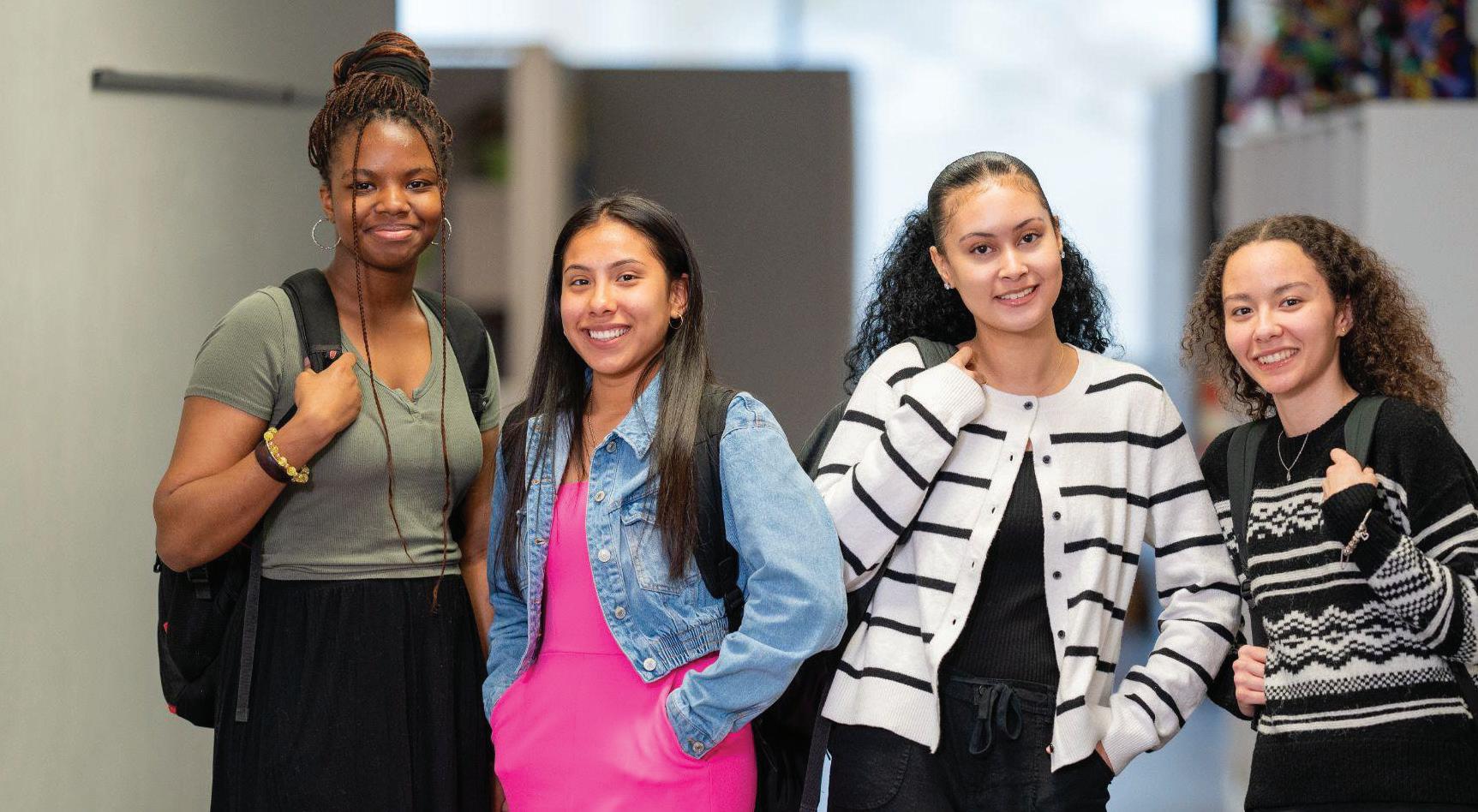
In January 2025, Metro Schools will embark on a new chapter as it opens the doors to the newly renovated Metro at Indianola Campus. Located at the historic Indianola Junior High School Building in the University District, the new campus will enroll students in grades 6-12 and serve as a hub for innovation, academic excellence, and community engagement. This landmark location holds special significance for Columbus, since Indianola was the first junior high school in the United States. As a nod to the building’s legacy, the renovation was spearheaded by Moody Nolan, an architecture firm founded by
Columbus native Curt Moody, an alumnus of Indianola. Mr. Moody credits his time at Indianola for sparking his passion for architecture, making his involvement in this project particularly meaningful.
Metro has a strong history of innovation as the first STEM school in Ohio. Recognized as one of Ohio’s leading early college high schools, it has a proven track record of success. Established in 2006 through a partnership between The Ohio State University and Battelle, Metro is known for its exceptional academic programs and dedication to preparing students for higher education.

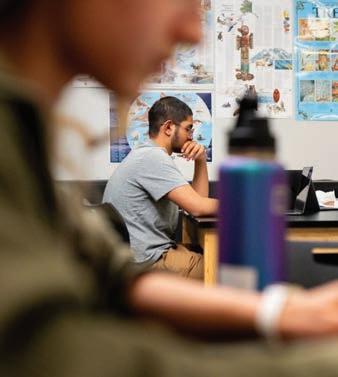

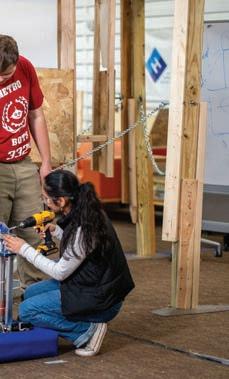
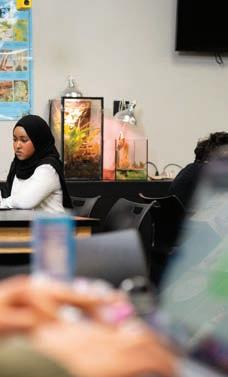
Niche.com ranks Metro as the Best College Prep Public High School in Ohio. The commitment to excellence is also evident in the fact that 45% of the Class of 2024 is currently enrolled at The Ohio State University. Metro consistently leads the state in sending the highest proportion of its graduating seniors to OSU, outpacing all other high schools. This achievement highlights Metro’s mission to equip students with the knowledge, skills, and opportunities to succeed in college and beyond.
Metro’s excellence extends beyond its academic programs. This year, the school was honored with the prestigious Cognia School of Distinction award, highlighting commitment to continuous improvement, innovative teaching methods, and fostering a positive learning environment for all students. Cognia conducted approximately 1,952 accreditation engagement reviews. Only 41 schools were recognized as Cognia Schools of Distinction this year in the U.S. across 23 states and Puerto Rico, and eight are international schools across five countries. This distinction is a testament to the hard work and dedication of Metro’s staff and students, who consistently strive for excellence.
Diversity is at the core of Metro Schools’ values. With students representing 25 different school districts across Central Ohio, Metro is one of the most diverse schools in the state. This diversity enriches the learning experience and fosters a sense of community and belonging for all students, regardless of their background. Metro’s inclusive environment ensures that every student has the opportunity to succeed and feel valued.
As Metro prepares to open its doors at the Indianola Campus, Metro Elementary is slated to open in fall 2025. With its cutting-edge facilities and deep historical roots, the new campus will empower students to excel academically while preparing them to make meaningful local and global impact.





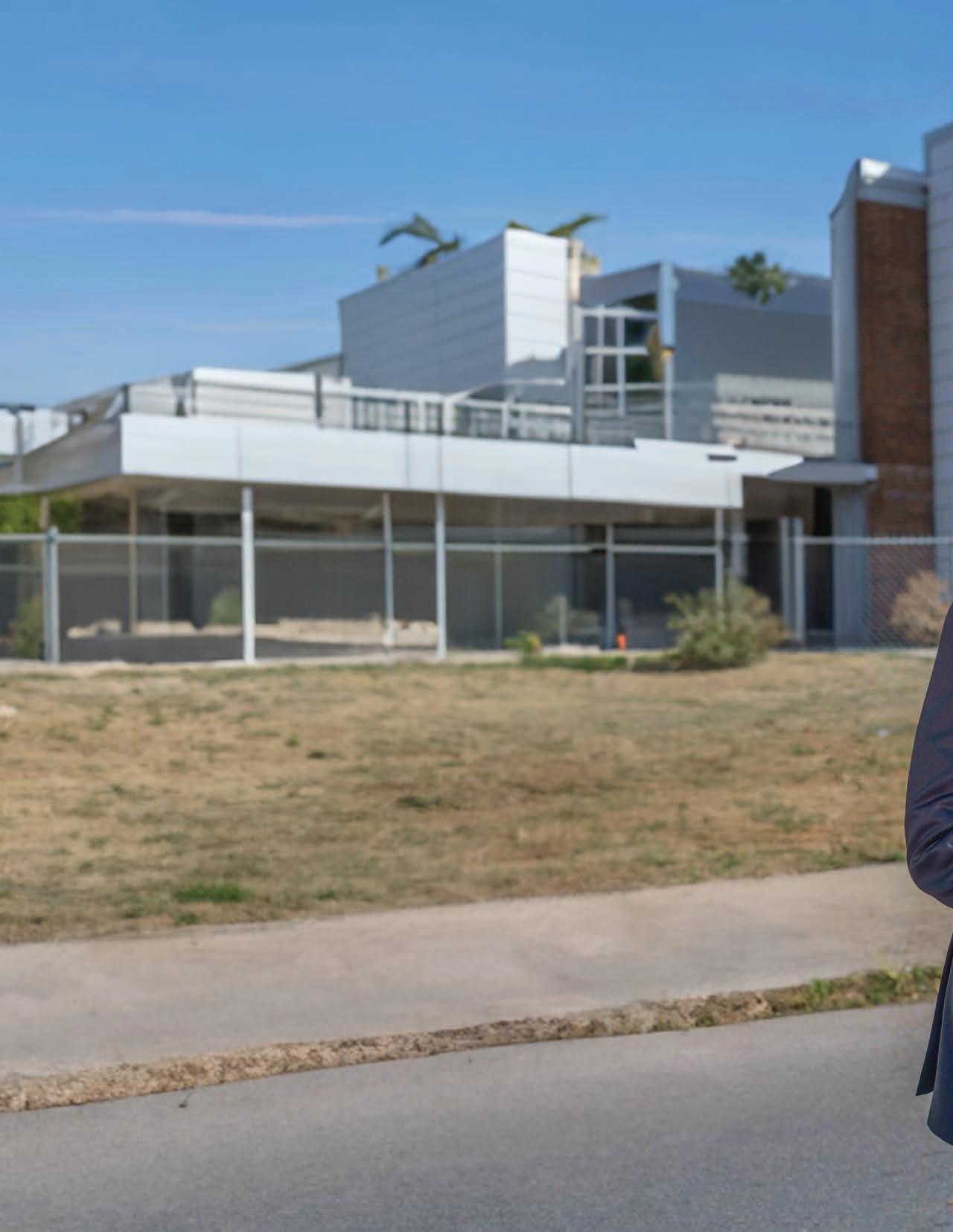
Edward Dudley Sr. and Pastor Jeffrey Dennis share a bond forged through their upbringing in a close-knit historic community in Columbus’ Near East Side. Reflecting on their experiences, they recognize how their childhoods shaped their paths in ministry, business, and community service. Growing up in Columbus, OH, in an area formerly known as Maryland Park, they were surrounded by family, friends, and a vibrant culture.
“I grew up on Fairfield Avenue. This community was like a family. I knew everyone on the street,” Pastor Dennis recalls. The camaraderie of youth sports, basketball, football, and horseshoes created lasting memories and fostered an environment ripe for growth and opportunity.
The Church played a significant role in their lives, serving not just as a place of worship but as a hub for community engagement.
“Worship and work were intertwined for us. It wasn’t just about coming together; it was about how we could help our community grow,” they explained. This understanding of the balance between faith and action became a guiding principle in their lives.
In 1998, Pastor Dennis founded the Minority Behavioral Health Group (MBHG), and Edward Dudley Sr. was promptly appointed as Chief Financial Officer (CFO). MBHG provides culturally appropriate behavioral health services to underserved African American and minority communities. MBHG is the first African American nationally accredited and state-certified community mental health agency in Ohio.
“Our vision is to promote human potential and spiritual growth,” one of the founders shared. Their services include individual and group counseling, school-based interventions, and prevention programs aimed at reducing behavioral health issues. As MBHG expands to Columbus, they emphasize the need for culturally competent mental health care in new communities.
The duo reflects on their friendship during their formative years. “We hung out together and supported each other through the ups and downs of life,” Edward Dudley recalls. They navigated adolescence together, building a resilient bond that has sustained
them through life’s challenges.
Their collective efforts span various organizations, including MBHG and educational initiatives. “We started organizations to address critical issues because we saw the gaps in our community,” they explained. Their journey is about leaving a legacy that inspires the next generation.
“Growing up in this community taught us that our experiences shape who we are and what we can become,” they concluded, embodying the spirit of community leadership and the profound impact that can arise from humble beginnings.
More About Pastor Jeffrey Dennis and Edward Dudley Sr.:
Pastor Jeffrey Dennis, a Senior Pastor and Visionary Leader of Mount Calvary Baptist Church in Akron, Ohio. He is also the Founder and CEO of Minority Behavioral Health Group (MBHG), a community-focused organization that provides culturally sensitive behavioral health services. Additionally, Pastor Dennis has played a vital role in addressing infant mortality in Summit County, collaborating with healthcare institutions and local government agencies. With multiple degrees, including those from Ashland Theological Seminary along with his doctoral work in mental health administration, his academic background has greatly enhanced his ability to lead and inspire others in both spiritual and community-centered missions.
Edward Dudley Sr., is a Certified Public Accountant and the owner-operator of NIRE Accounting & Bookkeeping, LLC, where he provides financial and consulting services to various organizations. He is a graduate of Franklin University and holds an MBA from Ohio Dominican University. His career has spanned roles with the Internal Revenue Service as a Senior Revenue Agent, and he has also served as an Adjunct Professor at Central State University, Wilmington College, and Franklin University. His leadership is a reflection of his dedication to empowering underserved communities through both his professional and personal endeavors.

By Anthony King, M. Ed
It’s our job to make sure he’s ready. We empower him to ignite his curiosity, develop an appetite for learning and the confidence to live with intention.
It’s the difference between simply achieving and thriving.

We invite you to tour our world.
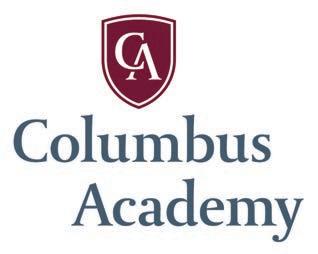
Ready to thrive.

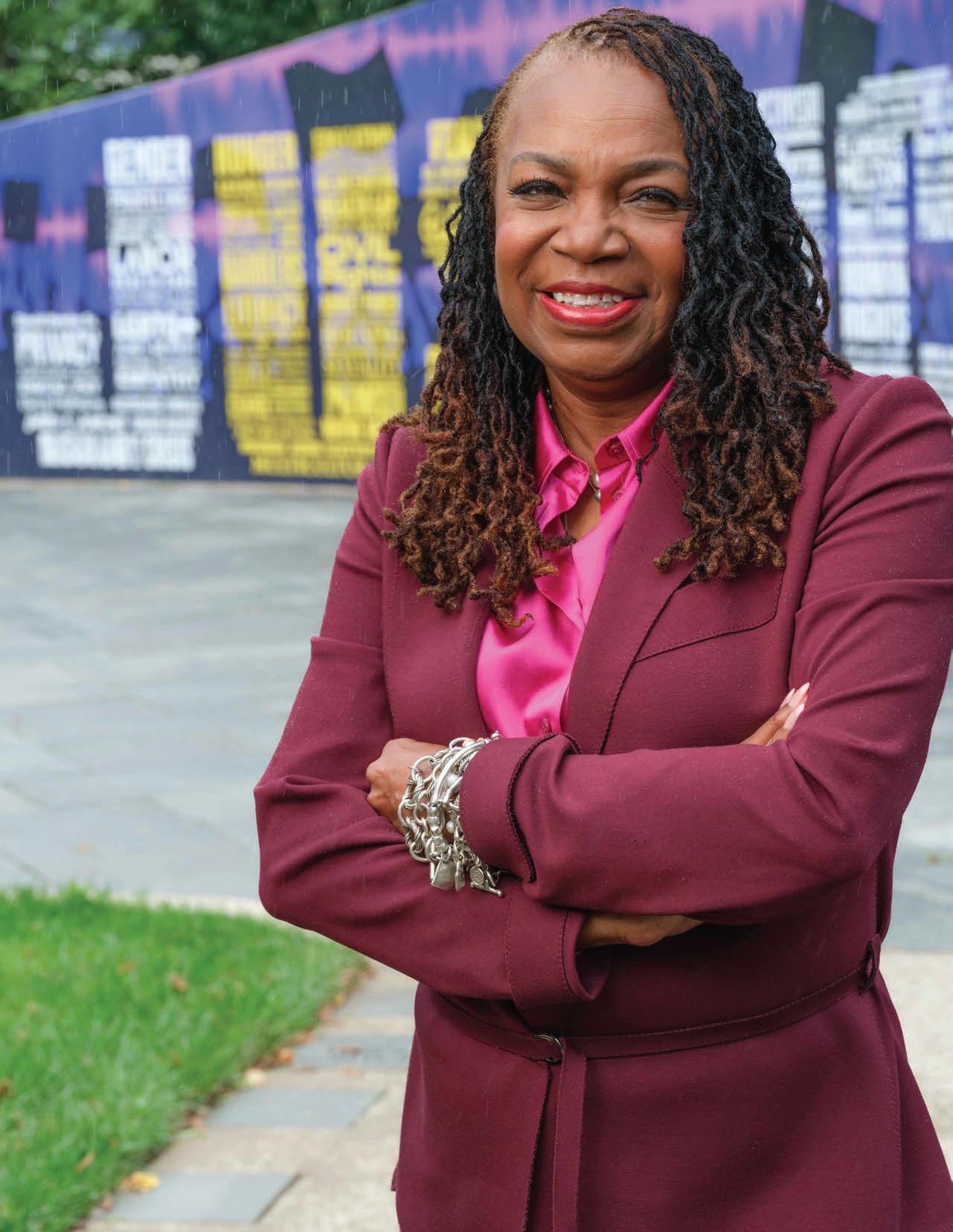
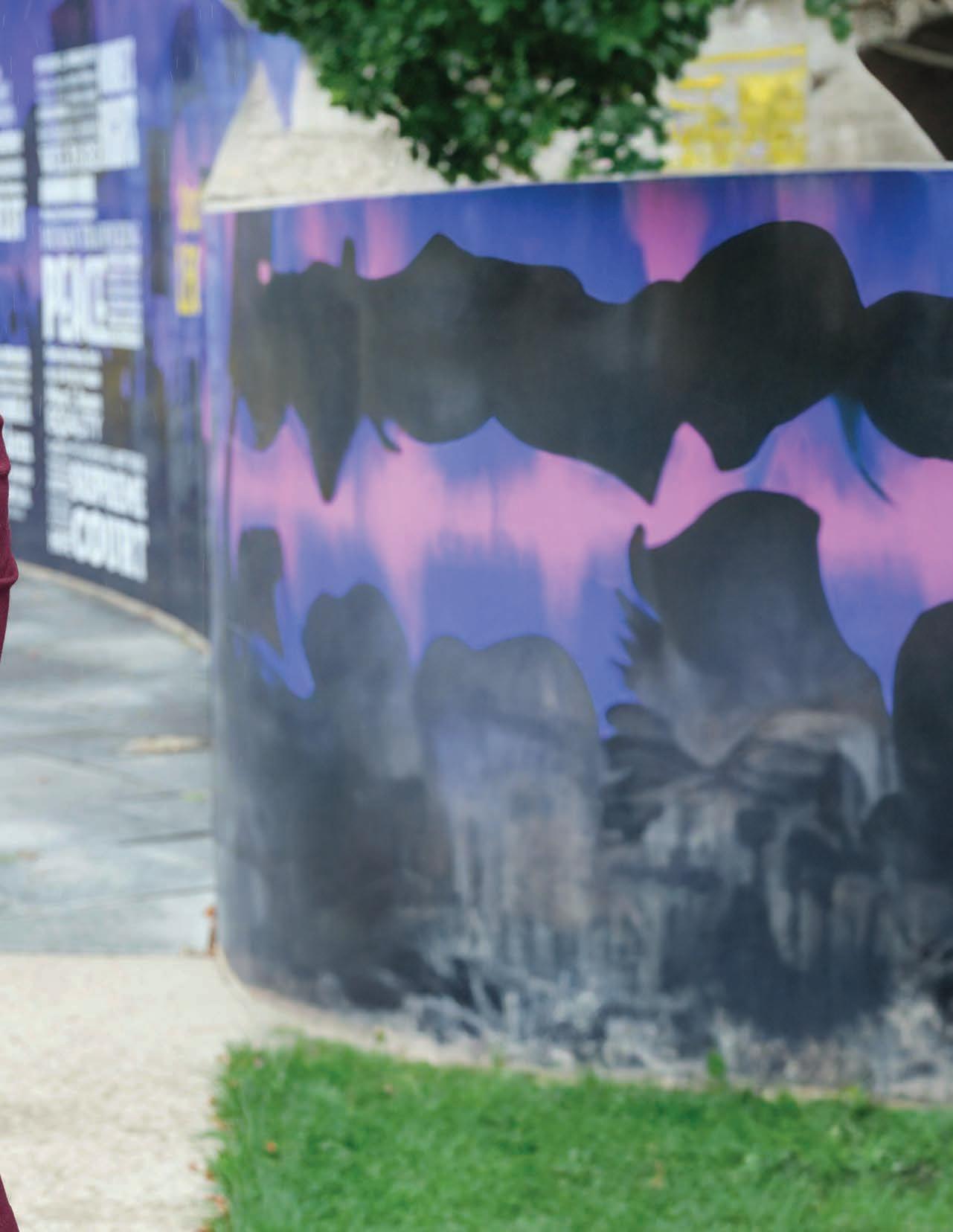
Stephanie Hightower President & Chief Executive Officer
Stephanie Hightower has been a successful executive, change agent and community advocate over the course of her thirty-five-year career. Stephanie propelled a critical, but failing, community nonprofit into a regional powerhouse, having fostered record financial growth with unprecedented investments from strategic partners like the MacKenzie Scott Foundation, and national recognition from companies such as JP Morgan Chase and Goldman Sachs. She brings experience in engaging and connecting to diverse audiences, forging successful partnerships to increase financial and social capital, and attracting and cultivating diverse and innovative executive talent.
Over the last twelve years, Stephanie has served on numerous local, national, and international boards. As Chairperson of the USA Track and Field Federation, (USATF), Stephanie contributed to the first-ever $500 million partnership with international brand company Nike. As President of Columbus City Schools Board of Education, a $1.3 Billion enterprise with 63,000 students, Stephanie led a team that successfully positioned the district to increase its bond rating thus vastly reducing financing costs for a $164,000,000 bond package focused on facility construction and improvements. Appointed by Olympic Champion Lord Sebastian Coe to chair the global athletics federation World Athletics’ Women’s Leadership Task Force, she helped to grow the stature and income of women track and field athletes, administrators, coaches, and officials. Her work launched a collaboration among more than 250 UREG organizations, business and community leaders that was integral to shared survival during the pandemic and is now a platform creating social change in health care, criminal justice, and education systems.
No stranger to the boardroom or the lecture circuit, Stephanie is known as a thought leader, public speaker, and subject matter expert in the areas of sports administration, nonprofit governance, inclusive representation, and community convenings. Columbus publications feature her as “The Truth Teller” in articles such as How Columbus Can Promote Racial Equity.
Stephanie was named to the Columbus Business First “Power 100” list of Central Ohio’s most influential people for three consecutive years, and a recipient of the 2021 Columbus Chamber of Commerce, Columbus Award. She has served as a board member for the World Athletics Council, and member of the community advisory committee for US Bank. Other leadership roles include Founder & Board Chair of Freedom Equity (the first Community Development Financial Institution, which provides micro loans to minority-owned businesses), Chair of USATF Compensation Committee, founding member ofThe Women’s Fund of Central Ohio, Chair of Celebrate One Columbus, Columbus Museum of Art board member, and Advisory Board member of the African American Leadership Academy.
An Olympic hurdler and graduate of The Ohio State University, Stephanie completed executive leadership training at Harvard University. Her son Cameron is her greatest accomplishment, and her two fur babies are her greatest fans.
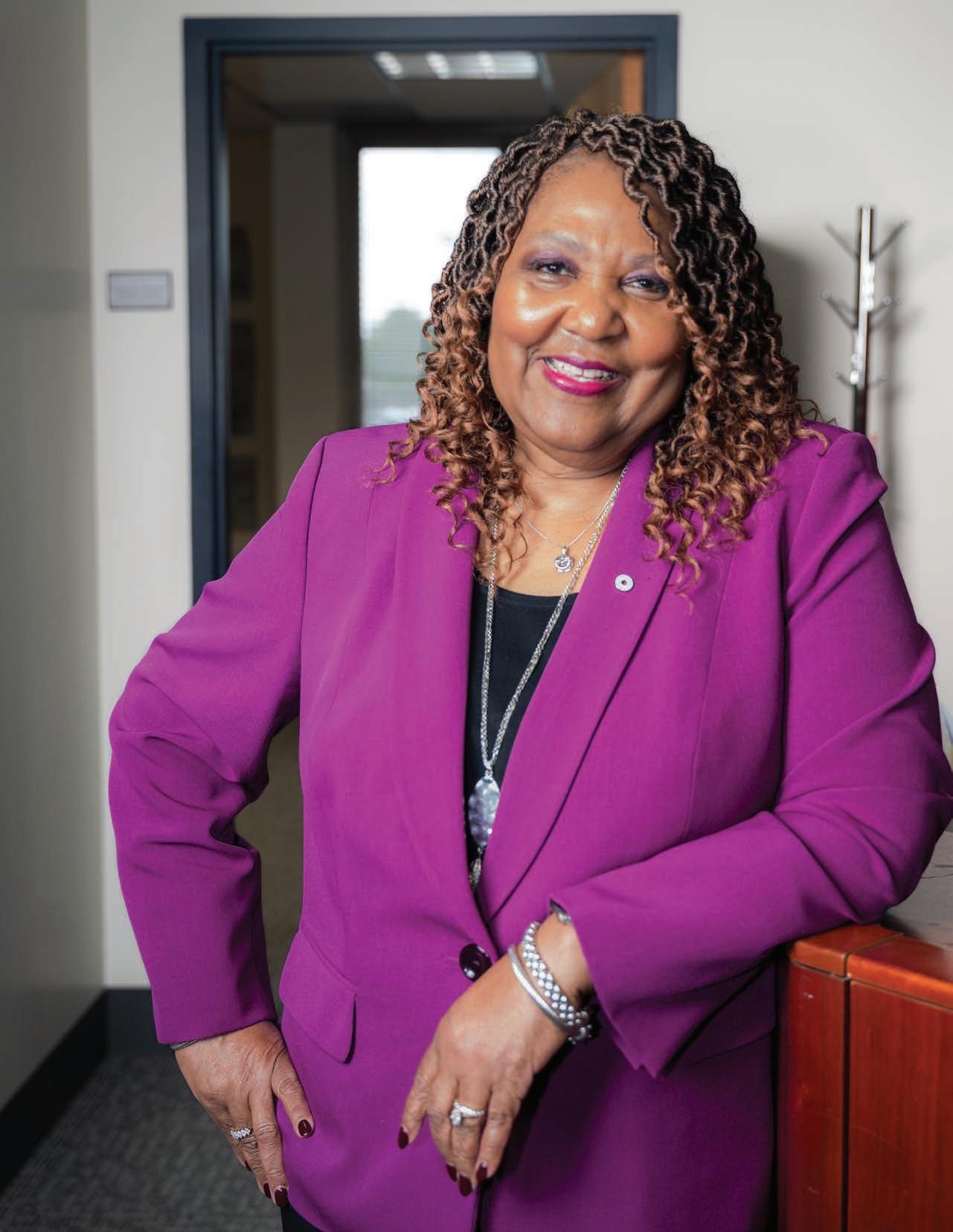
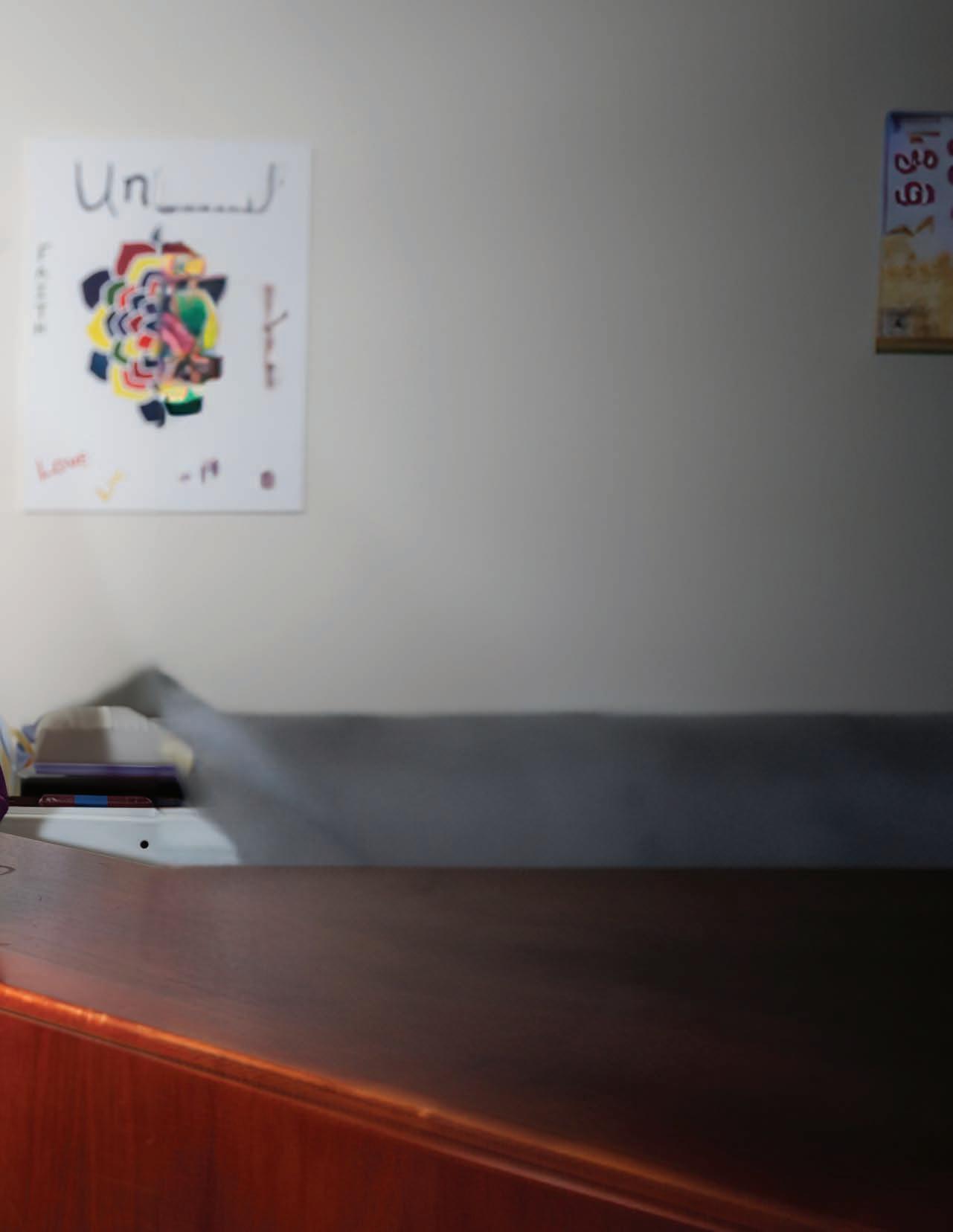
Denise M. Robinson President and Chief Executive Officer
Alvis, Inc.
Denise M. Robinson sits quietly focused in her office, reflecting on her 40-year journey with Alvis, an organization committed to transforming lives through holistic care. Pondering on the path that led her to this work, Denise smiles with a swell of gratitude. Alvis isn’t just her job; it was a mission fueled by compassion and an unwavering belief in the potential of every person.
Denise has witnessed firsthand the devastating impact of systemic issues, particularly the skyrocketing incarceration rates that began with the war on drugs and the tough-on-crime policies of the 1980s. Between then and 2015, the U.S. prison population surged by 500%, disproportionately affecting communities of color and those grappling with untreated mental health and substance use disorders. The statistics haunt her: 80% of individuals in the justice system have struggled with addiction, and many need behavioral health treatment in order to reclaim their lives.
Surrounded by photos of family, friends and colleagues, you get a sense of her core values. Denise leans in while reflecting on the individuals and families who turn to Alvis for help. They face multifaceted challenges, often grappling with layers of trauma, addiction, and the scars of past decisions. Alvis is uniquely positioned to provide a continuum of
services—behavioral health treatment, workforce development, traumainformed care, and more. It is this holistic approach that has the potential to change lives.
Denise’s mind drifts to a poignant moment from fifteen years ago. She recalled meeting three generations of a family—Grandmother Emma, Mother Sabrina, and Son Kelvin—who were all enrolled in Alvis programs. Their stories of hardship were both heartbreaking and enlightening, revealing the painful cycle of addiction and justice involvement that had woven through their lives. They had shoplifted together, sold the goods to buy drugs, and used together. The sight of Emma, who had once been a steadfast figure in the family, now seeking help alongside her daughter and grandson, struck Denise deeply.
Watching them interact, Denise recognized the profound impact of family dynamics on recovery. It became clear to her that to break the cycle, Alvis needed to focus not only on reentry services but also on supporting families affected by the justice system. The longing she observed during these family visits haunted her, igniting a fire within her to lead her team to create change.
In 2014, this determination culminated in the Evening of Light fundraiser, an event designed to raise money for a new Family and Children’s Program at Alvis.
“We had the reentry services, the behavioral health programs, but we were missing a critical piece,” she mused, her heart racing with excitement. The program’s pillars—parenting education, support for children, and structured activities to rebuild trust—reflects her team’s commitment to not just treat the symptoms but heal the roots of the problem.
Denise shared that her greatest lesson emerged through her role as an advocate. Initially hesitant to solicit donations, she realized that she was in the position to use her voice for those who didn’t have one. Inspired by her mentor Neil Tilow, she shifted her approach, embracing the need to actively seek support and champion the critical programs in Alvis’ 44 locations throughout Ohio that change lives.
As she dove deeper into her role as CEO, Denise found her voice and became Alvis’ number one evangelist. She began engaging with lawmakers, business leaders, and community members, articulating the need for holistic care and community support. “The best thing I can do for Alvis programs is to advocate passionately,” she shared. “Civil rights without economic rights are no rights.”
Reflecting on her upbringing, Denise recalled her parents’ teachings about the importance of service. They believed that helping one person could create ripples of change. Denise carries this lesson with her, motivated to create a world where potential is valued over past mistakes.
Looking ahead, Denise envisions a world where successful reentry is not just possible but celebrated. She understands that communities thrive when they embrace returning citizens and provide them with opportunities to contribute positively. By advocating for evidence-informed
treatment programs, Denise aims to dismantle the barriers that keep individuals trapped in cycles of poverty, addiction, and recidivism. “When individuals succeed, families are reunited, and the community flourishes,” she stated avidly.
As Denise reflects on her journey, and the work she does across the globe, she shares a renewed sense of purpose. The road has been fraught with challenges, but every success story—everyone who found their way back to stability—has been a testament to the power of hope and holistic care. Alvis had become a beacon of change, a place where lives were transformed not just through treatment but through care, understanding, and a commitment to equity.
In her bustling office, surrounded by reminders of the battles fought and the victories won, Denise M. Robinson knows that every ripple of hope created by Alvis has the power to change not just one life but generations to come.
“When individuals succeed, families are reunited, and the community flourishes,”

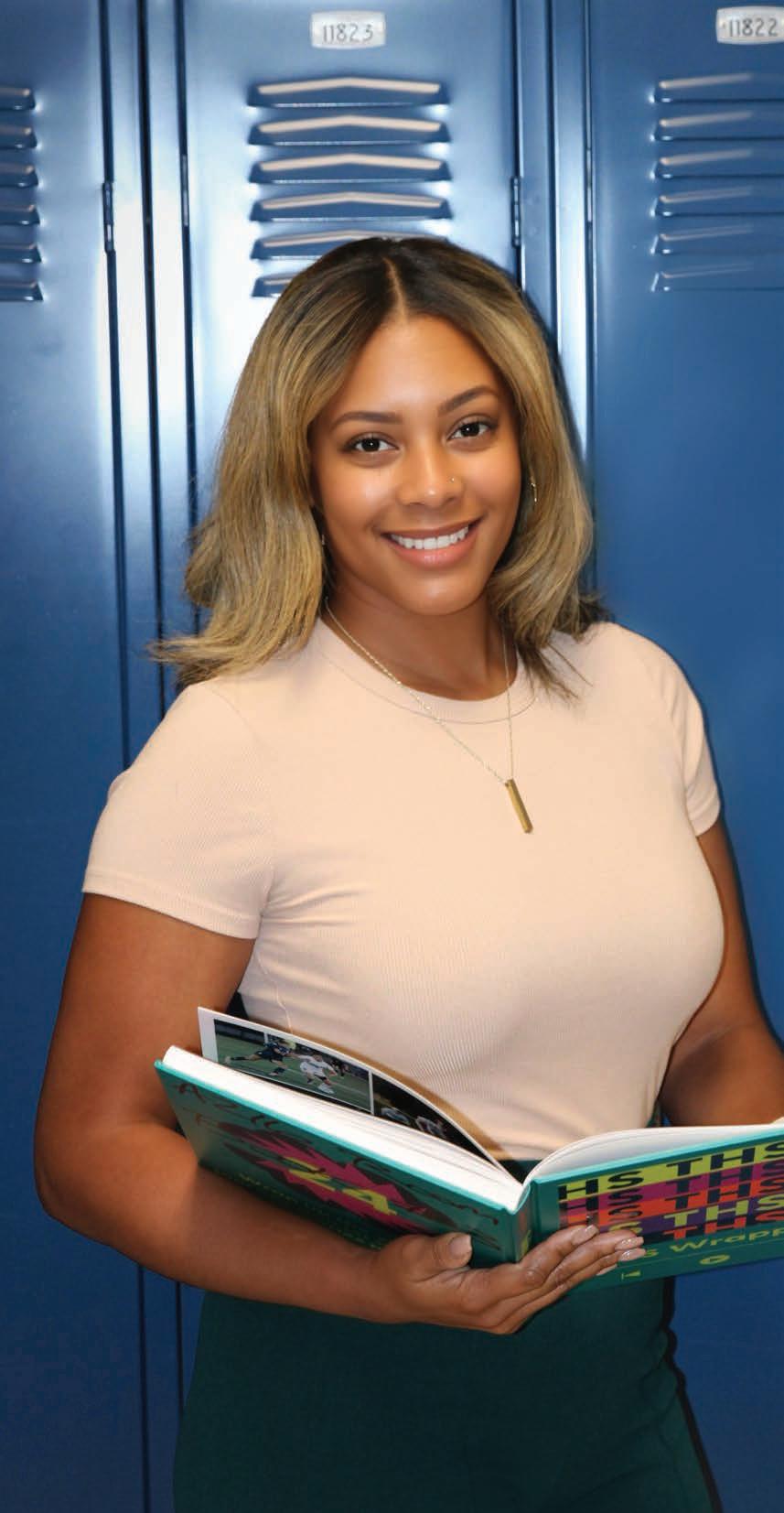
“I must have still been in elementary school when I first read The Autobiography of Malcolm X. My father placing that book in my young hands would begin to shape my worldview in a way more powerful than any other text I had ever read before, and I read a lot. From an early age, Malcolm X’s belief that ‘if you want something, you had better make some noise’ struck a chord with me. As I grew up and entered the world of education, I found myself echoing that philosophy— not just for my own career, but for my students, whose voices I encourage to rise above the crowd.”
Most people do not instantly think of teachers as the noisiest bunch, at least not in the likes of someone like Malcolm X, but sweet brother Malcolm was on to something. In today’s educational climate, where systemic challenges often go unaddressed, teachers like Daneé Pinckney are following Malcolm’s lead and amplifying their voices for the betterment of their students.
Awarded recognitions such as a Master Teacher Finalist by the Martha Holden Jennings Foundation in 2022, 2023 Twinsburg City Schools Teacher of the Year, a 2023 Fund for Teachers Fellow, and most recently being named 2025 Ohio’s Teacher of the Year by the Ohio State Board of Education- Pinckney has been making the kind of noise that others are taking note of.
Pinckney started her teaching in Columbus after graduating from The Ohio State University. Sher first high school teaching experience took place at Focus Learning Academy West, which affirmed her dreams of being an educator. She led students through numerous immersive learning experiences from producing their own music videos rapping about grammar, to showing up to school fully costumed as a character from Edgar Allen Poe’s “The Black Cat” to get students excited about the Poe Party she hosted for them. These experiences culminated in a desire to do more, not just for her students in Ohio, but for students across the globe.
Pinckney later moved to Northeast Ohio and earned a Master of Education degree in curriculum and instruction from Ashland University in 2019. She currently teaches 11th and 12th-grade English at Twinsburg High School, and to keep herself engaged in the profession, she makes a point to constantly search for new opportunities to challenge herself professionally and personally.
One such opportunity came to fruition through her creation of a senior-level course on African American Literature, addressing a need for greater representation
expressed by both students and community members. Securing grant funding to bring this course to life, Pinckney not only fulfilled a personal goal but also enriched the educational experience for students and staff alike.
Students in her classes love having the opportunity to learn more about American history through Black literature, dialectical studies, food traditions, and art. She also works to encourage students’ engagement in community service and activism projects instilling in them a sense of social responsibility and civic engagement.
A fellowship opportunity allowed Pinckney to journey through Western Africa and while there she made connections with a school in Ghana. She brought back those experiences to her classroom, and her students were excited to connect with those students from across the Atlantic Ocean. Her students collaborated with the students in Ghana and Pinckney’s classes led a schoolwide project engaging their peers and other community members to help support the continuing education of their new friends.
Many of Pinckney’s former students have reached back out to express the empowerment they felt through her class and update her on the ways her passion has sparked passions in them and their peers. Some have gone on to pursue social justice initiatives in college and others have even become teachers and noisemakers in their own communities.
Like her early influence, Malcolm X, Pinckney knows that true change comes from making noise, and not just for oneself. She says that her newest role as Ohio Teacher of the Year, “is about giving other teachers and students inspiration to make noise for a lifetime and using their voices to create a better world.” As she looks to the future, Pinckney’s mission remains the same: to amplify her students’ voices and prepare them to lead the charge for change.
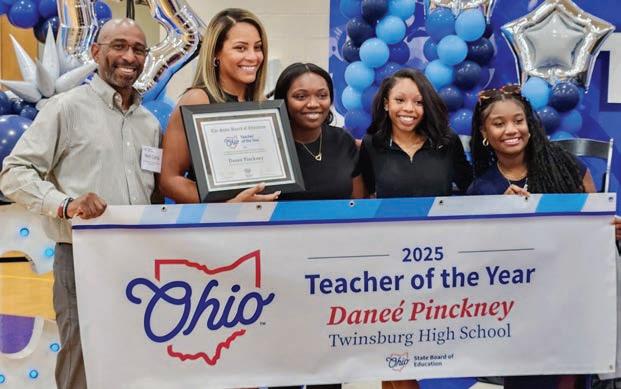


Dr. Nathan Lee Roy Harris is a visionary leader and educator who is passionate about empowering youth and families through education. As the President of See Brilliance, a nonprofit organization that aims to provide educational opportunities rooted in Black and Latinx cultures, Nathan is committed to equipping young people with the tools they need to discover their innate brilliance. His achievements in this field are truly impressive and worthy of respect.
As President of See Brilliance, he has led the organization to exponential growth in impact and reach throughout Columbus, from growing from solely having monthly programming to now having in/after-school programming in over 8 schools, 12 community centers, and churches, and hosting annual STEAM Festivals that welcomed and fed over 200 youth with fantastic partnerships with COSI, Columbus Zoo and Aquarium, Past Foundation, Franklin Park Conservatory, Game Arena, and others.
Nathan’s dedication to education is deeply personal,
rooted in his own experiences. He graduated from Morehouse College in Atlanta, GA, receiving a bachelor’s degree in computer science. After college, he pursued his Ph.D. in Engineering Education, focusing on parental involvement in STEM. He became the youngest Black man to obtain this degree from The Ohio State University, following the Buckeye legacy of 4 generations dating back from his great-grandmother, Bertha M. Jefferson. Throughout his academic journey, Nathan recognized the importance of culturally relevant education and the need to create opportunities for underrepresented communities to excel.
Dr. Harris’s research focuses on broadening participation in STEM, mainly through summer K-12 Computer Science programs, and promoting culturally relevant STEM experiences in the home. The National Science Foundation has recognized his work, and he has shared his insights as a TEDx speaker and in lectures throughout the country.
In addition to his academic achievements, Dr. Harris has a strong record of serving his community. He currently serves as the Vice Chair of the Near East Area Commission in Columbus, Ohio, advocating for neighborhood zoning, planning, and development. His commitment to community upliftment is further demonstrated by his previous role as Youth Minister at Mt. Olivet Baptist Church under the leadership of the late Dr. Charles E. Booth. He is also a proud member of Alpha Phi. Alpha Fraternity Inc.
Nathan’s commitment to his work is fueled by his belief that he is his ancestors’ wildest dreams. He is driven to create a better future for the next generations by providing access to education that celebrates the brilliance of the youth. Nathan’s leadership and dedication to educational equity inspire many, and his work can potentially change the trajectory of countless young lives.



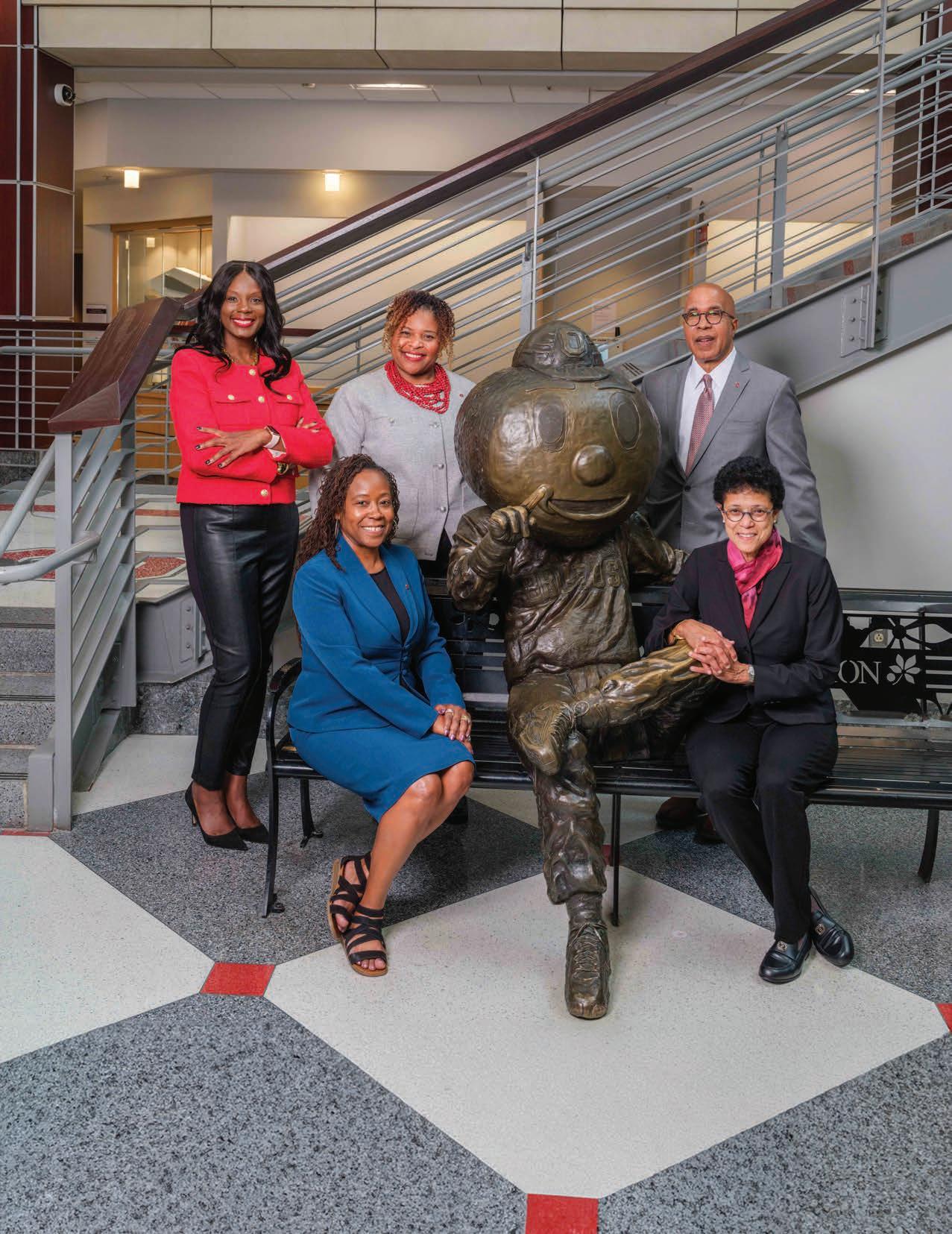
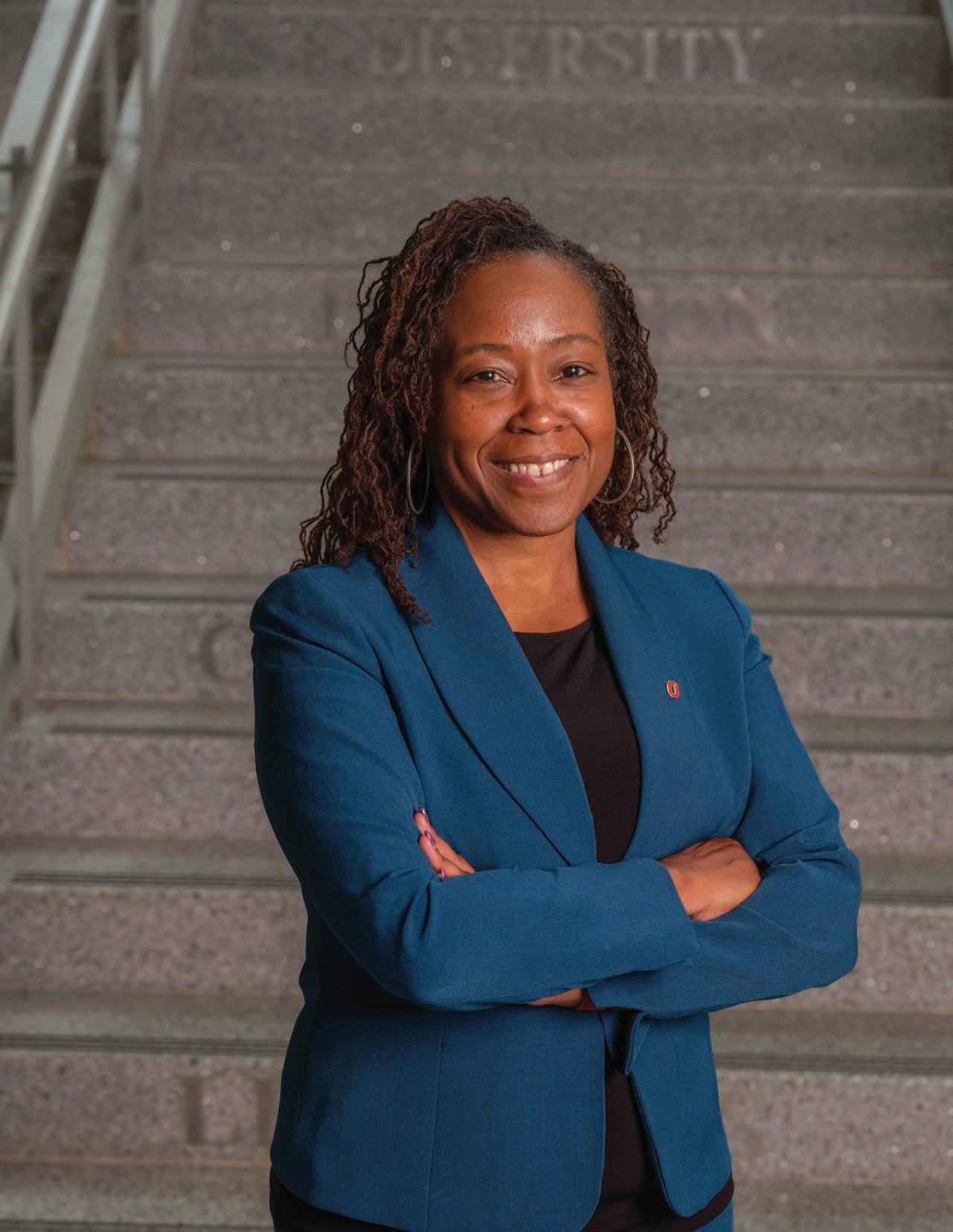
PHOTOGRAPHY
Ira Graham III

ccomplished roboticist, entrepreneur, and educator, Dr. Ayanna Howard currently serves as the dean of the College of Engineering at The Ohio State University, a leading research institution and one of the nation’s distinguished land-grant universities. In her role, Dr. Howard is responsible for the strategic vision, mission, and goals of the college, overseeing the education of over 11,100 students across 12 academic departments, managing the Ohio State University Airport, and administering a faculty and staff team of more than 900.
Previously, Dr. Howard held several roles at the Georgia Institute of Technology, most recently as the Chair of the School of Interactive Computing. Her research focuses on artificial intelligence (AI), assistive technologies, and robotics, resulting in over 275 publications.
Before entering academia, Dr. Howard worked at NASA’s Jet Propulsion Laboratory as a Senior Robotics Researcher and Deputy Manager in the Office of the Chief Scientist. There, she designed advanced technologies for future Mars rover missions. Currently, her projects range from healthcare robots to developing methods for mitigating bias and enhancing trust in AI.
Dr. Howard’s unique accomplishments have been featured in various prominent publications, including Vanity Fair, USA Today, Forbes 50 over 50, and TIME Magazine. Business Insider recognized her as one of the 23 most powerful women engineers globally, and WomenInc. named her one of the most influential
women corporate board directors. She has appeared on ABC’s The View, the Amazon Prime series “Luminaries,” and in the IMAX movie Superhuman Body.
A Fellow of the Institute of Electrical and Electronics Engineers (IEEE) and the Association for the Advancement of Artificial Intelligence (AAAI), Dr. Howard is also an elected member of the American Academy of Arts and Sciences. In 2022, she was elected Fellow of the American Association for the Advancement of Science (AAAS) and the National Academy of Inventors (NAI), and appointed to the National Artificial Intelligence Advisory Committee (NAIAC). She regularly advises on robotics, AI, and workforce development, serving as a media expert for outlets like CNN and NPR, and participating in interviews and podcasts with PBS, Discovery Channel, BBC, and Huffington Post.
Dr. Howard is a tenured professor in the Department of Electrical and Computer Engineering with a joint appointment in Computer Science and Engineering. As dean, she holds the Monte Ahuja Endowed Dean’s Chair, established in 2013 through a generous gift from Distinguished Alumnus Monte Ahuja ‘70. She earned her degree from Brown University, an M.S. and Ph.D. in Electrical Engineering from the University of Southern California, and an M.B.A. from the Drucker Graduate School of Management.
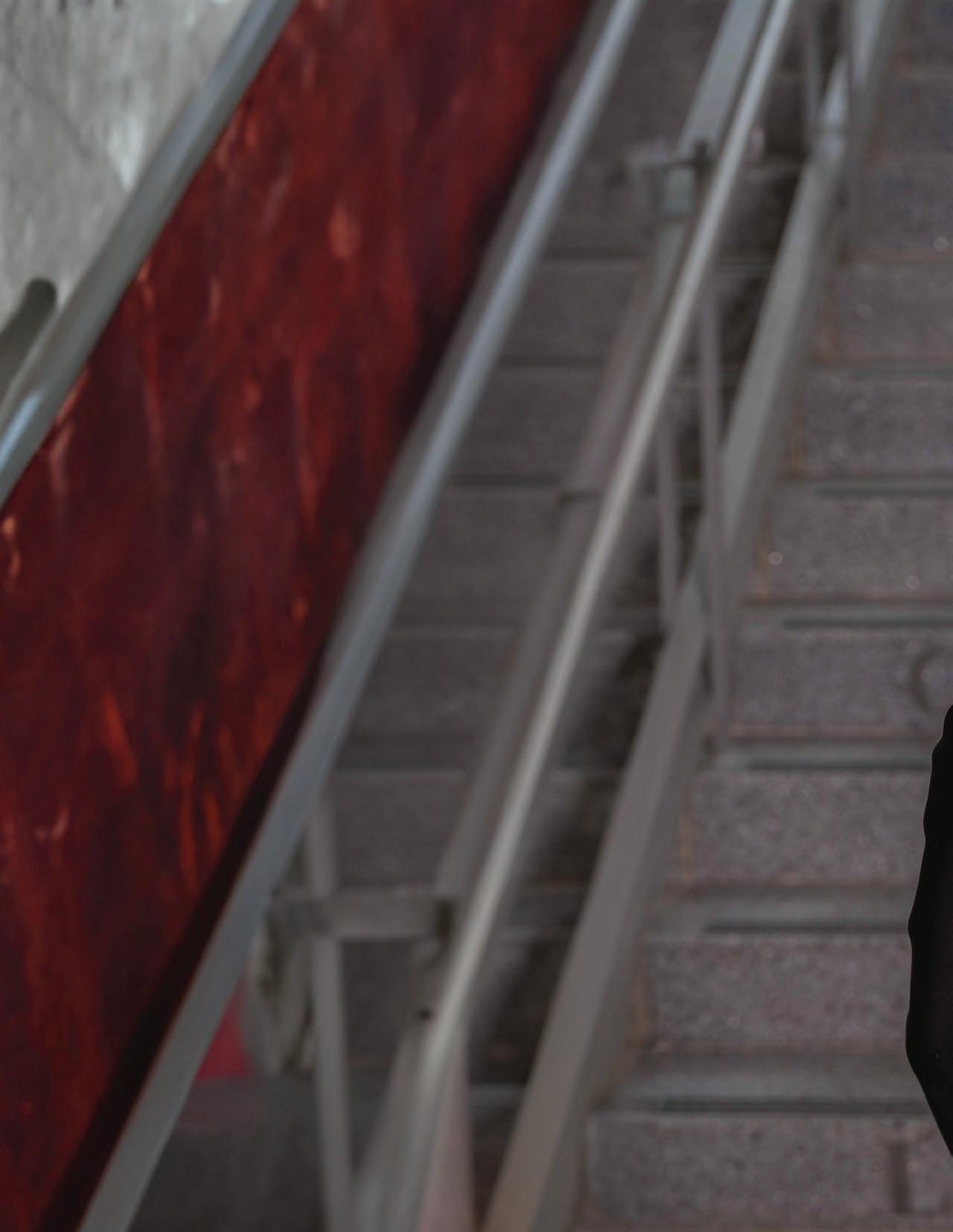
Dr. Carroll Ann Trotman has served as an educator, researcher and senior administrator, but the accomplishment she is most proud of is becoming dean of The Ohio State University College of Dentistry. In 2021, she left an administrative position at a dental school on the east coast to serve as the College of Dentistry’s senior leader. Energized by the college’s unlimited potential, Dr. Trotman set to work implementing innovations in the dental hygiene and dental curricula, expanding technologies used in patient care, advancing the college’s research and strategic initiatives, and expanding dental care to Ohio’s underserved communities.
Originally from Trinidad and Tobago, she completed her early education and decided to pursue a career in dentistry. That led her to Dundee University in Scotland where she earned her dental degree. Because of her fascination with the structure and movement of the human face, Dr. Trotman specialized in orthodontics. That decision led her to Columbia University in New York where she completed her orthodontic training. She earned advanced degrees in oral biology from Columbia University and clinical research design and statistical analysis from the University of Michigan Horace H. Rackham School of Graduate Studies. Upon completing a Fellowship in Craniofacial Anomalies at the Hospital for Sick Children in Toronto, she entered academia, teaching at dental colleges throughout the country. Among other leadership positions, she has served as
the assistant dean for Graduate Education and Academic Development at the University of North Carolina’s Adams School of Dentistry and the associate dean for the Office of Academic and Student Affairs at the University of Maryland’s School of Dentistry. Prior to joining Ohio State, she was chair of the Department of Orthodontics and the associate dean for Faculty Development at Tufts University’s School of Dental Medicine.
Throughout her professional journey, Dr. Trotman has been motivated by her passion for providing dental care to vulnerable populations and communities. Knowing that dental care is among Ohioans’ most significant unmet health care needs, she is working to expand the college’s outreach program that provides oral health care and education for underserved children in Columbus and surrounding communities. She also works to improve the quality of life for patients born with cleft lip and palate and those with facial paralysis through her research funded by the National Institutes of Health. Through those efforts, she supports surgeons’ care for these patients who have challenging and complex needs. It is work she finds especially rewarding as it enhances knowledge and has a substantial impact on both the patients and the dental profession.

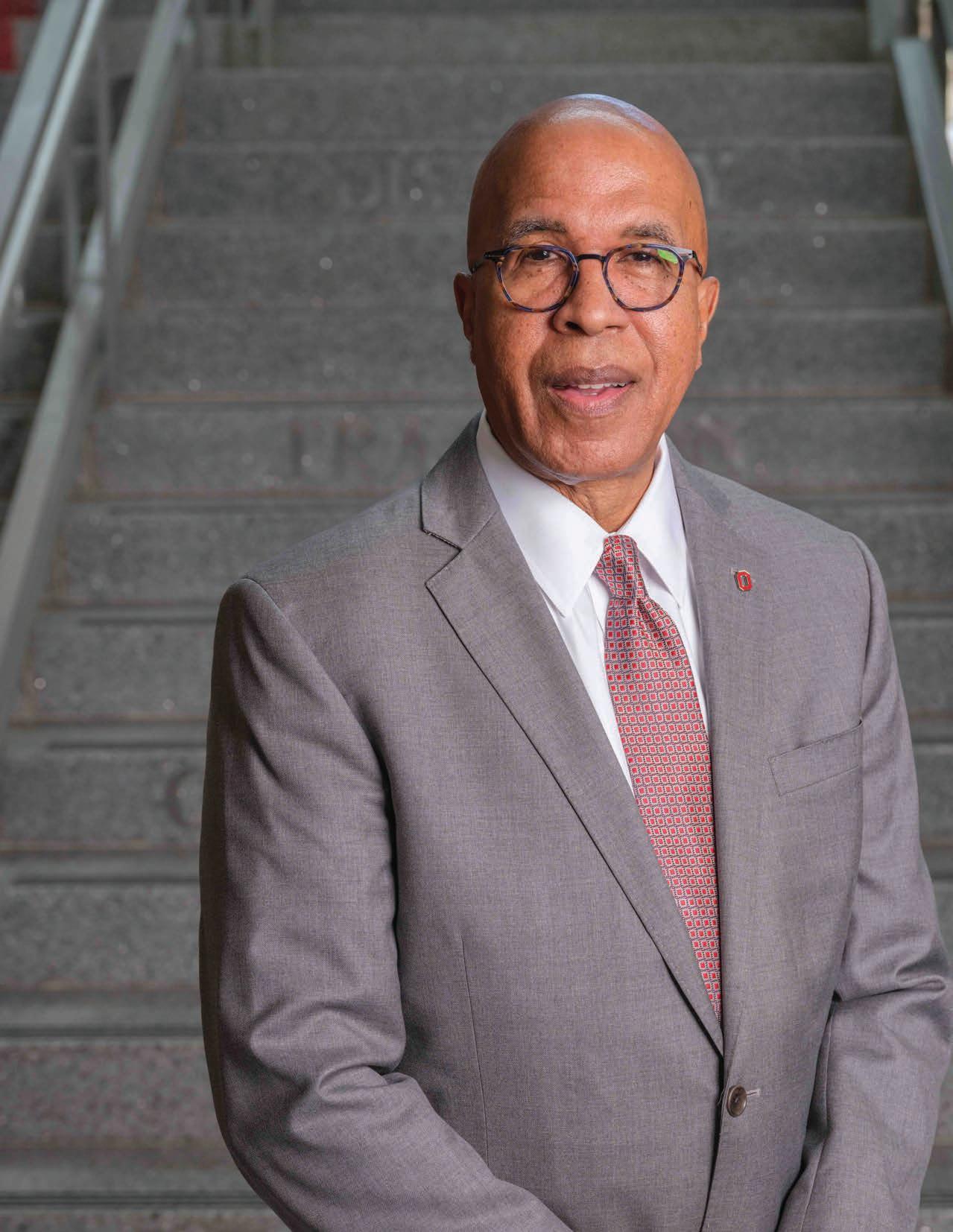
PHOTOGRAPHY
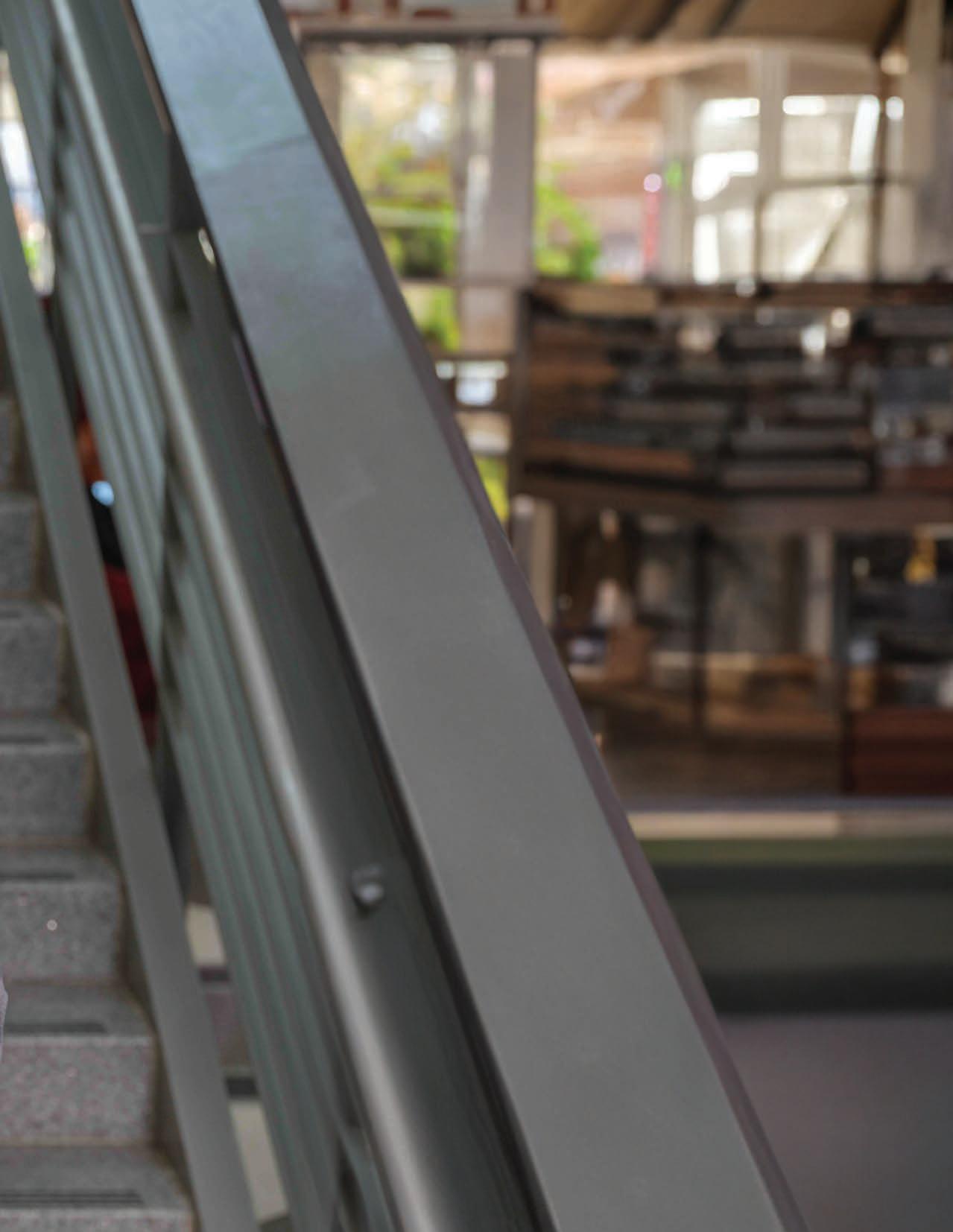
Dr. Don Pope-Davis is an eminent leader in higher education, renowned nationally for his dedication to addressing issues of equity, economic growth, and the psychological well-being of educators and students. With over 25 years of experience in academia, he has made significant contributions through his roles as a scholar and transformational leader.
Dr. Pope-Davis began his career as an educator and has advanced to various leadership roles at multiple institutions. He served as dean at the College of Education at New Mexico State University, a Hispanic-serving institution. During his tenure at the University of Notre Dame, he held multiple senior-level roles, further solidifying his reputation as a transformative leader. His scholarly work, particularly on religious attitudes, multicultural competence, and unintentional racism in counseling, is widely recognized and published in peerreviewed journals.
An elected Fellow of the American Psychological Association’s Society for Psychological Study of Ethnic Minority Issues and the Society of Counseling Psychology, Dr. Pope-Davis has made substantial contributions to the field of psychology. His recent co-authored book, published by Cambridge University Press, explores the attitudes of Black Catholics in America, adding to his extensive body of work.
Since 2018, Dr. Pope-Davis has served as the Dean of the College of Education and Human Ecology (EHE) at The Ohio
State University. Under his leadership, the college has flourished. EHE is home to more than 4,000 undergraduate and graduate students and 1700 employees. Under Dr. Pope-Davis’s innovative leadership, diversity among EHE’s faculty increased from 24% to 37.7% in tenuretrack and clinical appointments, making EHE the most diverse college on campus.
His efforts have led to the college being ranked 21st in the nation by U.S. News and World Report, placing it in the top 8% nationally, 12th among public universities, and making it the top-ranked education college in Ohio. A successful fundraiser, Dr. Pope-Davis has far exceeded the historical benchmarks for the college.
Dr. Pope-Davis is currently the president of the Council of Academic Deans from Research Education Institutions (CADREI) and a member of Deans for Social Justice and Equity in Education. He has previously chaired the American Psychological Association’s Committee of Ethnic Minority Affairs. In 2023, he was recognized as an influential educator by Edu-Scholar, a testament to his impact on the field.
He holds a doctorate from Stanford University, reflecting his strong academic foundation and commitment to excellence in education. Dr. Pope-Davis’s career is distinguished by his unwavering commitment to equity, diversity, and the psychological well-being of the academic community, making him a pivotal figure in higher education.
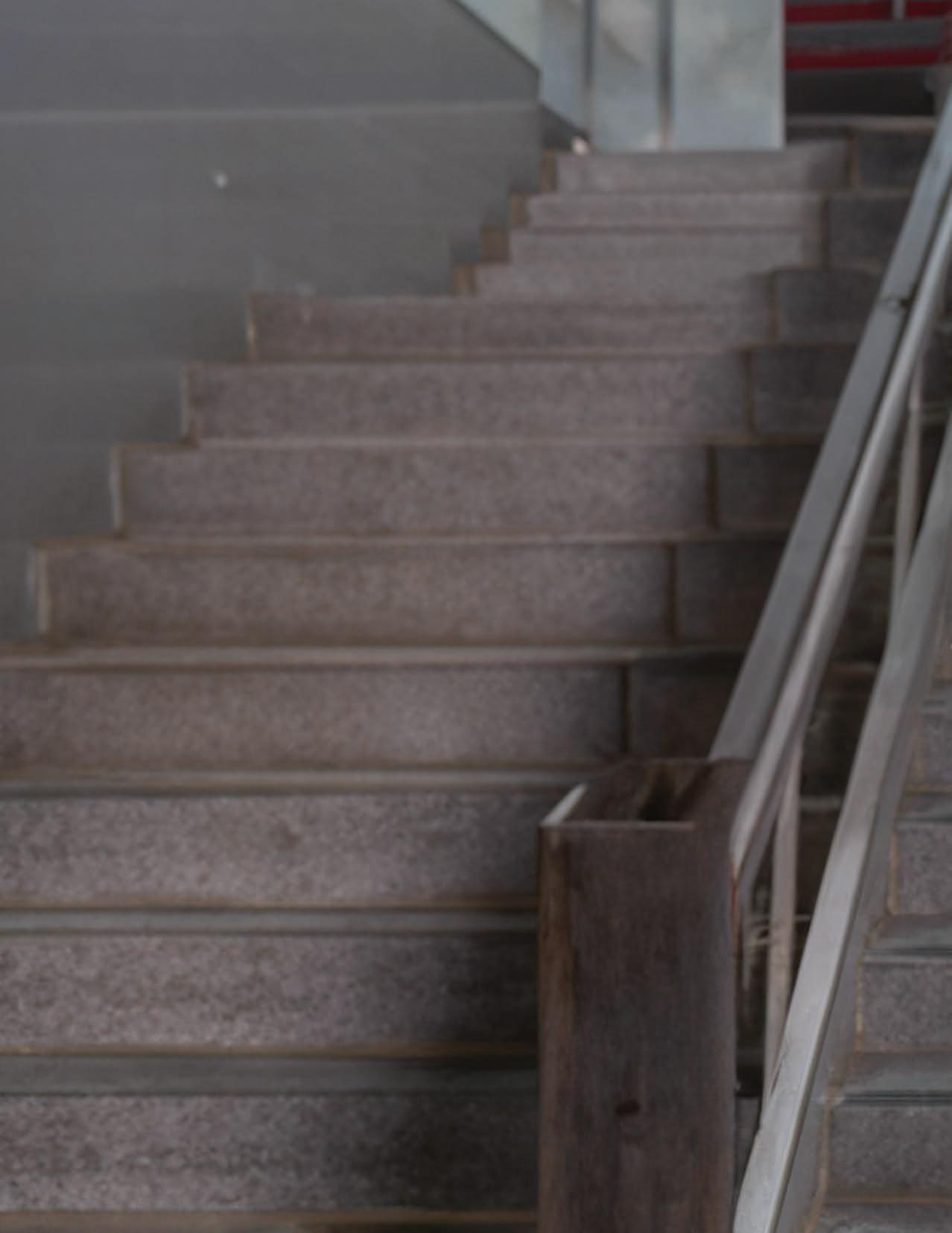
Dr. Melissa Shivers has dedicated nearly 30 years to higher education, focusing on removing barriers to success for students and staff while contributing to community health and safety. Since January 2020, she has served as the Senior Vice President for Student Life at The Ohio State University, where she is part of the senior administration team and provides leadership on the student experience. Dr. Shivers is proud to lead an extraordinary team that supports over 60,000 Buckeyes across six campuses in Ohio. Their mission is to inspire students and staff to engage, learn, and thrive during their time at Ohio State and beyond.
In her role, Dr. Shivers oversees a wide range of operations that affect students outside the classroom, including residential life, dining services, the Ohio Union, mental health support, career development, recreational sports, health care, disability services, and student advocacy.
Before joining Ohio State, Dr. Shivers held leadership positions in Student Affairs at several institutions, including the University of Iowa, University of Tennessee, Knoxville, University of Georgia, Clemson University, and Georgia Southern University. She has also served as a faculty member for NASPA’s Institute for Aspiring Senior Student Affairs Officers.
A proud first-generation college graduate and member of Alpha Kappa Alpha Sorority, Dr. Shivers earned a BS in
Communication Arts from Georgia Southern University, a Master of Education in Counseling and Guidance from Clemson University, and a PhD in College Student Affairs Administration from the University of Georgia.
Her contributions have been recognized with numerous honors, including the 2024 Southern Association for College Student Affairs’ Gavel and Gravel Society membership and being named a 2022 Legend and Legacy by the King Arts Complex. Dr. Shivers was also a 2021 Diamond Honoree by ACPA, one of the highest distinctions from the international student affairs professional organization. She serves on several boards, including the Wellington School Board of Trustees and the YWCA of Columbus, and is a university representative on The Ohio State University Foundation Board. Additionally, she is a member of the Association of Public Land-grant Universities Council on Student Affairs and serves on its executive committee.
Beyond her professional accomplishments, Dr. Shivers is an avid college football fan, a world traveler, and a dedicated “AuntieHero” to her two favorite humans, Jhared and Jordan. With her extensive experience, she brings expertise in leadership, fundraising, organizational planning, and community engagement, making her a vital asset to the Ohio State community.

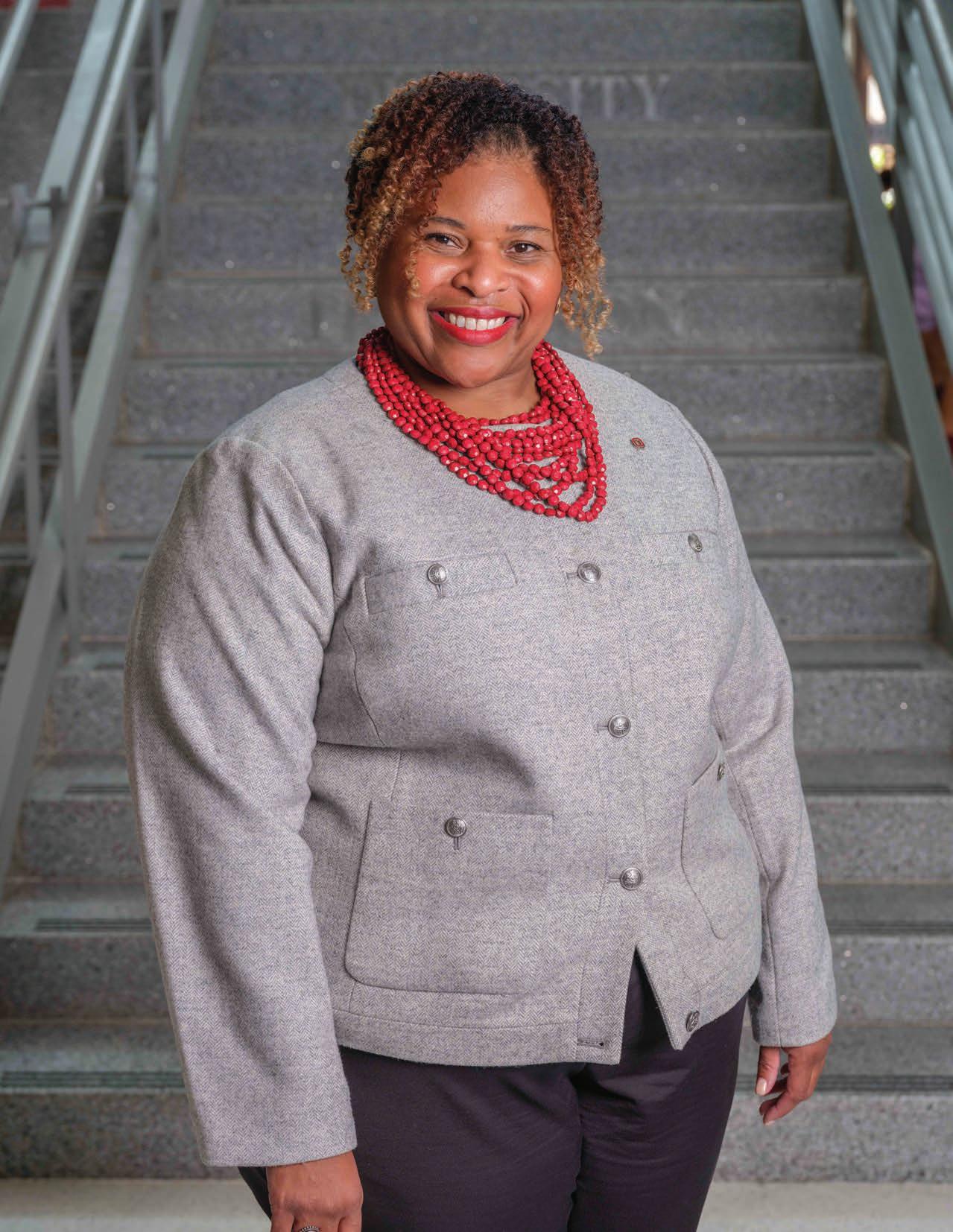
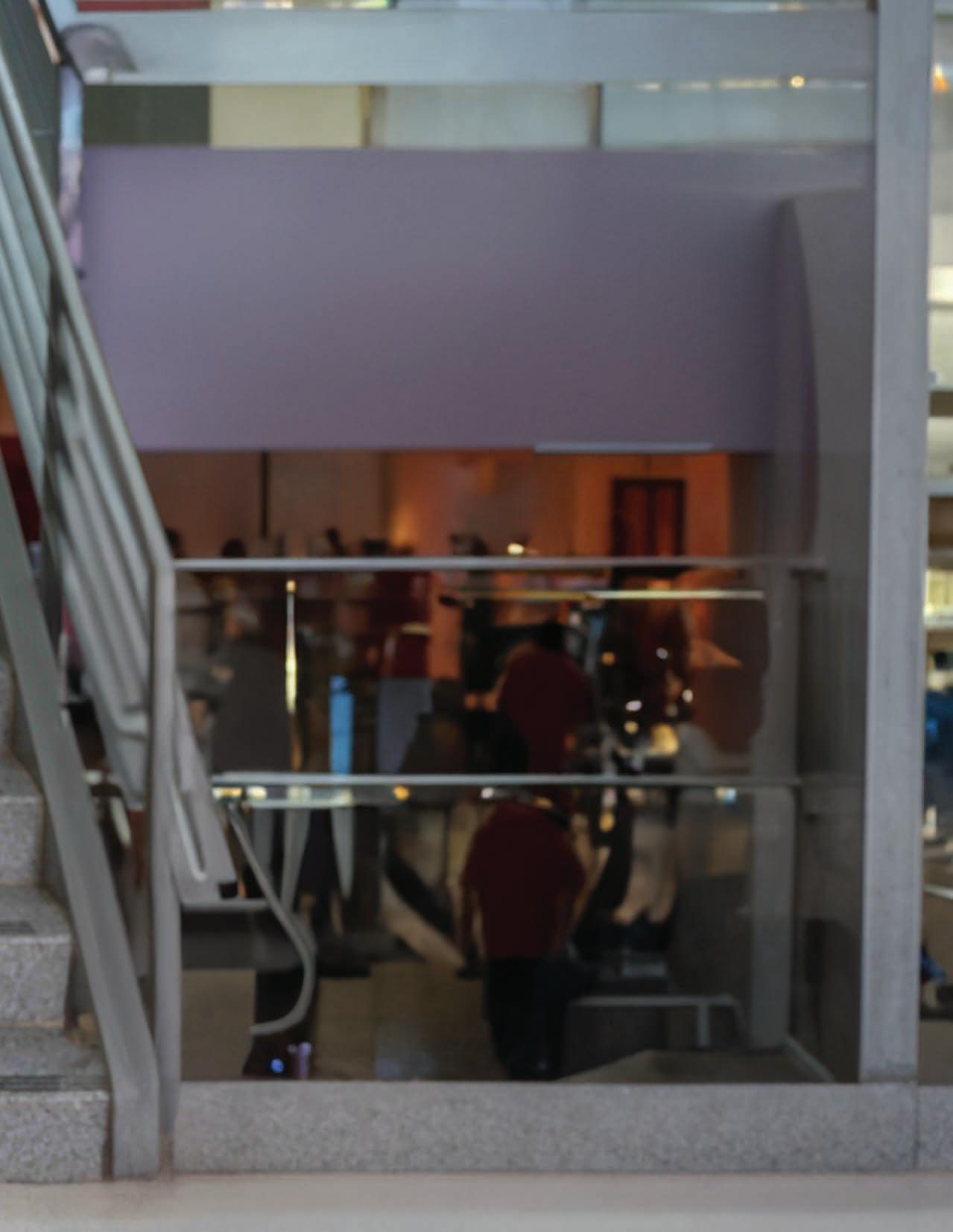
The Ohio State University
Professor Wendy G. Smooth is The Ohio State University’s senior vice provost for inclusive excellence. She is also a professor in the Department of Women’s, Gender, and Sexuality Studies, with courtesy appointments in the Department of Political Science and the John Glenn College of Public Affairs.
In her role as senior vice provost, Professor Smooth provides institutional leadership, vision, and strategic direction to advance a culture of inclusion, ensuring that all faculty, staff, students, and stakeholders can belong, fully participate, and thrive. She leads initiatives that reflect the university’s commitment to shared values, including excellence, diversity, inclusion, equity, compassion, and respect.
Smooth collaborates with institutional leaders to integrate inclusive excellence into the university’s core functions of teaching, research, outreach, and engagement.
She oversees the Office of Diversity and Inclusion and the Kirwan Institute for the Study of Race and Ethnicity, focusing on education, prevention, and research.
Before joining the provost’s office, Smooth served as associate dean for diversity, equity, and inclusion for the College of Arts and Sciences. In this role, she led the college’s inclusive excellence vision, supporting initiatives across 38 departments and research centers. She implemented inclusive practices throughout the academic lifecycle, including faculty recruitment, retention, and promotion.
As a noted scholar in intersectionality and
American politics, Smooth is a prominent voice on the experiences of women of color in political institutions and issues affecting them in public policy. Her funded research projects examine girls of color and their interests in political leadership, as well as the growth of women of colorled organizations linking communities to the democratic process. She frequently comments and consults on issues impacting Black women in electoral politics as both voters and candidates.
Smooth is a former president of the National Conference of Black Political Scientists, a 50-year-old organization dedicated to political scientists in academia and policy-related fields. She champions girls of color in developing leadership skills and finding their voices. She was appointed as one of 25 commissioners to the Columbus Commission on Black Girls, which assesses the quality of life for Black girls in Columbus, and continues to support this work as an advisory council member. Additionally, she serves on the board of Beautifully Flawed, a nonprofit organization that helps girls and LGBTQIA+ youth heal and grow.
Professor Smooth earned her bachelor’s degree in political science from Xavier University of Louisiana and her master’s and PhD in government and politics, along with a certificate in women’s studies from the University of Maryland, College Park. She is a member of Alpha Kappa Alpha Sorority, Incorporated, Alpha Sigma Omega Chapter, and is a native of Jackson, Mississippi.
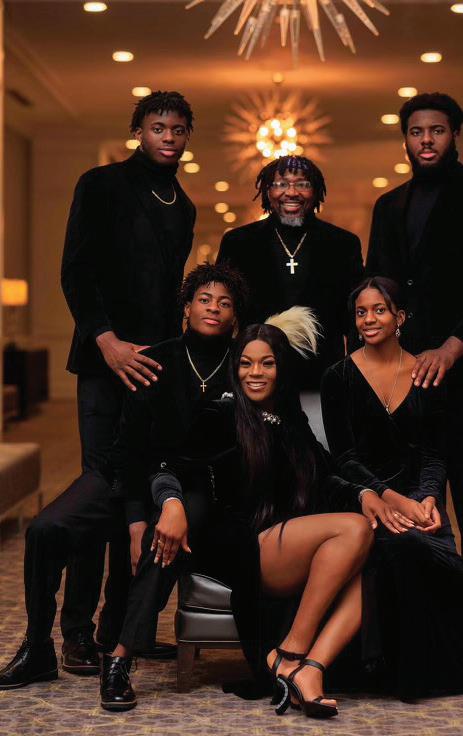
Emmanuel “E-Doggy” Ezirim is the Owner and CEO of Central Point Pharmacy, a communityfocused pharmacy in Columbus, Ohio, specializing in clinical care and immunizations. His dynamic career spans various roles within pharmacy, including Pharmacist-in-Charge, Director of Pharmacy, and Independent Pharmacy Owner. Ezirim’s commitment to community health is reflected in his innovative approaches to pharmacy practice and patient care.
Beyond his pharmacy expertise, Emmanuel is a multifaceted individual with accomplishments as an athlete, author, actor, bodybuilder, and philanthropist. He was a four-year varsity soccer player at The Ohio State University (OSU) and authored the children’s book Jet-Black and the Ebony Knights. His diverse interests and achievements underscore his versatile nature and dedication to personal and professional growth.
Ezirim is a co-founder of the Nigerian Association of Pharmacists and Pharmaceutical Scientists in the Americas (NAPPSA), where he has played a pivotal role in fostering professional development and community engagement among Nigerian pharmacists in the U.S. He has served on the NAPPSA board and various committees since its inception in 2006, championing initiatives such as the NAPPSA Business-to-Business (B-2-B) Network and the NAPPSA Scholarship Awards program. Under Emmanuel’s leadership, the B-2-B initiative has
generated over $150,000 annually for NAPPSA.
Emmanuel’s commitment to education and equity is exemplified by his sponsorship of endowment funds at OSU’s College of Pharmacy, including the Emmanuel Ezirim E-Doggy-Dog and Chichi Ezirim Scholarship Fund and the Just Us Endowment Fund, aimed at promoting diversity in pharmacy education. His contributions to the field have earned him accolades, including the OSU College of Pharmacy Distinguished Alumni Award in 2020.
As a recognized leader in the pharmacy community, Ezirim has been instrumental in various health initiatives, including a response to the Ebola crisis in Nigeria and the NAPPSA COVID-19 Response Team. His extensive service and dedication to the profession have made him a respected figure within both Nigerian and American pharmacy circles.
Emmanuel continues to inspire others through his leadership, philanthropic efforts, and commitment to improving healthcare access. He was inaugurated as NAPPSA President in September 2023, a role in which he aims to further advance the organization’s mission of supporting and empowering pharmacists across the Americas.
Early voting is already underway here in Ohio. In addition to Issue 1 to ban gerrymandering and the high-profile U.S. Senate race, anyone living in the Central Ohio Transit Authority (COTA)’s service area will vote on a more local issue that has gotten less attention: LinkUS, an initiative to improve public transportation throughout the region. Passage would result in a permanent sales tax, but it’s a price Columbus must pay.
One doesn’t need to be a transit expert to know Columbus is woefully behind. 63% of jobs in Columbus take more than 90 minutes to reach from lower-income neighborhoods. A 2023 study from the Ohio State School of Engineering found that Columbus was the largest city in the country and the ninth largest in the entire world without a passenger rail system. Columbus is also the largest city in the country without bus-rapid transit (BRT),
By Morgan Harper
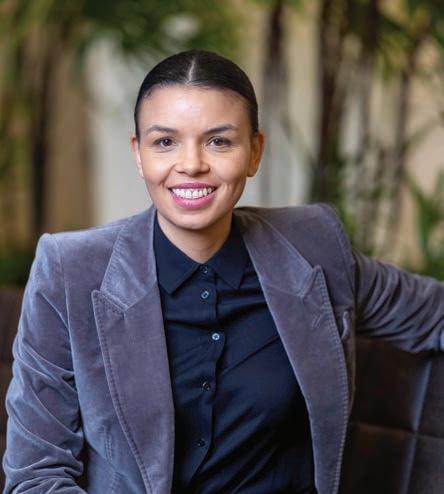
a high-capacity bus-based transit system meant to deliver fast, reliable service. Cleveland, for example, installed a BRT line in 2008.
The LinkUS initiative would start closing this extensive transit gap. Though LinkUS does not include any passenger rail plans, it would install the first BRT system in Columbus with dedicated bus lanes in the center of certain streets running every fifteen minutes, saving passengers 25% in time-savings versus regular service lines. LinkUS would fund the building of five BRT routes in total, and three by 2030. The first would run from Prairie Township to Downtown Columbus. The second would run along E. Main St. from the Arena District to Reynoldsburg, and the third would run from Northwest Columbus to Dublin. LinkUS would increase existing bus service by 45%, improve bus stop access, build out bike trails, and expand COTA/Plus service that provides door-to-door ride service for residents. Sales taxes will increase by 0.5% to help cover the costs.
Experts agree every $1 invested in public transportation leads to $4 of economic activity. But just building bus routes will not be enough. Franklin County is expected to add hundreds of thousands more residents over the next two decades. If each newcomer and existing resident continues to rely solely on cars, traffic congestion will increase as the city’s air quality declines. To manage future growth and ensure everyone in the region gets to be a part of it, we all need to become better consumers of public transportation. So vote yes on LinkUS in November, but also commit to actually riding the buses when they’re ready.
“This column is dedicated in loving memory of Dr Marion Causey, Jr.”
Childhood obesity is a serious condition where a child has excess body fat that negatively affects their health. It occurs when a child’s weight is much higher than what’s considered healthy for their age and height. This issue is not just about weight; it impacts a child’s overall well-being, increasing the risk of serious health problems like type 2 diabetes, high blood pressure, and heart disease.
Obesity affects children’s physical, emotional, and mental health. It can lead to breathing difficulties, sleep problems, and reduced ability to keep up with peers. Children struggling with obesity may face low self-esteem, bullying, and depression. If not addressed early, these issues can persist into adulthood, potentially causing lifelong health challenges.
According to the Centers for Disease Control and Prevention (CDC), nearly 1 in 5 children in the U.S. are obese. In Ohio, approximately 18% of children are considered obese, higher than the national average. Columbus mirrors these trends, with obesity rates particularly high in communities of color due to limited access to healthy foods and safe spaces for physical activity.
Preventing and managing childhood obesity requires effort from homes, schools, and communities. Here are some effective strategies:
1. Promote water consumption: Encourage children to choose water over sugary drinks.
2. Encourage healthy eating: Teach kids about nutritious foods and offer balanced meals.
3. Increase physical activity: Incorporate more movement during the school day through sports, recess, or classroom breaks.
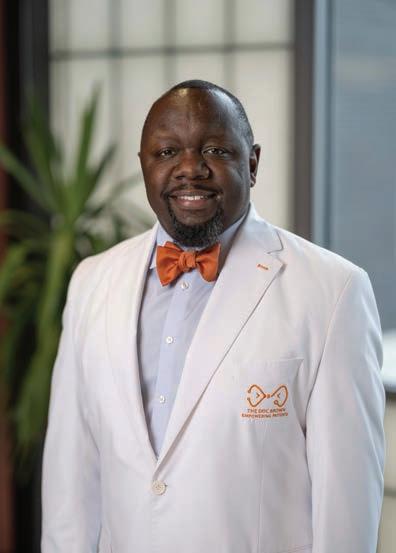
By Christopher Brown MD, MPH, FACP
4. Limit screen time: Encourage less time on electronic devices and more time moving.
5. Lead by example: Adults should model healthy behaviors for children to emulate.
If left unaddressed, childhood obesity can lead to severe long-term consequences. Obese children are more likely to become obese adults, facing higher risks of heart disease, diabetes, and certain cancers. Beyond physical health, obesity can limit opportunities, affect social interactions, and reduce overall quality and length of life.
By taking action now, we can support a healthier future for our children. Let’s work together as educators, parents, and community members to create environments where healthy choices are the easy choices, ensuring our children have the best chance to thrive physically, mentally, and academically.


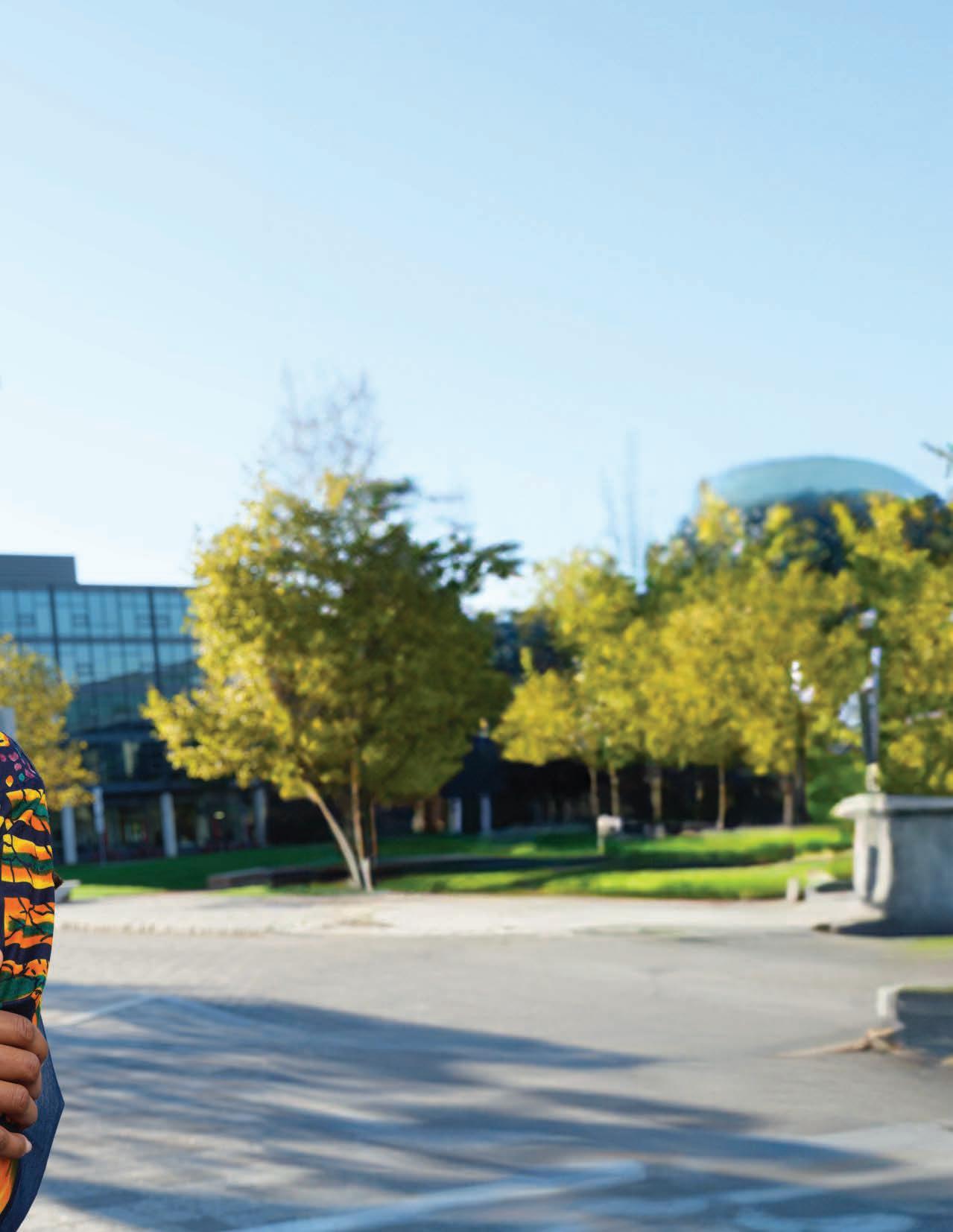
Dr. Alice Ragland
Assistant Professor, Department of Liberal Arts Columbus College of Art and Design
Dr. Ragland holds a Ph.D. in Multicultural and Equity Studies in Education from The Ohio State University, with a graduate minor in Black Studies. As an assistant professor in the Department of Liberal Arts at the Columbus College of Art and Design, she teaches courses on diversity, social justice, and equity. Dr. Ragland is committed to making complex social justice concepts accessible and bridging the gap between theory and practical, real-world applications in both academic and community spaces.
Her research focuses on contemporary and historic Black activism in Ohio, and she is currently conducting an oral history project on the Black Lives Matter Movement in Ohio. She is also the coeditor of the forthcoming book Racial Code Switching in Education, which examines the intersection of race and identity in educational contexts.
Beyond her academic work, Dr. Ragland co-directs Empowering Young Voices, a program that provides girls with access to arts and creativity education they might not otherwise receive. She is also the co-leader of the Black Woman Think Tank, a supportive, sacred space for Black women in social justice work.
Through her freelance diversity, equity, and inclusion work, Dr. Ragland conducts workshops that foster understanding of racism and other forms of systemic oppression, helping organizations develop protocols to create safer spaces for marginalized groups. Her approach integrates historical context with actionable strategies for fostering inclusivity and driving systemic change.
What sets Dr. Ragland apart is her ability to weave together academic research, community activism, and organizational equity work. Through her varied roles, she amplifies marginalized voices and fosters deeper understanding of social justice issues.
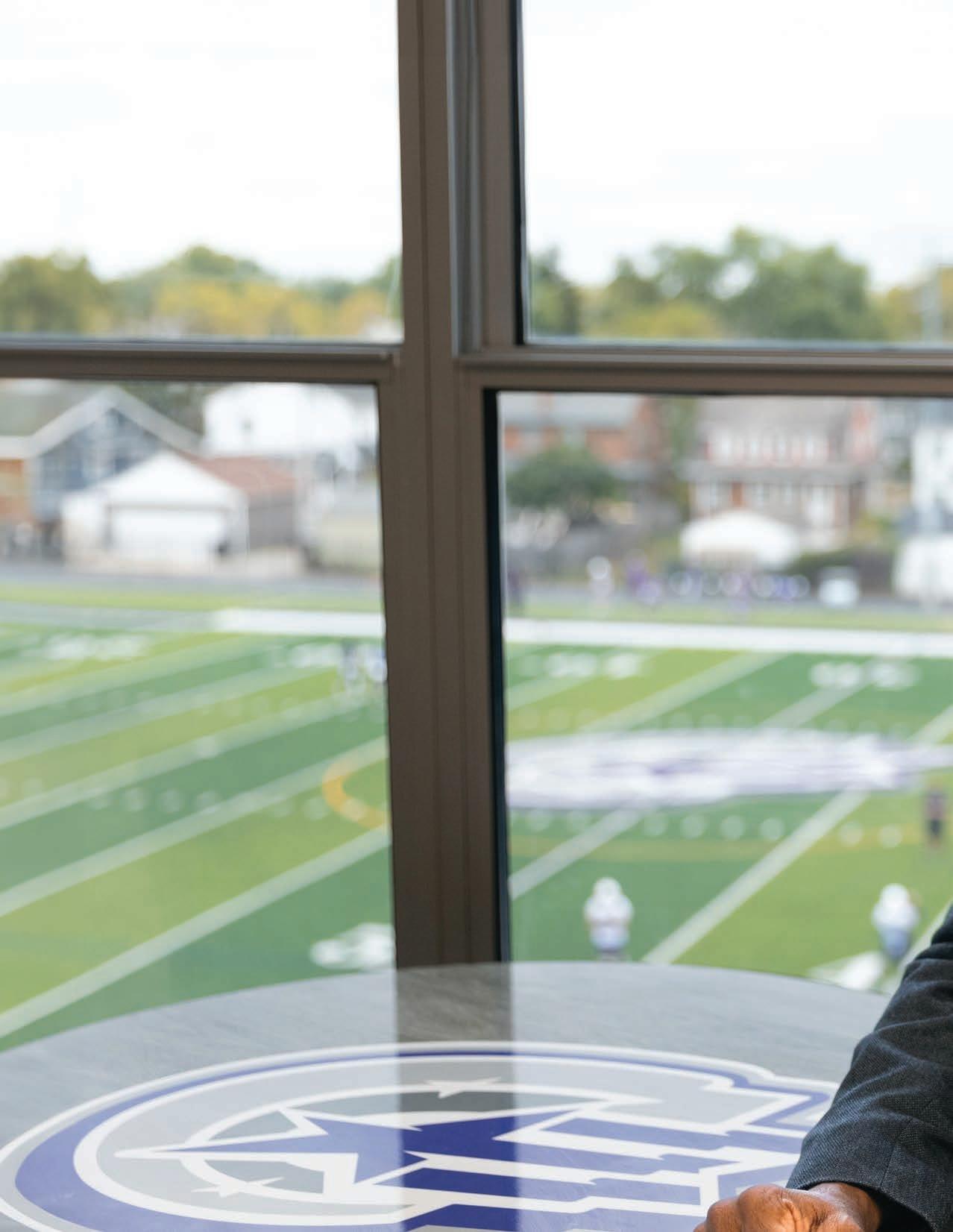
Director of Athletics and Recreation
When a student commits to playing at a Division III university, Dr. Darrell Bailey Sr. knows it’s for the love of the sport.
“Most Division III athletes most likely will not make it to the professional level. They are going to school for an education, playing a sport that they love, and anticipating life after athletics,” said Dr. Bailey, Director of Athletics at Capital University.
“Capital’s student-athletes have a willingness to learn more and do more,” he said. “We are here to support them through the successes and failures of athletics, and to equip them with the tools they need to be successful in life.”
Dr. Bailey came to Capital in 2022 from California State University East Bay, an NCAA Division II program, where he served in several roles, including Athletic Business Manager, Assistant Athletic Director for External Operations, and Assistant Athletics Director for Development.
“Capital’s Athletics Department has three key standards at the forefront: setting a standard, providing the best possible student-athlete experience, and creating a winning culture,” Bailey said.
“Our student-athletes have a willingness to learn more and do more because they know we are mentoring them to be successful in the next stage of their life. We develop them to be confident in their goals and intentions.”
During Dr. Bailey’s first year at Capital, the Comets won Ohio Athletic Conference championships in women’s soccer and women’s lacrosse. In addition to team success, Capital celebrated the achievements of two individual AllAmericans, one Academic All-American,
and several other All-Region, AllConference, and Academic Award winners.
Administratively, Dr. Bailey led initiatives in continuing to rebrand The Capital Center athletic facility and a complete overhaul of the playing surface in Bernlohr Stadium.
Before entering collegiate athletics, Dr. Bailey served in many roles for the City of San Diego, including as a Contract Administrator, an Associate Management Analyst, and a Senior Management Analyst. While living in the San Diego area, Bailey also served as an Assistant Basketball Coach with Mater Dei Catholic High School.
He served in the United States Air Force for nine years before kick-starting his professional career. While serving, Bailey participated in the Military Athletics program, coaching and playing in various sports and recreation events.
He earned a bachelor ’s degree in business management and marketing from the University of Phoenix, a Master’s degree in Sports Management from the United States Sport Academy, and a Doctorate degree in Philosophy in Education with a specialization in Sports Management from Northcentral University.
Professionally, Dr. Bailey is a member of numerous professional development associations, including the National Association of Collegiate Directors of Athletics, National Association of Division III Athletic Administrators, National Society of Leadership and Success, the Minority Opportunities Athletic Association, among others.
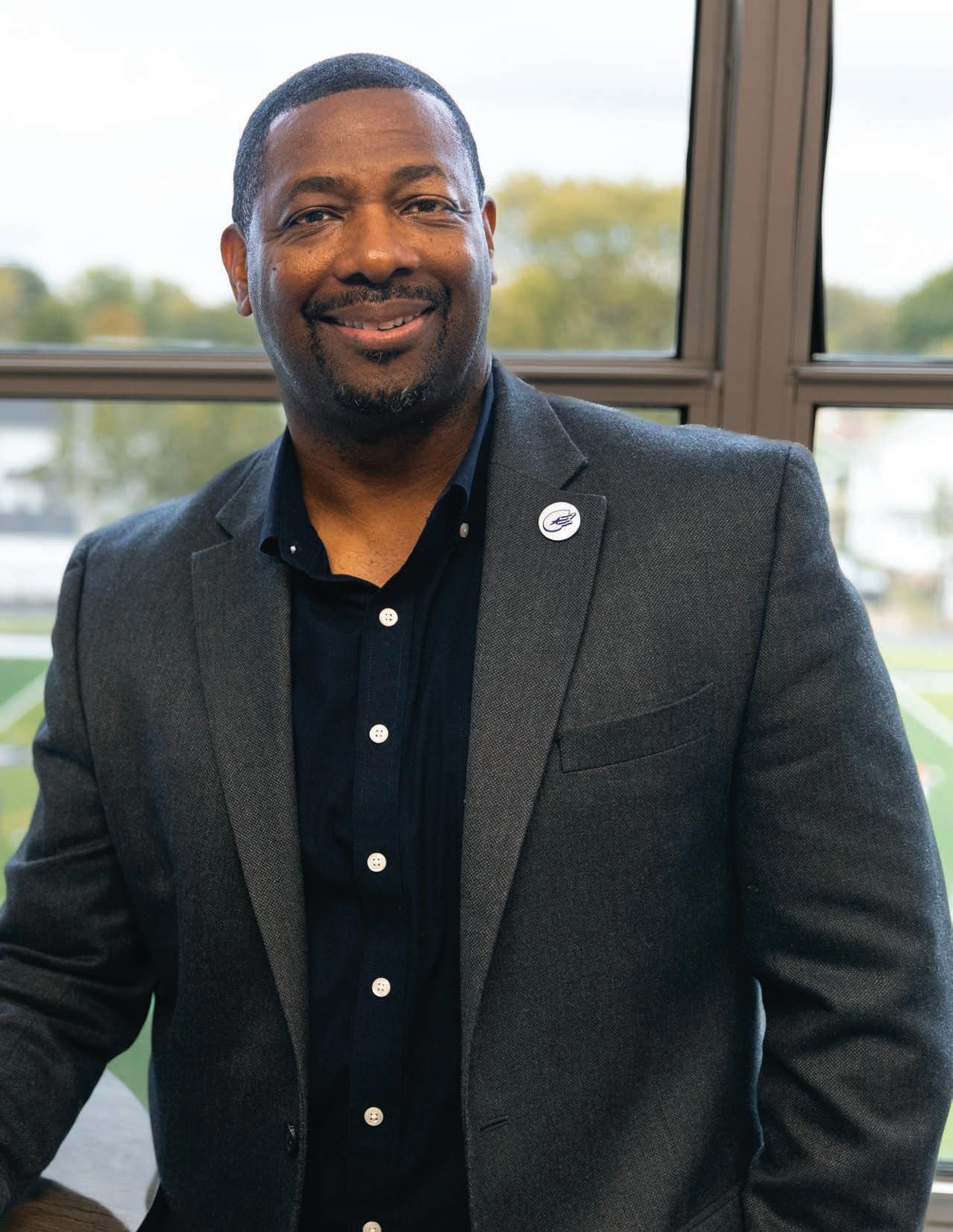


Dr. Keith M. Bell Sr. Director of Leadership Services –Educational Service Center College of Education and Human Ecology The Ohio State University
Dr. Keith M. Bell, Sr. is currently Director of Leadership Services for the Educational Service Center (ESC) of Northeast Ohio, Instructional Coach for Advancing & Improving Principal Leadership through The University of Cincinnati (AIPL) and originator & facilitator of THE Ohio State University Student Leadership Research Collaborative (OSU SLRC). This initiative supports student achievement through research, leadership and advocacy for students in central & southeast Ohio. Dr. Bell is also Instructional Coach for SchYPAR (School Based Youth Participatory Action Research) that, through the U.S Department of Education is exploring how Youth Participatory Action Research can be integrated into secondary classrooms in Ohio.
Dr. Bell served as Superintendent of the Euclid City Schools from 2012-2016. From 2010-2012 Dr. Bell was the Deputy Superintendent/Chief Academic Officer for Columbus City Schools. He also served as the Secondary Director/Academic Affairs and Principal at Westerville South High School from 2004-08. Additionally, in his fourth year as principal (2007-08) South was awarded the distinction as one of the of top 400 High Schools in the country (US News & World Report and Newsweek).
From 2000-2004 Dr. Bell was the first principal of color in a suburban school district when he accepted the position at Groveport Madison High School. Prior to that he was assistant principal @ Gahanna Lincoln High School from 1993-2000. He began his career in education as a marketing education teacher and became the first head basketball coach of color in
a suburban school district (Ohio Capital Conference OCC) at Grove City High School in 1988, leading the Greyhounds through 1993.
Dr. Bell has been a presenter at the Marketing Education National Conference, The American Education Research Association National Conference (AERA) The Ohio School Boards Association (OSBA), Council of Great City Schools, AASA Superintendent’s Association, and National Jostens Renaissance Global Education Conference. In 2022 Dr. Bell delivered the OSU, Graduate School keynote address. Additionally, Dr. Bell has presented at the Ohio State University Quantitative Methodologies Conference and National Conference on Race Diversity and Learning. He received his doctoral degree from THE Ohio State University in 2018 while serving as a graduate assistant in diversity and inclusion with the graduate school.
Dr. Bell has been inducted into three Halls of Fame’s–Woodward High School, Defiance College and Jostens Renaissance. Dr. Bell resides in Gahanna, Ohio, and is married to Toni. They have two grown sons Keith Jr. (Bowling Green) and Joshua (University of Cincinnati)

Anative of California, Maurice Stevens is Professor of Comparative Studies and Associate Dean for Engagement for the College of Arts and Sciences. Stevens teaches cultural and technological studies, and their university service spans departments, colleges, centers, and initiatives including the Kirwan Institute for the Study of Race and Ethnicity, the STEAM Factory, the University Senate, the Office of Diversity and Inclusion, Women’s, Gender and Sexuality Studies, and African American and African Studies. Stevens brings expertise in designing engaged research methods, participatory leadership processes, and community-driven social justice informed research to their scholarly and systems-enhancement efforts.
As an educator, Stevens believes that the value of education goes beyond its ability to create large-scale and revolutionary transformation; and that it is more than a way of achieving minor reform in the face of social injustice. Instead, Stevens believes that educators are responsible to invite learners to develop a critical sense of their own intellectual agency, and to encourage them to determine for themselves their social responsibility and how they will act in the world.
For Stevens, the teaching/learning experience concerns far more than classroom instruction, though instruction is an essential piece of what it means to ‘teach a class.’ Instruction must be linked to interactions and experiences in the student’s world that are important to
them, and then apply those learnings in meaningful ways both inside the classroom and out in the world because we learn best when we learn together about things that matter to us.
At the heart of Stevens’ educational practice is the assumption that students desire to develop skills that are connected to their social world and lived experiences in ways that develop critical consciousness and their ability to change society while also transforming themselves. In short, Stevens believes that educating is an opportunity for learners to creatively reimagine themselves and their worlds.
Stevens innovates in the Engagement space as well! As Associate Dean for Engagement, Stevens drives Ohio State University’s College of Arts and Sciences Signature approach to engaging with community partners in projects that address critical community needs in ways that are mutually beneficial and nourishing. Stevens calls this Regenerative Engagement and believes it is the best route to finding the more that is possible when we dream and work together.
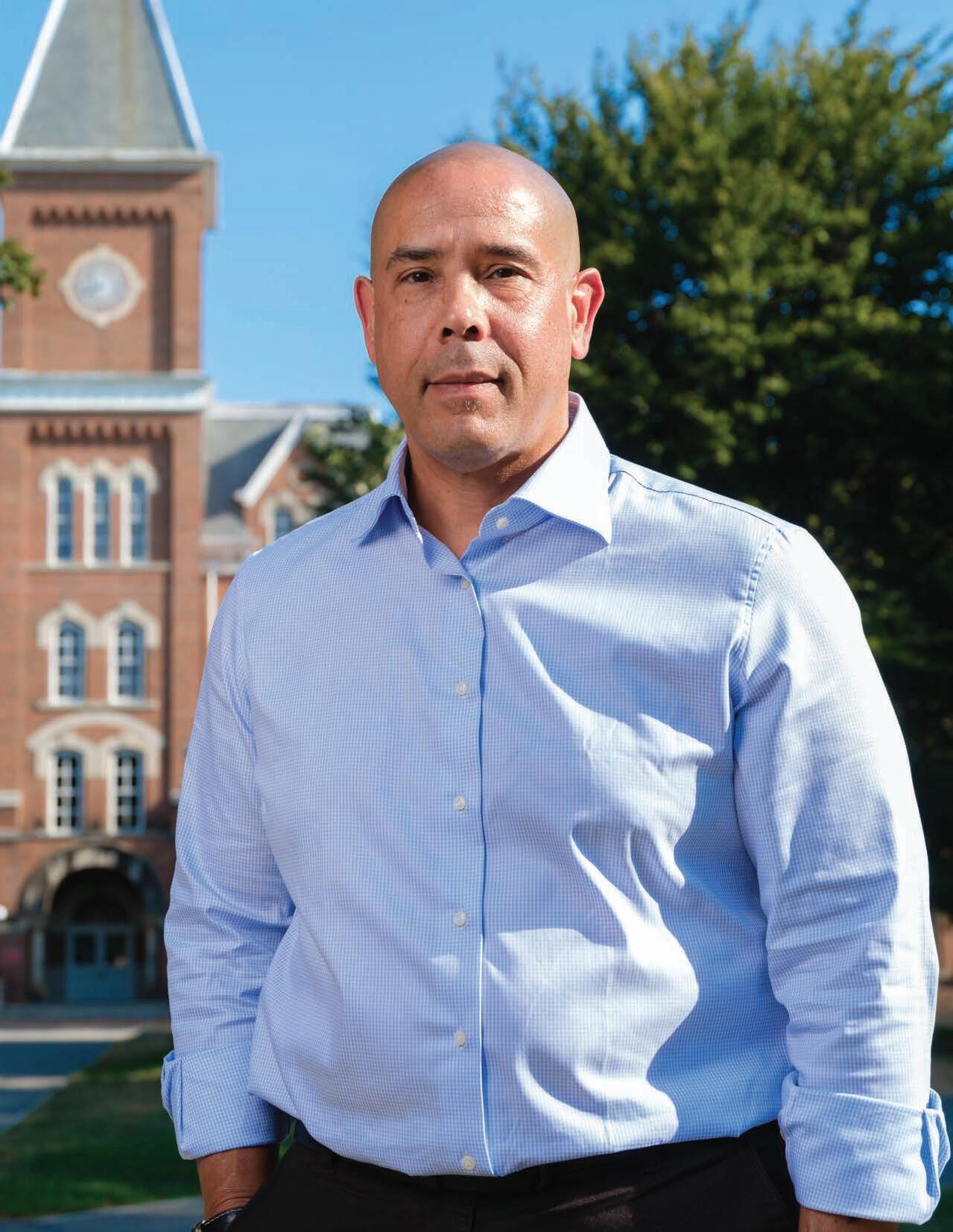


Dr. Porsche Chisley’s story is one of passion, leadership, and a relentless pursuit of excellence in education. While a native of Indianapolis, Porsche’s heart and loyalty belong to Ohio, where she fell in love with the state during her undergraduate years at The Ohio State University. Today, as the Founder and CEO of Chisley Consulting Group, Porsche is a nationally recognized advocate for high-quality education, known for her strategic insight and ability to drive transformative change in schools and organizations.
Porsche’s journey into education began in the classroom as a Teach for America corps member in St. Louis. From the start, her talent and dedication to her students set her apart. By her second year of teaching, she had already been nominated for the prestigious Sue Lehman Teacher of the Year Award, a recognition of her impact as an educator. By her fourth year, Porsche’s classroom boasted the highest English Language Arts proficiency rates across her charter school network, demonstrating her ability to elevate student achievement. She was quickly entrusted with leadership roles, serving as Grade Level Chair and a key member of the Building Leadership Team, where she shaped instructional strategies and influenced school culture.
Later, Porsche’s ambition to make an even greater impact on the education system led her to pursue leadership beyond the classroom. She took on roles as Director of Data and Academic Coach at a Columbus-based charter school, where her strategic approach to data-driven instruction resulted in dramatic improvements—raising the school’s state report card rating by two letter grades within just two years. Her success caught the attention of the Ohio Department of Education, where she became an Education Program Assistant, supporting charter school authorizers across the state. Soon after, Porsche led school improvement efforts for one of Ohio’s largest charter authorizers, overseeing the academic success of over 13,000 students. Under her guidance, the authorizer achieved the coveted “exemplary sponsor” rating—the highest distinction in the state.
Porsche’s entrepreneurial spirit and belief in the power of public-private partnerships inspired her to launch Chisley Consulting Group in 2015. Since then, she has worked with schools and organizations nationwide, helping them align their mission, vision, and values with actionable
strategies. Specializing in strategic planning, systems design, implementation and leadership development, Chisley Consulting Group has become a trusted partner in driving meaningful change in the education and nonprofit sectors.
Porsche’s expertise and influence extend beyond consulting—she is a proud Cambiar Catalyst Alum, a Black Leadership and Legacies Fellow, and a Mitch Daniels Leadership Foundation Fellow.
One of Porsche’s most notable achievements was spearheading the launch of the Indiana Learning Lab, a groundbreaking $1.6 million initiative that provided essential resources to educators and families transitioning to remote learning during the COVID-19 pandemic. Her leadership was instrumental in supporting the educational community during one of the most challenging times in modern history. Porsche’s vision and ability to mobilize resources on a large scale was also evident in her leadership of the Charter Schools Program Grant (CSP) writing process for the state of Indiana, resulting in an unprecedented $109 million award—the largest CSP grant in the country.
Porsche’s commitment to education extends into her service as well. She currently sits on the Board of Directors for Purdue Polytechnic High School, the Center for Innovative Education Solutions, and the YMCA’s Youth Advisory Council, where she continues to influence education policy and innovation. Additionally, Porsche serves as the Academic and Accountability Coach for Educational Resources Consultants of Ohio (ERCO), the state’s only Black-owned and Blackled charter authorizer. In this role, she ensures that ERCO-sponsored schools are continuously improving and providing high-quality education to students and families.
With a career defined by innovation, impact, and a deep belief in the power of education to change lives, Dr. Porsche Chisley has positioned herself as a trailblazer in the field. Her dedication to empowering schools and organizations with the tools they need to succeed has made her an invaluable leader in the national education landscape. As Porsche continues to champion equity and excellence in education, her influence will undoubtedly shape the future for generations to come. In her day-to-day work, she hopes to help organizations “Build Capacity and Chase Impact.”
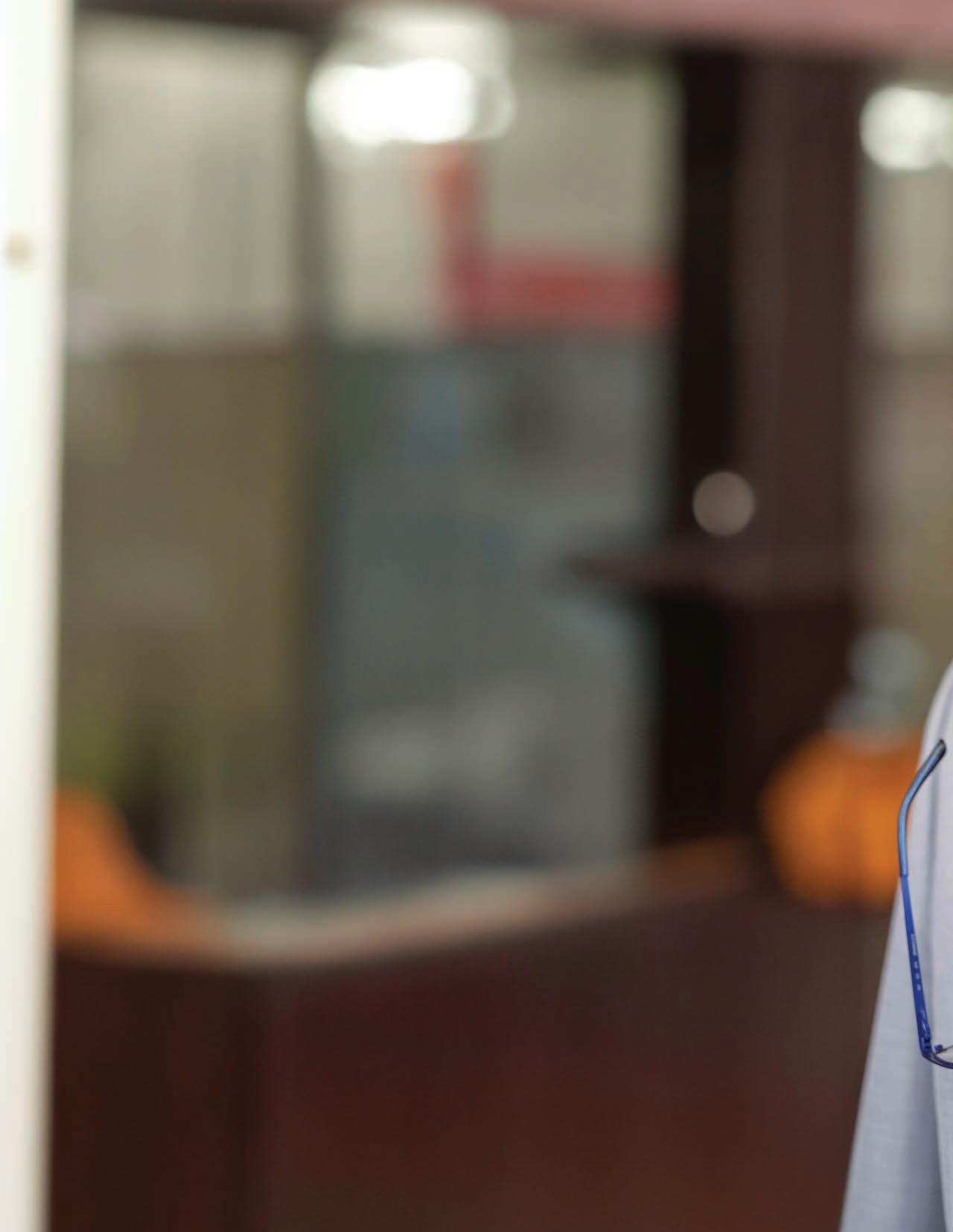
Dr. Robert L. Murphy CEO/Founder
Dr. Robert L. Murphy is the CEO/Founder of The Masters Preparatory Academy (MPA) a proposed single gender boarding school designed to meet the social, emotional, cultural, and academic needs of African American young men, grades 7-12. During his over 40 years in education, he has held leadership roles in parochial, private, and public schools. From 1981 to 1985, he served as an Art teacher and coach at Bishop Ready High School and helped expand the Art program and assisted the football team in winning the state championship in 1984. From 1985 to 1987, he was Art teacher and coach at The Columbus Academy when it was still an all-boys academy. Dr. Murphy moved to Columbus City Schools (CCS) in 1987 and was Art teacher and coach until 1993 when he became a high school assistant principal. From 1997 to 2002, he served as the Director of Christian Education for World Harvest Church overseeing the operation of the Pre K-grade 12 academy and the two-year Bible College. From 2002 to 2012, he served as a high school principal in Columbus City Schools and an adjunct professor at Ohio Dominican University. Dr. Murphy retired from Columbus City Schools in 2012, but continued to serve the district as a part-time hearing officer from 2013 to 2019; excluding the 20142015 school year when he served as the Interim Director of School Leadership Development. He currently serves in the superintendent’s office as the district Ombudsman.
Dr. Murphy received his B.A. in Art Education from The Ohio State University, where he was also a member of the OSU football team. He received his M.A. in Educational Administration from the University of Dayton and his Ed. D in Educational Administration from Ohio
University. Dr. Murphy’s doctoral research was focused on the impact of single gender schools on the social, emotional, and academic progress of low income African American males. He is deeply committed to expanding the educational opportunities for African American males through the creation and expansion of single gender schools and he continues that work today with the development of The Masters Preparatory Academy. Dr. Murphy’s work with MPA is enhanced by his work with The Ubuntu Leadership Institute, which is a hybrid program for African American high school boys, beginning with an intensive two-week residential program on the Ohio State University campus and continuing throughout the school year with virtual and in person programming. The goal of the program is to enhance the participants’ character development, critical thinking, problem solving, and service to others.
Prior to enrolling at The Ohio State University, Dr. Murphy served in the United States Marine Corps. He completed a tour of duty in Vietnam where was the leader of a combat squad and the recipient of two Purple Hearts as a result of being wounded in action.
Dr. Murphy has been married to his wife Carolyn Murphy for 47 years. They have a son and a daughter and seven grandchildren.
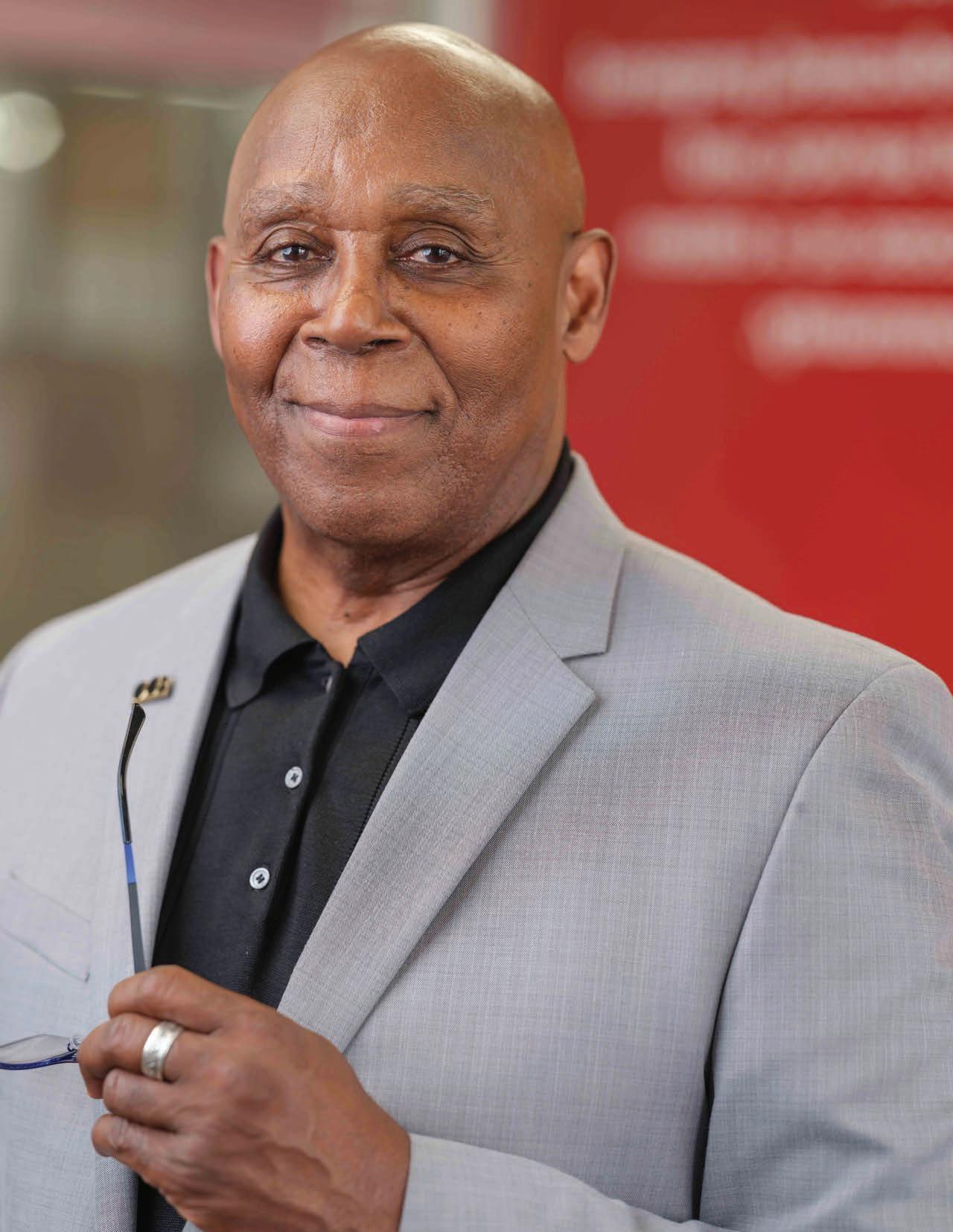
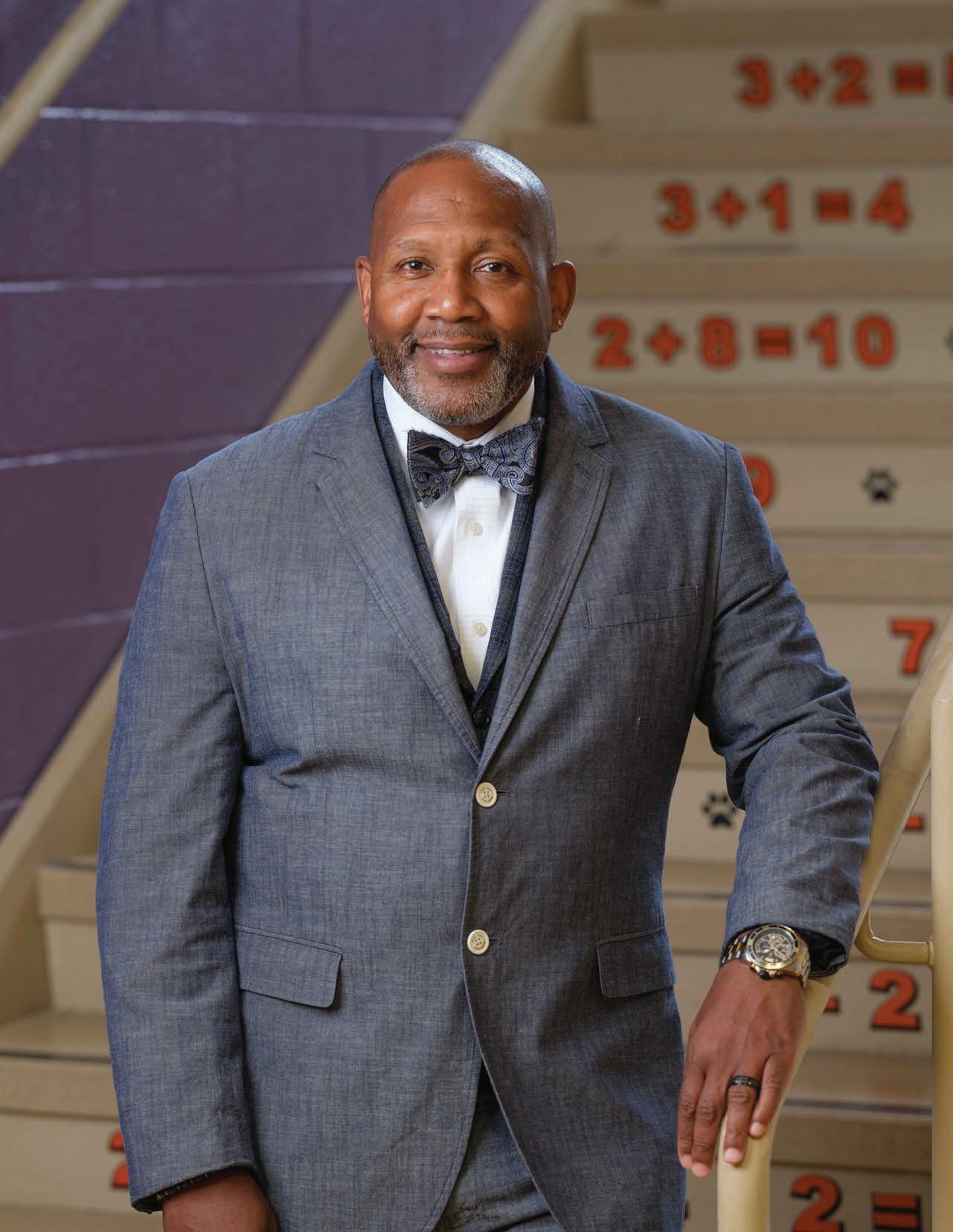
PHOTOGRAPHY
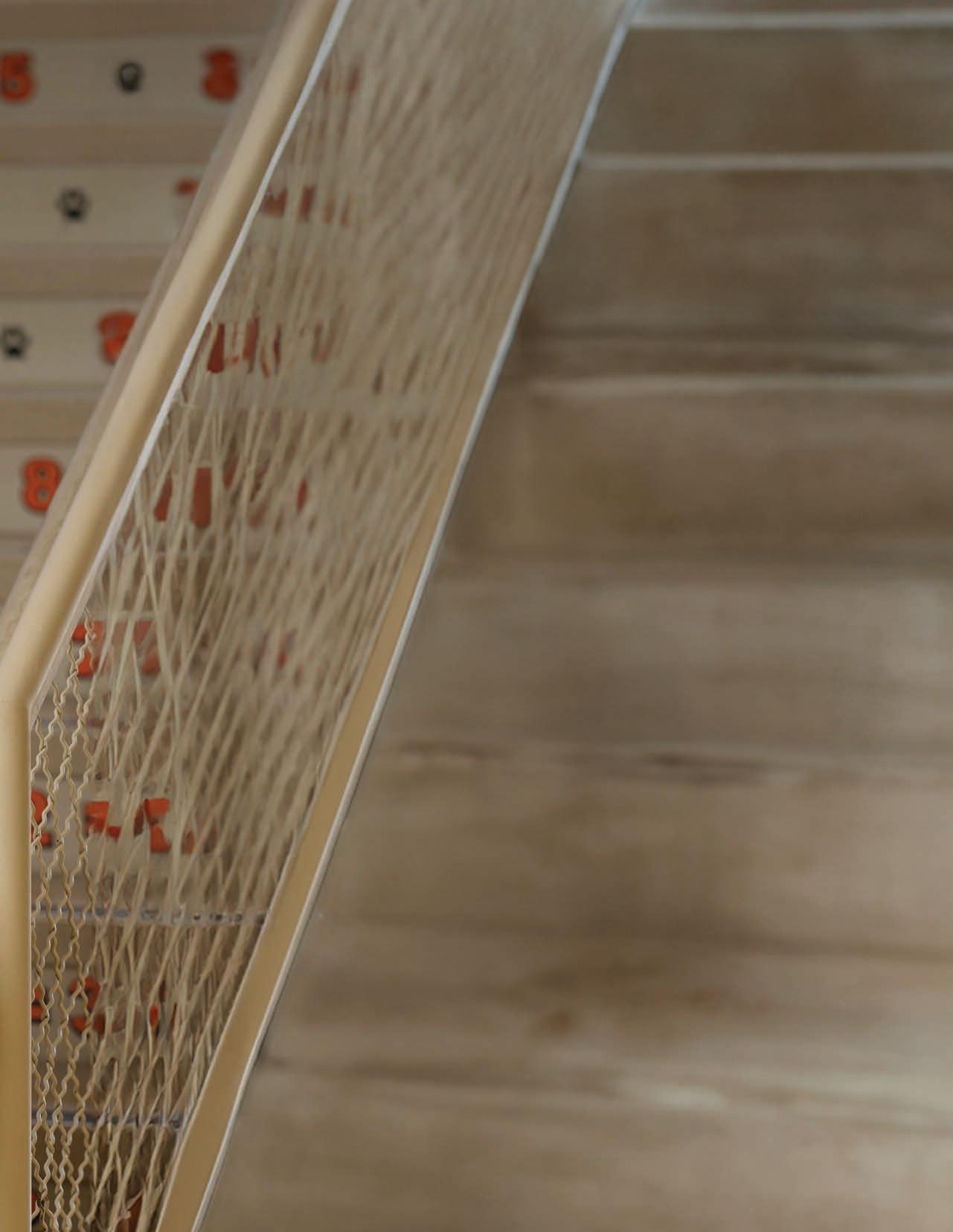
Dr. Sandy D. Womack Jr. Area Superintendent, Region III Columbus City Schools
Region III of Columbus City Schools contains 19 schools and over 6500 students. Dr. Womack and his team instituted an elementary intramural sports league. The league brought together over one thousand parents weekly and focused on developing student-athletes and community partners. All 14 elementary schools participating met yearly growth on the state report card. Dr. Womack was the Director of Curriculum and Instruction, Principal Leadership and Development, and Leader of the Equity Task Force in Cleveland Heights. He served in four of Ohio’s Big Eight Districts. Sandy taught in the Cleveland City Schools, served as an African American Studies teacher and administrator in the Akron Public Schools, and led Canton, Ohio, as the Director of School Improvement and Director of Pupil Services. Dr. Womack was one of the first principals in Ohio to move a school’s rating from Academic Emergency (F) to Effective (B) status and out of School Improvement Year 8. He graduated from Mt. Union College, The University of Akron, and Ashland University. His mantra for change is, “Exposure Changes Expectations but Experiences Change Lives.”
Dr. Womack is the author of four books, which include Even the Best of Plans Go Astray, Creating Successful Urban Schools; The Urban Educators Month by Month Guide to School Improvement, Creating Successful Urban Schools; The Leadership Manual and his dissertation titled Sanctions; Exploring The Perceptions of Urban School Principals on NCLB; After Successfully Turning Around a Low Performing School. His expert opinions
on education and culturally related issues are published in national publications, including School Administrator, Education Week, Principal Leadership, and the online periodical Education Dive. He can be heard on worldwide podcasts addressing race, education, and equity issues.
Dr. Womack is the husband of Dr. Monica Womack and father of US Air Force SSGT Alexis Mayle, OSU graduate Imani Womack, and H.S. Senior Nia Womack. Dr. Womack is a real example of the quote, “It is not how you start but how you finish those counts!” The product of a singleparent home and incarcerated parent, Dr. Womack worked hard to change his circumstances through wrestling and a noquit attitude. Dr. Womack is a NCAA AllAmerican Wrestler and former president of Alpha Phi Alpha Fraternity Inc. Iota Phi Chapter at Mt. Union College. He and his fraternity brothers held the highest GPA on campus. Social
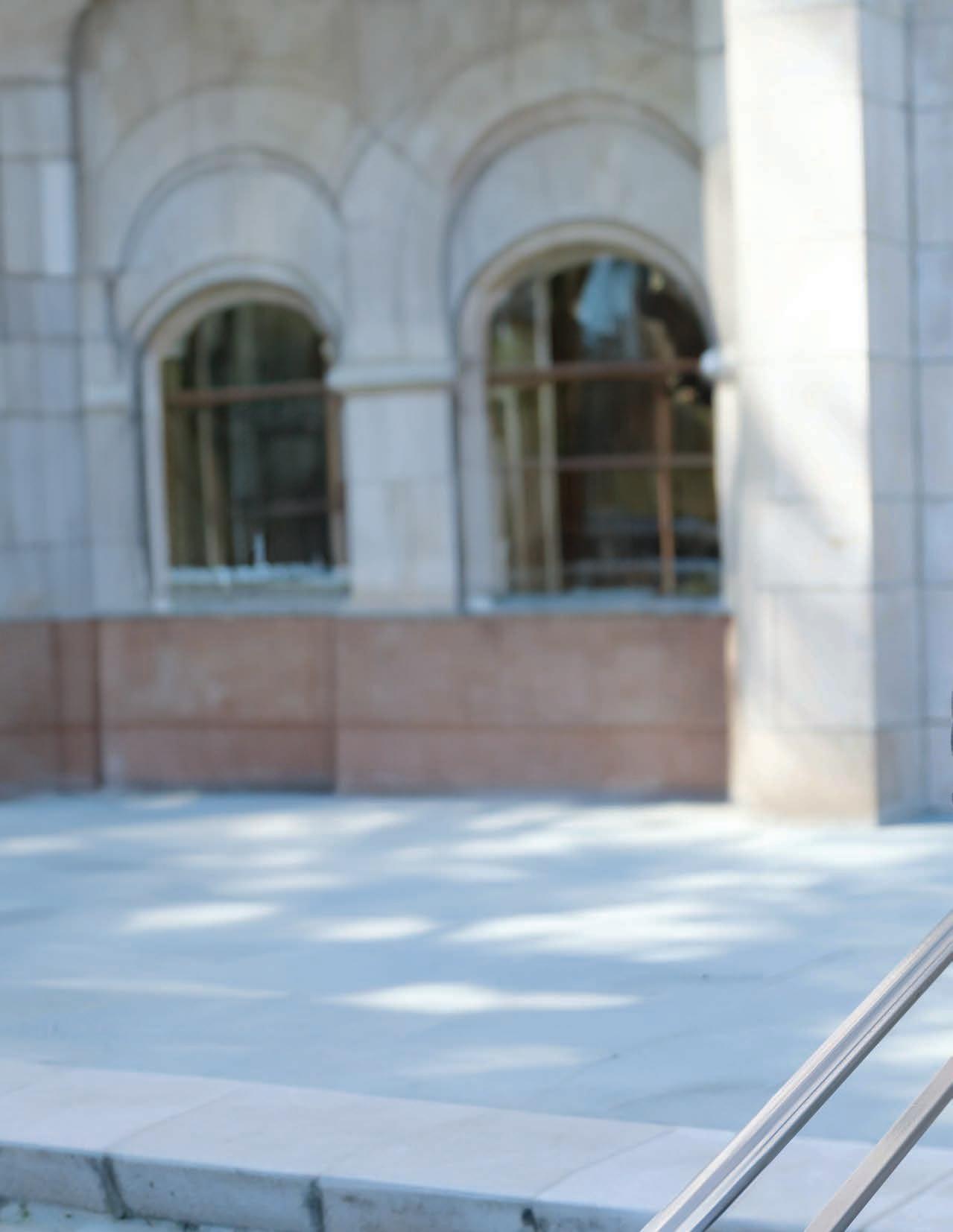
Eastland-Fairfield Career & Technical Schools
Dwight Carter is an awardwinning education leader from Central Ohio and is a proud graduate of Linden McKinley High School, Wittenberg University, and Ashland University. His personal and professional purpose is to positively change lives and impact futures. He believes reflection is at the heart of effective educators and encourages principals, teachers, and students to focus on personal skill development to create optimal learning conditions.
Because of his collaborative and innovative leadership as a principal, he earned the following accolades:
*2010-Jostens Renaissance Educator Hall of Fame
*2013-National Association of Secondary School Principals Digital Principal of the Year
*2014-Academy of Arts and Science Education High School Principal of the Year
*2015-Ohio Alliance of Black School Educators Principal of the Year
*2021-Columbus Afrocentric Early College
Sankofa Emerging Leader
During his tenure as a principal, he joined the International Center for Leadership in Education (ICLE) as a Digital Leadership and Learning Coach. He delivered keynote addresses and coached educators to explore new ways to increase rigor, relevance, and student engagement.
In 2018, he joined Dynamix to become an Effectiveness Coach. Dynamix partners with school districts to help them use various research-based processes and protocols to work more effectively and efficiently. After working full-time with Dynamix and ICLE for a year, he jumped into Career Tech Education (CTE) as an
Assistant Principal at Eastland-Career Center (ECC) in the Eastland-Fairfield Career and Technical School District (EFCTS). He spent two years in that role before becoming a member of the EFCTS Executive Leadership Team as the Director of Student Support Systems. As the director, his department is responsible for removing barriers to student learning in three main areas: culture and climate, health and wellness, and intervention services.
He is the co-author of four books: What’s In Your Space? Five Steps to Better School and Classroom Design (Corwin, 2016), Leading Schools in Disruptive Times: How to Survive Hyperchange (Corwin 2018, 2021), and Because of a Teacher, curated by George Couros (IMPress, 2022). His first solo book, Be GREAT: Five Principles to Improve School Culture From the Inside Out, was published in July 2022 (IMPress).
One of Dwight Carter’s cornerstone beliefs, echoing Dr. James Comer, is that “No significant learning takes place without a significant relationship”. This belief underscores his understanding of the crucial role relationships play in the learning process, making him a leader who truly connects with his students and colleagues.

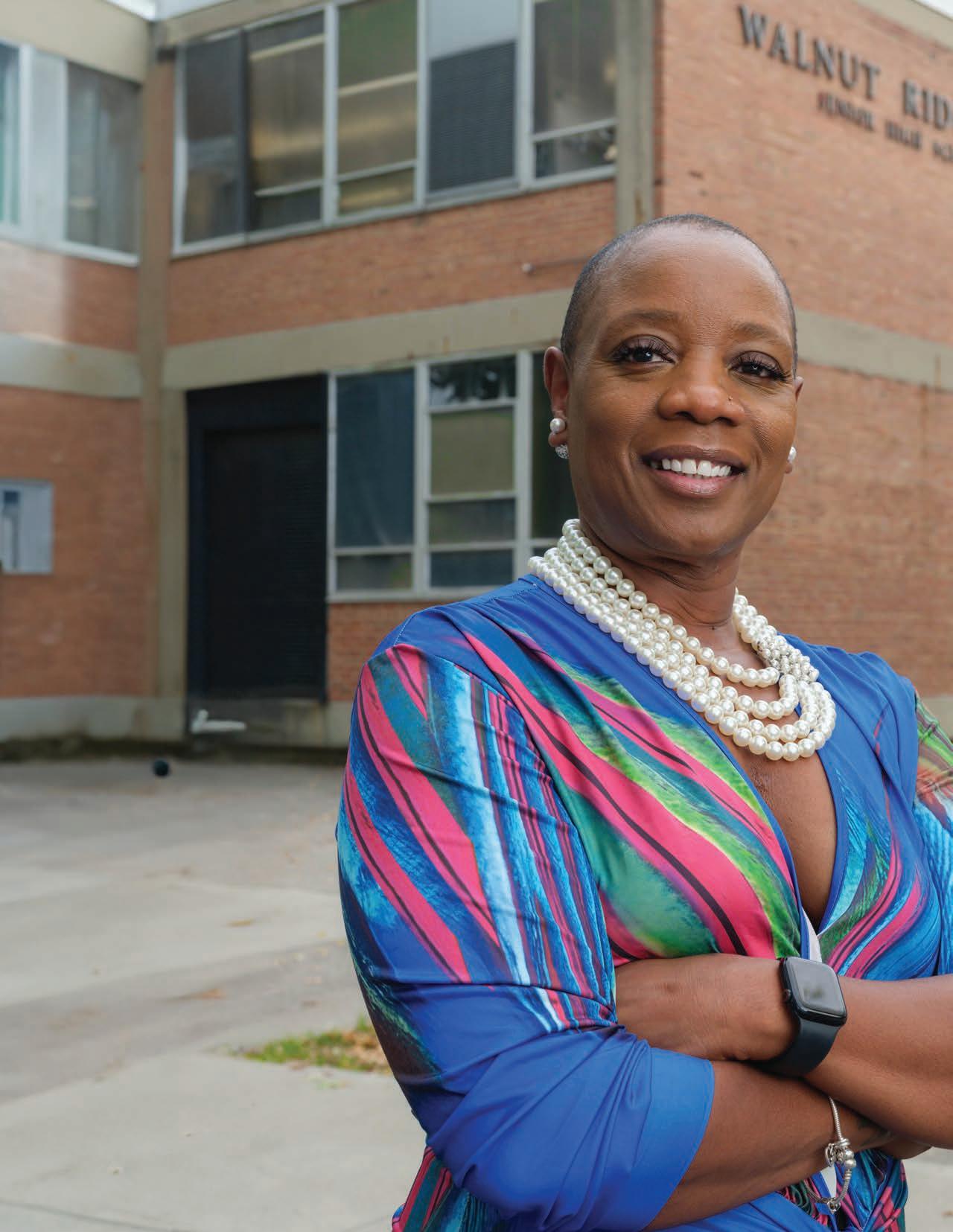

Awoman of confidence. Dr. Lisa R. Johnson is a great leader. She recently became a widow losing her lovely husband of 23 years Leroy Johnson (A firefighter).
Dr. Johnson is a proud mother of 3 adult children and nine grandchildren. Her faith and determination keep her winning in life. Dr. Johnson’s strong character allows her to face many challenges such as her struggles in school, living in foster care, and many other trials she had to overcome. Dr. Johnson enjoys her passion for teaching, tutoring, and mentoring. She has developed positive relationships with families, students, colleagues, and community leaders. Dr. Johnson believes that effective and positive relationships help with scaffolding learning in the classroom and community. Her work in the community has had a huge impact on families and students. Dr. Johnson is respected as a leader and has earned the title of peacemaker
Today, Dr. Johnson continues to strive for education such as participating in courses at Harvard University “Family Engagement”, The Ohio State University “Urban Issues in Education: Engaging in Transformation Practices” She holds many degrees: A Bachelor of Arts in Theology and History, Master of Arts in Theology and History, and a second Master of Art in Education. Dr. Johnson recently earned her Doctoral Degree in Educational Leadership. Where she researched and studied issues on High Expulsion Rates of Black Students in Elementary Schools.
Dr Johnson is a Special Education Teacher and currently serving as the Special Education teacher and Special Education
Department Chair with Columbus City Schools. She sits on the Ohio Education Association Board of Directors and Ohio Education Association Cadre/trainer. Dr. Johnson has collaborated with the Ohio Department of Education to write a curriculum for students and peace officers. She is an ambassador for children in poverty. Dr. Johnson uses education and her experiences to lead students to greatness. She shares her personal quote with students daily “The Key to Learning is Wanting to Learn” Author: Dr. Lisa R. Johnson.
Dr. Johnson is a member of the Columbus Education Association (CEA), Ohio Education Association (OEA), and National Education Association (NEA). This position allows her to advocate for teachers and students on the local, State, and National level. Dr. Johnson is the former Chairlady for the Ohio Education Association Human & Civil Rights. Dr. Johnson has demonstrated her expertise on different committees such as the Local Professional Development Committee, Contract Negotiation Committee, Evaluation Joint Committee, and various Interview Committees. Dr. Johnson completed the NEA Teacher Leadership Initiative program (TLI). She served as President of Young People Willing Workers (Y.P.W.W.) in her church and a proud member of Sigma Gamma Rho Sorority Inc. (Iota Nu Sigma Chapter) as Chaplin.

Meka stands as a transformative force in education as the Superintendent of Metro Schools, overseeing both Metro Early College High School and Metro Middle School. With 11 years of dedicated service in this role, she not only champions innovation and personalized learning but proudly holds the distinction of being the first superintendent of color in the district’s history.
As a founding member of the Metro Early College teaching team in its inaugural 2006-2007 school year, Mrs. Pace has been committed to fostering an educational environment where every student thrives. Her vision emphasizes rigorous and equitable education, ensuring that graduates are fully prepared for college and career success. Under her leadership, Metro has become an influential force in STEM education across Ohio.
Her passion for STEM education has given Mrs. Pace a platform to share her work with educators across the nation. As a Battelle Education Consultant, she has made impactful contributions in Ohio, Texas, Illinois and North Carolina on implementing STEM curricula, early college programs, and mastery learning strategies.
It has always been her desire to offer complete STEM programming for students at all levels. She will see this dream to fruition during the fall of 2025 when Metro opens its first elementary school serving student in grades K-5, making Metro a K-12 program.
Before her tenure at Metro, Mrs. Pace worked within Columbus City Schools, where she played a key role in developing successful inclusion models in both elementary and middle school settings. Her initiatives include multi-age student groupings, block scheduling, and standards-based grading. Her background also includes serving as an Intervention Specialist and TAP instructional coach.
Mrs. Pace earned her Bachelor of Science in Education from Bowling Green State University, a Master’s degree in Educational Administration from Capella University, and her superintendent’s licensure from The Ohio State University. She and her husband Will have three adult children. Through her unwavering commitment to equity and excellence, Meka Pace continues to inspire future generations of students and educators.



Dr.
Director of Diversity and Community Life
Columbus Academy
Dr. Pascal Losambe is an accomplished educator and diversity consultant currently serving as the Director of Diversity and Community Life at Columbus Academy, a position he has held since August 2022 after initially joining as a part-time diversity consultant in October 2021. With over a decade of experience in independent schools, Dr. Losambe has developed outreach and student recruitment initiatives across Columbus. His educational journey began at Middlebury College, where he earned his undergraduate degree, followed by a Master of Science in Biology focusing on Neurobiology from Boston College, where he received the Donald J. White Award for Teaching Excellence. He completed his Ph.D. in Educational Leadership and Administration at Purdue University.
Before his current role, Dr. Losambe served as Upper School Dean of Students and Special Assistant to the Head of School for Student Outreach at Columbus Academy. His prior experience includes teaching science, advising the sophomore class, and coaching track & field at the Collegiate School in Richmond, Virginia, as well as teaching at the Canterbury School in Fort Wayne, Indiana, where he also acted as diversity coordinator.
In addition to his administrative roles, Dr. Losambe is a co-founder and Chief Content Officer of Synergy Consulting Company, which focuses on diversity, equity, inclusion, and educational leadership. He has presented at national and international conferences, addressing topics such as organizational culture and cultural competence. His contributions to the United Front Initiative include serving as a keynote presenter and co-curriculum
developer, promoting regional unity and reconciliation. Along with his wife, Dr. Crystal Losambe, he co-authored the influential book “Breaking the Barriers to Belonging: United by Our Biology and Shared Humanity.”
Dr. Losambe has received numerous accolades, including the Mosaic Award in 2018. His service on the Equity and Justice Committee for the Independent School Association of the Central States and advisory boards at Purdue University highlight his unwavering commitment to fostering equity and justice in education. He and his wife have two young children, emphasizing their dedication to nurturing future generations.

Nick Jones leads as vice president of community wellness at Nationwide Children’s Hospital. Nick has been dedicated to the mission of transforming health outcomes for children, regardless of their ZIP code.
From his office at Nationwide Children’s, Nick does not have to look far to see the impact of the hospital’s work. The hospital is not just a health care provider; it is an anchor institution committed to systemic change. The Healthy Neighborhoods Healthy Families initiative, led by Nick, is a testament to this commitment. His work shows that health equity requires more than just addressing immediate medical needs; it requires tackling the broader social and economic conditions that lead to disparities.
Nick was born and raised in Columbus, where his upbringing was shaped by amazing parents and a lineage of educators and social justice activists who instilled in him a profound understanding of socio-economic diversity. His experiences with AmeriCorps, working in various recreation centers across Columbus, further deepened his empathy and commitment to community service.
Nick initially joined Nationwide Children’s Hospital in 2008 in community relations for two years. Since returning to Nationwide Children’s in 2016, Nick’s role has evolved, but his core principles remain the same: listen to the community, build trust, and collaborate as equals. He does not believe top-down solutions are the best way to build community confidence. Instead, he seeks to understand the unique needs of each neighborhood, designing interventions from the ground up.
Whether on the South Side or in Linden,
two communities with rich history and diverse needs, Nick’s approach has been to build genuine relationships. He and his team invested time in listening to residents, building intentional partnerships, and understanding their aspirations and challenges. This groundwork allowed them to tailor support that resonated with the community’s vision for their future. Whether it was enhancing access to healthy food, improving housing stability, or addressing transportation barriers, Nick’s strategy was rooted in local insights and collaborative action.
By integrating social support into healthcare, Nationwide Children’s has tackled issues like lack of access to good jobs and housing instability, which often exacerbated health challenges.
For Nick, the true measure of success is not only in improved health outcomes but in the palpable sense of agency and empowerment he sees in the communities. Nick believes that every child deserves the chance to thrive, no matter where they were born and no matter which community their family chooses to live. His vision extends beyond mere healthcare; and is about reshaping the odds and providing every child with the opportunity to pursue their dreams.
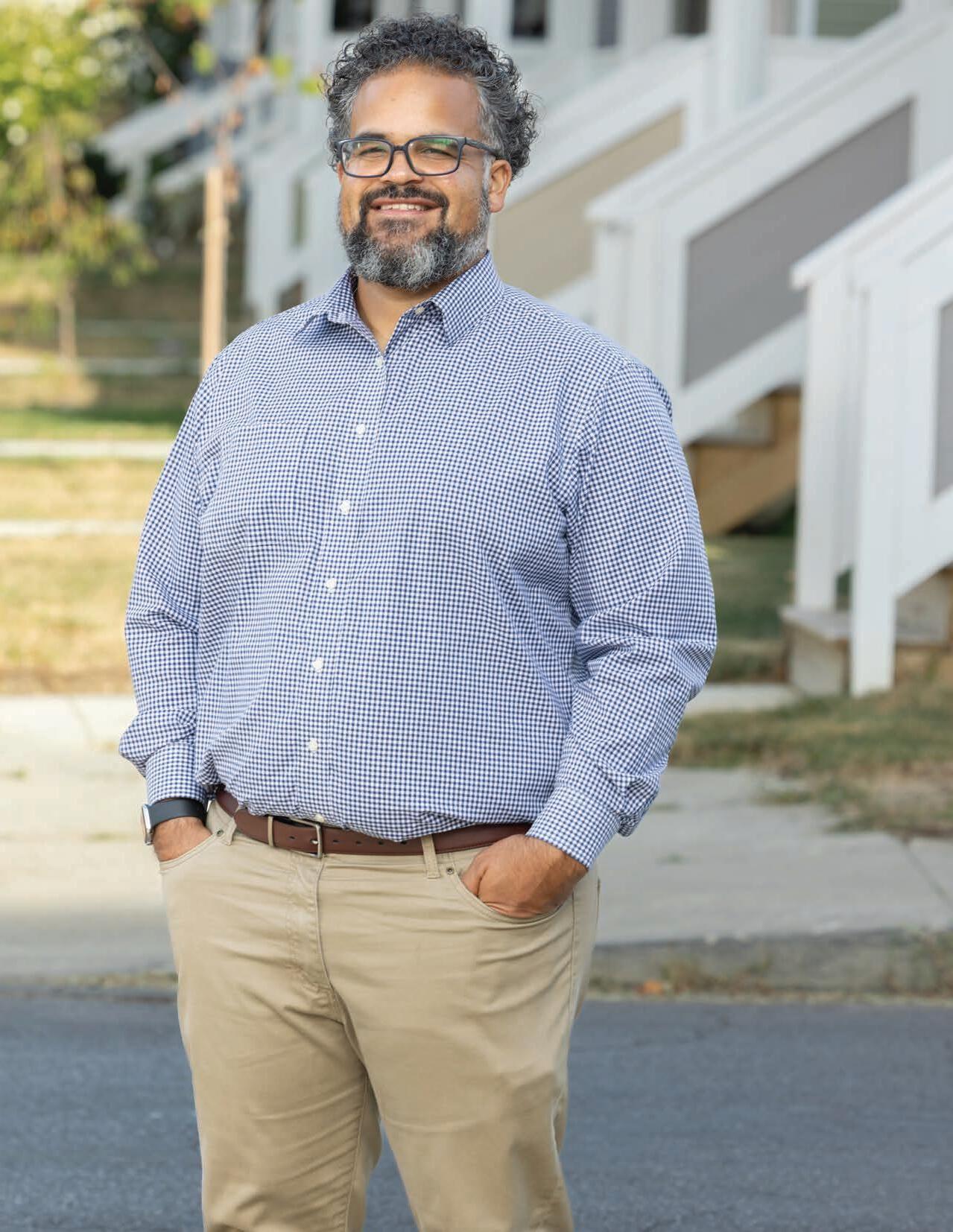
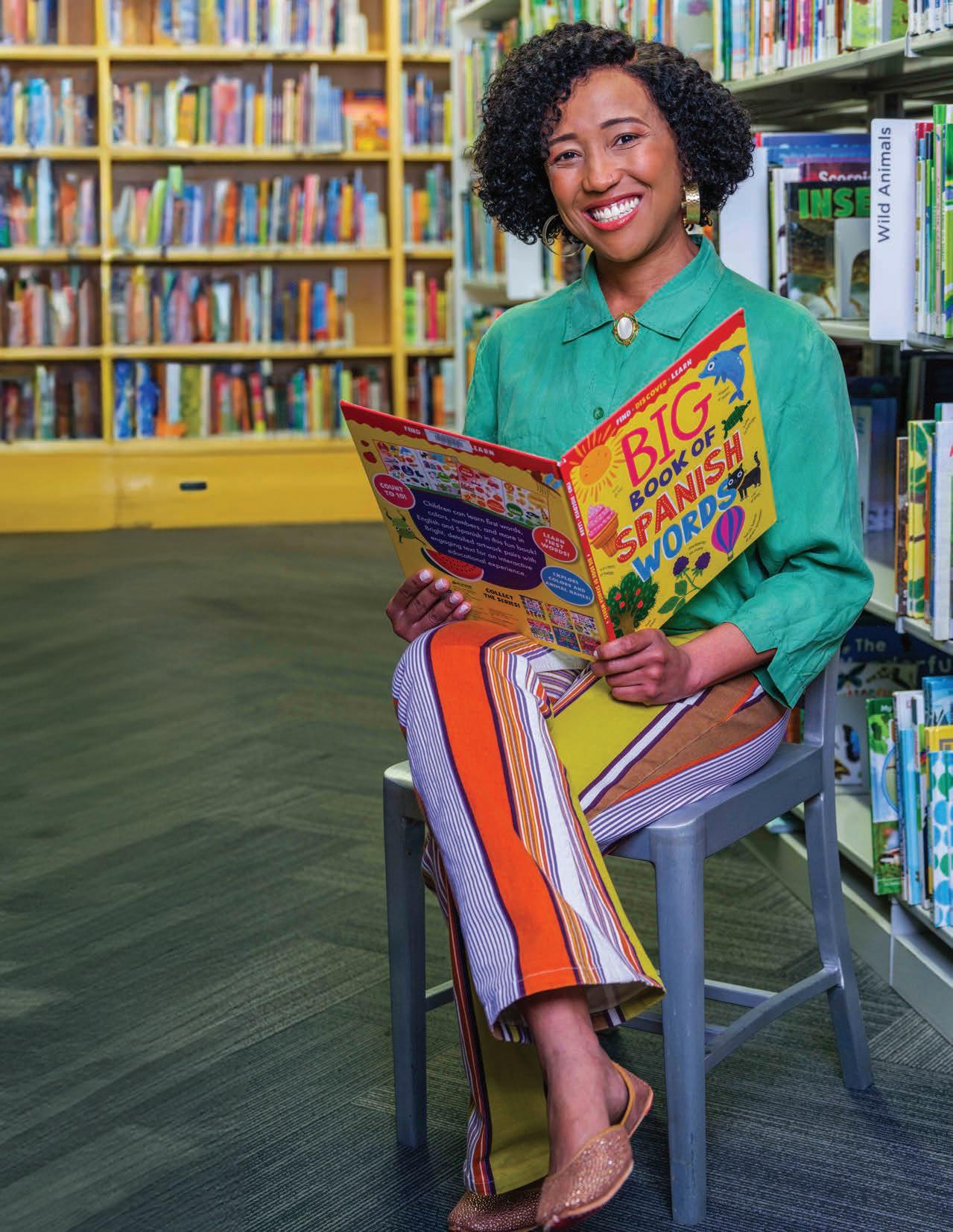
PHOTOGRAPHY

Racheal Alcock’s journey to becoming the Diversity, Equity, and Inclusion Manager at the Columbus Metropolitan Library (CML) is a testament to her belief in the power of connection and community. Growing up in Florida, she was surrounded by a long line of educators, which initially shaped her aspirations. However, as she approached college, Racheal realized that teaching was not her true calling. Eager for a fresh start, she turned to the internet to explore new opportunities, researching cost of living and culture until she found herself drawn to Columbus.
In 2011, Racheal took her first step into the library world by joining CML as a part-time Homework Help assistant at its Parsons Branch. There, she discovered the profound impact she could have on young people’s lives, providing support that extended beyond academics. “I enjoyed watching the kids light up when they grasped a new concept,” she recalls. Her passion for youth services propelled her through various roles at the Linden and Driving Park branches, culminating in her position as the Customer Services Manager at the Main Library’s Circulation division.
Despite her dedication and experience, Racheal faced a setback when she applied for the DEI Manager role and was not selected. Instead of discouragement, this moment ignited a fire within her. Racheal committed herself to deepening her professional development, gaining experience in diversity, equity, and inclusion initiatives. She had always felt a deep sense of belonging in libraries and was determined to ensure that others felt the same warmth and acceptance. When the position reopened, she reapplied and
was hired.
As the DEI Manager, Racheal now leads initiatives across CML’s 23 locations, working diligently to cultivate a supportive and inclusive environment for both employees and patrons. She chairs the DEI Committee and serves on the Racial Equity Steering Committee, championing change that reflects the diverse community she serves. Her motto, “You Can Do Hard Things,” resonates through her leadership style, inspiring those around her to embrace challenges.
Racheal envisions the library as a hub for transformation—a space where individuals can seek personal or professional growth without the pressure to buy or perform. “I want people to come to the library simply to be,” she shares. She dreams of a place where multiple generations can coexist, forming connections that bridge gaps and foster understanding.
Through her dedication and passion, Racheal Alcock is not only reshaping the library experience but also reinforcing its role as a vital community resource, committed to ensuring that everyone feels welcomed and valued.
Father, I decree and declare with YOU all things are possible! I trust Lord that every day I’ll be fruitful. With your blessings, I have the power to gain wealth wherever I go, wherever I live, in any environment, atmosphere and legislation, due to any codes, ordinances, regulations, or policies will adjust to accommodate my presence and purpose. Lord let me be in the perfect place for YOU to bless me. I decree and declare that my relationships will be mutually beneficial to all I encounter.
Father God let my body be strong and healthy. Allow my mind to be fortified and resolute. Let my emotions be sound and stable. Please let my faith become steadfast and unfaltering. I am an entrepreneur who provides jobs with hopes to even provide better jobs for those in my community. I decree that I’ll be a successful business owner.
So Dear Lord please strengthen my shoulders that I may carry the full weight of entrepreneurship with the anointing that You have released in me for this time and season. Let it neither crush me but rise me up with your supernatural powers!!
Father, I decree and declare that even as I release my name in the atmosphere, I decree and declare that I shall always have a good name. Please allow no negative stigma to ever be attached to my name. Let my name Dear Lord to be associated with greatness, integrity, nobility, righteousness, holiness, morality, ethical dealings, honesty, humility, grace, love, joy, peace, gentleness, meekness, faith, goodness, influence, affluence, fairness, balance, inspiration, reliability, and spiritual authenticity. Also, Dear Lord let my name be associated with loyalty, problem solving skills, creativity and maturity. Let it be associated with diligence, vision, insight, empathy, tenderness and originality. Let it be associated with self-control, wisdom, wealth, luxury, and intelligence. Also, let it be associated with prosperity, knowledge, and protected by spiritual warfare.
And finally, Dear Lord, let my name, words, products, and services always be associated with YOUR anointing, with kingdom wisdom, and kingdom undertaking being a campaigner for the empowerment of performing good deeds and works in my community. AMEN!

Courtesy: Rev. Cindy Trimm – Atlanta





